
































New Blonde herd in Scotland
PAGE 84

Teenager
PAGE 96


PAGE


THOUSANDS of farmers from all corners of Wales gathered outside the Senedd in Cardiff this week (February 28), to protest over the direction of agricultural policy, with the industry now facing its ‘most serious crisis’.
Farmers, union leaders and industry representatives gathered en masse outside the home of Welsh Government, calling for the Sustainable Farming Scheme (SFS) to be put on pause until the industry’s concerns were listened to and sufficient action had been taken.
Frustrations were also high over bovine TB and water pollution regulations.
Farmer Sharon Pritchard, one of the protest organisers, said the current farming policies in Wales were having an impact on all farmers and the future of the industry.
She said: “There is no clear vision for the future of Welsh agriculture.
“This protest has been headed up by a farmer, a representative of

Protestors gathered outside the Senedd this week.

the Farmers Union of Wales [FUW] and one of the NFU. We have come together to show unity.”
James Price, South Wales farmer, said dropping tools and heading to Cardiff for the day was ‘not as simple as it sounds’ with lambing underway.
He said: “For every farmer in Cardiff Bay, there will be family and work
force at home keeping the place going for the day. But if we do not take this time away, these schemes may leave little to work for.”
There were also warnings of the impact on the dairy supply chain, with dairy production worth almost £850 million to the Welsh economy.
NFU Cymru dairy board chair
Jonathan Wilkinson said if the Government commissioned SFS modelling was correct, it could see Wales producing more than 368m fewer litres of milk, putting livelihoods at risk.
He added becoming less productive would hit net zero ambitions as well as consumers.
Ian Rickman, president of the FUW, said: “FUW warned the Welsh Government not to awaken the sleeping Welsh dragon. The Welsh dragon is well and truly awake.”
First Minister Mark Drakeford was not in attendance as farmers gathered outside, instead heading to Brussels for his last visit ahead of stepping down from his role next month.
Carys Jones, Welsh dairy farmer, asked why farming should ‘shoulder the full burden of environmental legislation’.
She said: “Mr Drakeford, without farmers in your corner, your targets are nothing but numbers on a piece of paper.”


82
Farmers
NewBritishBlondeherd establishedinnorthofScotland
88
96
Scottish
Destroyed farm machinery brought to Ukraine/Poland
Nature-friendly
Lanark
98
98
99
100
Meet the teenage auctioneer at the heart of the Thirsk mart
With Dan Jones from North Wales and James and Isobel Wright from West Sussex
SPRING approaching has increased uncertainty around the threat of bluetongue when temperatures begin to rise, with concerns over the impact on supplies and shows and sales.
Chris Dodds, executive secretary at the Livestock Auctioneers Association, said farmers had been badly affected with outbreaks of Schmallenberg and bluetongue over the past year and he could see the industry facing supply shortages.
“If we see another insurgence, there could be shows, especially in the South East, where organisers could choose to cancel events or farmers simply do not take stock due to their own concerns about running shows and spreading.”
NationalParksbringno benefits,accordingto JohnThorley,chairofthe AssociationofIndependent MeatSuppliers
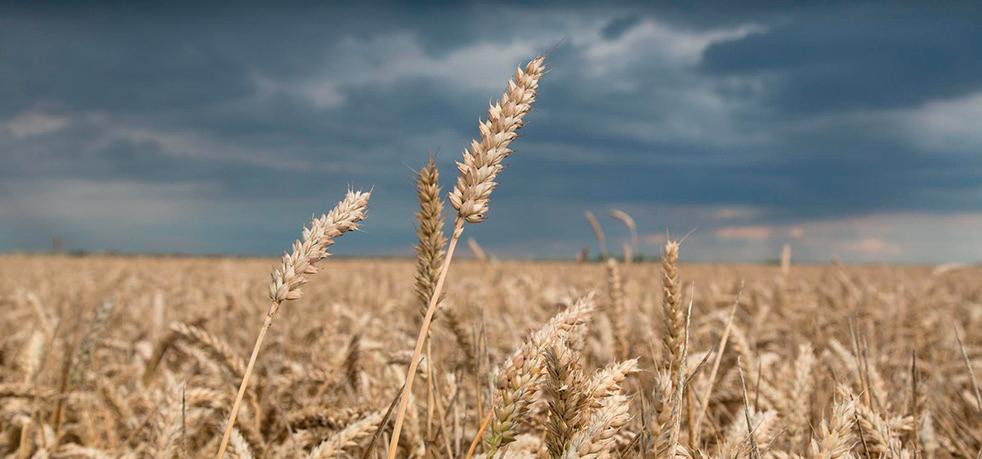
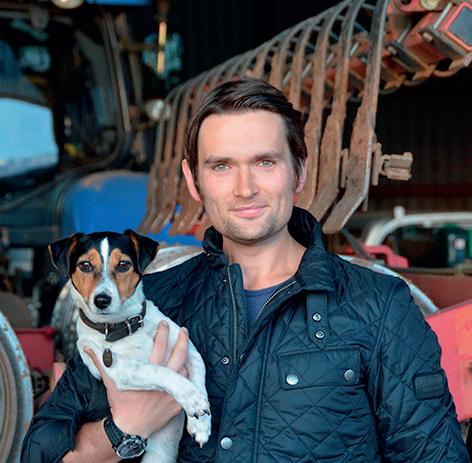
The Animal and Plant Health Agency (APHA) has installed 10km temporary control zones (TCZs) around affected farms to limit the spread of the virus since the first case had been identified in Canterbury on November 11.
However, the Government agency confirmed some TCZs in Kent and Norfolk had been lifted on February 19 as the UK had entered a ‘low vector period’ where midge activity was at its lowest. Speaking at the NFU Conference, Hugh Broom, NFU East live-
stock board chair, said: “All we can do is pray that the wind blows in the right direction until a vaccine comes.”
David Barton, NFU South livestock board chair, recently visited the Netherlands which has reported more than 5,000 cases of the virus.
He said: “We witnessed the impact it had on the farmer’s flock and how nasty this disease really is. There is no treatment or pain relief for the livestock affected.”
He urged the Government to work quickly on a vaccine.
Jeff Gibson, a mixed sheep farmer from Canterbury, was critical of TCZ restrictions on the movement of cattle after the virus had been detected in a single sheep earlier this year.
“Defra has taken the decision to close everything down and to blood test everything, which has been an absolute disaster for farmers who cannot move their livestock,” he said.
Chief Veterinary Officer Christine Middlemiss said despite no sign of a vaccine at present, APHA had ‘robust’ disease surveillance procedures in place to protect farmers and livestock.
Aled Edwards, head of field delivery for England at APHA, said the agency would continue to work with farmers and address any concerns promptly.
APHA confirmed it would continue to monitor the situation and re-evaluate should cases begin to rise.
INDUSTRY groups have urged the Chancellor to deliver stability for food producers ahead of the Spring Budget, with calls for a permanent VAT reduction to boost rural tourism.
In a letter to the Chancellor, the NFU has called for support which increases the ability of farm businesses to deal with volatility and build stability, to ensure the sector can invest and continue to deliver for the country’s food security, environmental and productivity needs.
The letter also highlighted the ‘opportunity’ for the Treasury to unlock and incentivise green investment in the farming industry to help meet net zero targets, while addressing high production costs, the impact of flooding and providing long-term certainty for domestic food production.
NFU president Tom Bradshaw highlighted the ‘challenging economic backdrop’, adding businesses needed to be profitable to invest in the future.
“As the UK’s largest manufacturing sector, worth more than £120 billion to the nation’s economy, the Chancellor has an opportunity to take actions that will boost business confidence in the UK’s food and farming industry,” he said.
CLA demands included a permanent reduction in VAT to 12.5 per cent for accommodation and attractions, highlighting rural tourism accounts for over 70 per cent of domestic tourism. It said VAT rates needed to be internationally competitive to reach its full potential.
WELSH Labour Ministers have attempted to reassure farmers they were listening ahead of a major demonstration at the Senedd this week.
With political uncertainty ahead of Mark Drakeford stepping down as First Minister and it being unknown what direction his replacement will take, the consultation on the Sustainable Farming Scheme (SFS) is due to close on March 7.
In a joint statement released a day before the protest (February 27), the outgoing First Minister and Rural Affairs Minister Lesley Griffiths made a series of announcements, many which have been heard before, in an attempt to reassure farmers they were ‘continuing to listen’.
In recognition of the upset caused by on-farm slaughter as part of bovine TB policy, Welsh Ministers announced they were looking to
address it as ‘matter of urgency’.
With Nitrate Vulnerable Zone regulations, they announced an additional £20 million to help farmers comply, but it was not made clear whether this was new money or from the existing farming budget.
Mr Drakeford and Ms Griffiths said they would also look at appointing an independent chair to oversee the process, while putting in place a ‘statutory review’ to assess the effectiveness of the overall water pollution regulations.
On SFS, there was an announcement of a series of ‘potential next steps’ including getting maximum value from the data gathered; ensuring actions were improving economic resilience on farm including the woodland and habitat requirements; to carry out an economic analysis and ensure farm payments were distributed ‘fairly and were accessible to all’.
In the written statement, they said the incoming First Minister would ‘carefully review the results of the consultation’ and consider

‘in detail, the pace’ of SFS implementation. Welsh Conservative’s Rural Affairs Minister, Samuel Kurtz, said ‘farmers deserved better’, than kicking the ‘can down the road’.
Plaid Cymru has come under fire in recent weeks, for claiming to be a friend to farmers, but failing to sufficiently lobby for rural Wales as part of their co-operation agreement with Welsh Labour.
Plaid Cymru leader Rhun ap Iorwerth denied such claims, adding they were trying to get the ‘best deal for farming and the environment’, adding his party ‘will not rest until there is recognition for change.’
He also called for movement from the current First Minister, adding even a few weeks was ‘too long to wait’.
David TC Davies, the Secretary of State for Wales, said it was ‘absolutely ridiculous’ that Welsh Labour was asking farmers to
‘forfeit’ 20 per cent of land to tree planting and habitats, adding he had requested an ‘urgent meeting’; with Ms Griffiths, but had not yet heard back.
Farming part of the ‘lifeblood of Wales’
In an online blog for Farmers Guardian, Mr Drakeford said they were continuing to ‘listen carefully’ to the concerns from farmers and unions, including about their policies.
READ MORE
To see the full blog, visit farmersguardian.com/blogs

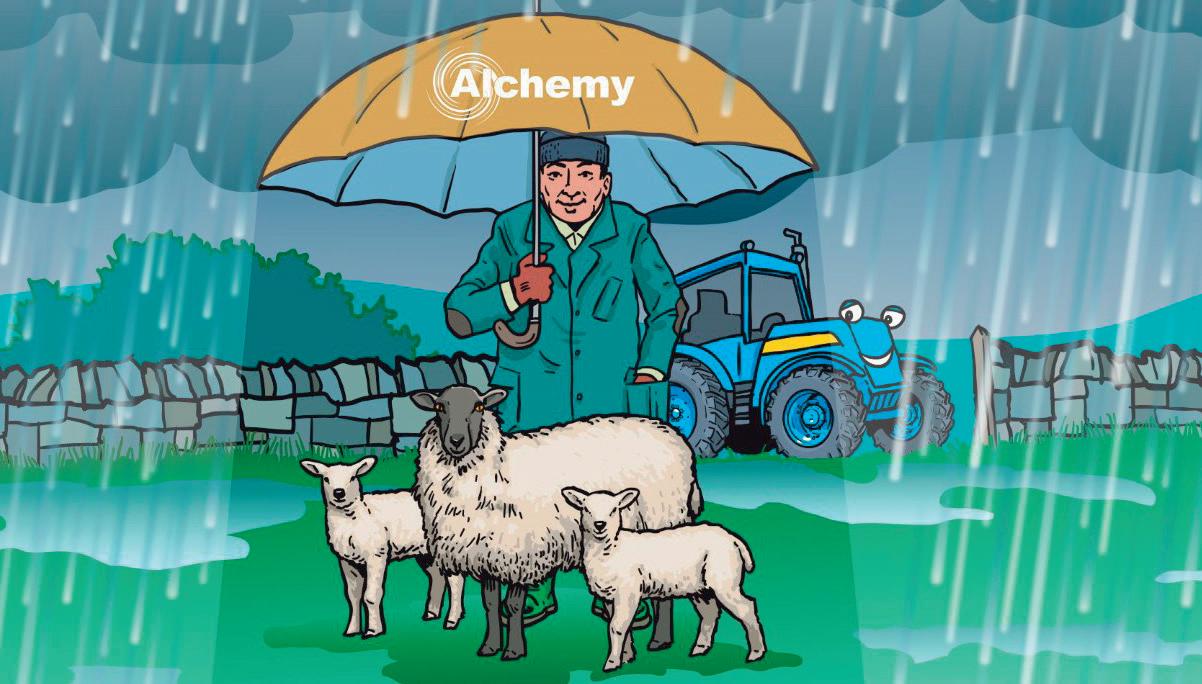

Farmers Guardian, Unit 4, Fulwood Business Park, Caxton Road, Fulwood, Preston, Lancashire, PR2 9NZ
Editor Olivia Midgley, 07787 240 750 olivia.midgley@agriconnect.com
Head of News and Business
Alex Black, 01772 799 409 alex.black@agriconnect.com
Chief Reporter
Rachael Brown, 07974 039 778 rachael.brown@agriconnect.com
News and Business Reporters
Jane Thynne
jane.thynne@agriconnect.com
Chris Brayford, 07773 110 733 chris.brayford@agriconnect.com
Business Reporter
Cedric Porter cedric.porter@agriconnect.com
Arable Technical Specialist
Ash Ellwood, 07786 190 188 ashleigh.ellwood@agriconnect.com
Head of Machinery and Farm Technology
Toby Whatley, 07583 054 831 toby.whatley@agriconnect.com
Machinery Reporter
James Huyton, 07787 242 185 james.huyton@agriconnect.com
Head of Livestock
Katie Jones, 07786 856 439 katie.jones@agriconnect.com
Head of Livestock Sales
Angela Calvert, 07768 796 492 angela.calvert@agriconnect.com
Livestock Specialists
Ellie Layton, 07814 997 407 ellie.layton@agriconnect.com
Katie Fallon, 07815 003 227 katie.fallon@agriconnect.com
Online Editor and Features Editor
Emily Ashworth, 01772 799 446 emily.ashworth@agriconnect.com
Head of Creative Services
Gillian Green, 01772 799 417 gillian.green@agriconnect.com
Picture Editor
Marcello Garbagnoli, 01772 799 445 marcello.garbagnoli@agriconnect.com
Sales Director Stephanie Ryder, 07917 271 987 Stephanie.ryder@agriconnect.com
Group Publisher Ben Briggs ben.briggs@agriconnect.com
Circulation Subscription hotline 0330 333 0056 help@subscribe.farmers-guardian.com
Newstrade enquiries 01772 799 434
UK print subscriptions £189; Europe: £226.80; RoW: £283.50.
FG digital subscriptions: £109
News trade distribution
Seymour Distribution Ltd, 2 East Poultry Avenue, London, EC1A 9PT.
PublishedbyAgriconnect


As shocking figures are revealed on livestock attacks by dogs, Chris Brayford takes a look at the impact on farmers.
THE cost of livestock worrying from dog attacks has hit farmers with a £2.4 million bill for 2023, according to NFU Mutual.
In a survey which featured 1,116 dog owners, it was revealed there had been a 30 per cent rise in livestock attacks which led to either injuries or deaths between 2022 and 2023.
Livestock attacks in Scotland had reached an estimated cost of £123,000 to farmers in 2023, £883,000 in Wales, and £147,000 in Northern Ireland.
In England, the South West was the worst-hit region by cost, with dog attacks on livestock costing an estimated £359,000.
NFU Mutual revealed more than half, 54 per cent, said they did not need to take active measures to prevent their dog from chasing.
Scottish Conservative Shadow Rural Affairs Secretary Rachael Hamilton said the figures were ‘deeply alarming’ to farmers and the wider rural community.
Martin Malone, NFU Mutual Scotland manager, said the attacks on livestock had cropped up at an alarming time for farmers during lambing season when pregnant ewes and newborn lambs were ‘most vulnerable’.
“Farmers are living in fear of repeat attacks, which causes horrific and needless suffering to livestock and can traumatise all involved dealing with the aftermath,” Mr Malone added.
“All dogs are capable of chasing, attacking and killing farm animals, regardless of breed, size or temperament.”
NFU Scotland policy adviser for rural business, Rhianna Montgomery, said she had been disappointed to see the cost of livestock worrying incidents to Scottish farmers and crofters.
“Dog owners need to be aware of the pain and suffering their pet has the potential to inflict when they attack livestock, as well as being aware of the repercussions,” she added.
“We continue to encourage farmers to report all incidents of livestock being attacked by dogs to ensure that our hard-won changes to legislation hold all irresponsible dog owners to account.”
Inspector Jordan Low, of Police Scotland, said the force continues to
More than half of dog owners said they did not need to take active measures to prevent their dog from chasing livestock, according to a recent survey.

see the damage and distress of livestock worrying incidents to farm businesses.
Police Scotland added failure to comply with the law could result in a fine of up to £40,000 or a 12-month prison sentence.
Banffshire farmer Pauline Mitchell, who runs 400 Texel-cross ewes and 100 suckler cows on a 566-hectare holding, said she still has to contend with the consequences of sheep being injured and killed by ‘out-of-control’ dogs.
“One incident included an in-lamb Texel-cross ewe which had been found dead by a field gate with injuries to its throat,” she added.
“All the sheep were crowded in a huddle in a corner of the field, so it was obvious they had been chased by a dog.
“We have put in double fencing and grown thick hedges to separate our livestock from walkers but owners still encourage their dogs to get into the fields to run around while they walk on the fenced paths. It is very frustrating.
“Dog owners cannot seem to grasp that all dogs have an instinct to attack grazing animals and even chasing them can cause serious injuries.”
Northern Ireland farmer David Scott, who has farmed all his life on 16ha of land in Dungannon, said ‘repeated dog attacks’ – which resulted

in the deaths of 54 lambs – had made it ‘difficult’ for him to carry on sheep farming.
Mr Scott said the first attack took place in December 2021 when a large dog killed 18 lambs while a further 15 had drowned.
Farming Minister Mark Spencer said livestock worrying had a ‘devastating impact’ on farmers which causes ‘financial and emotional distress’.
Defra said the introduction of the Dogs (Protection of Livestock) (Amendment) Bill – sponsored by former Defra Secretary Therese Coffey which is currently progressing through Parliament – hoped to provide police with greater powers to investigate incidents through sampling of livestock and dogs.

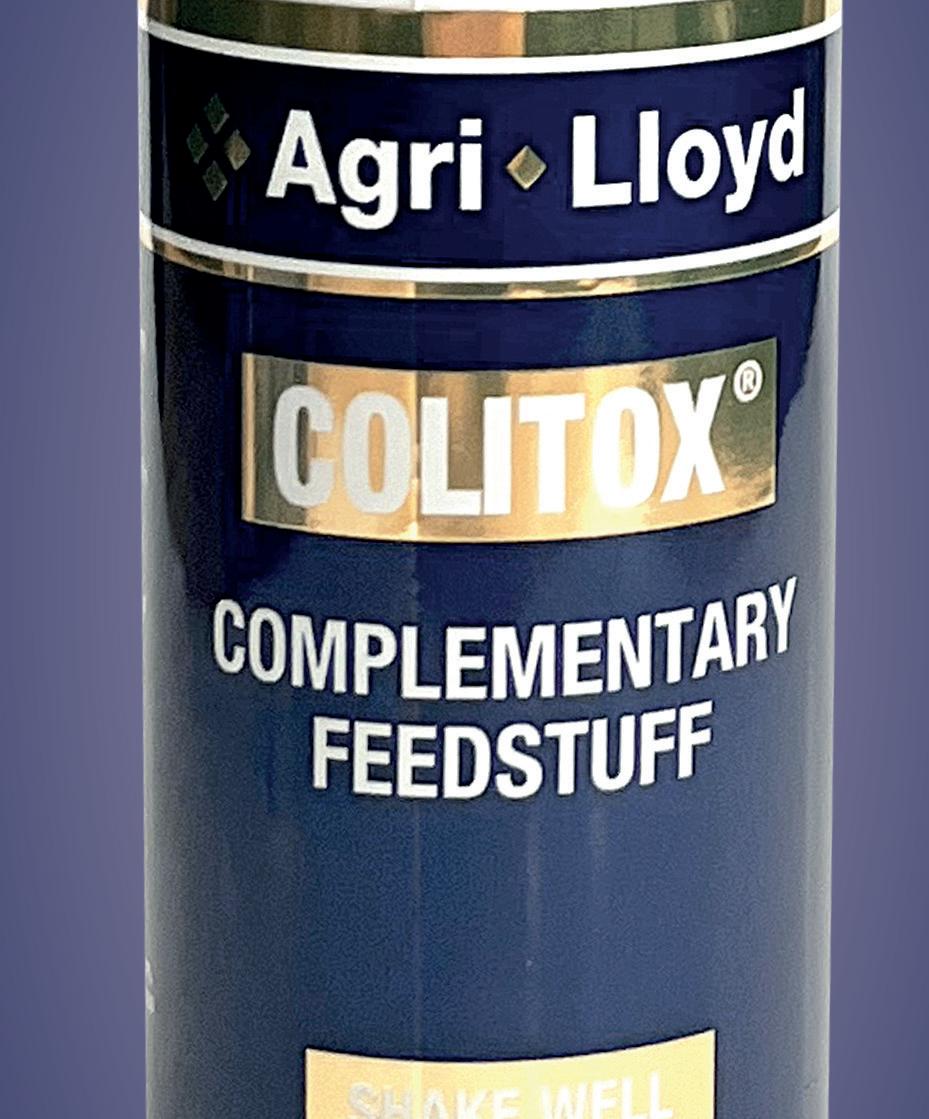







rTrade agreements under scrutiny
By Jane ThynnePOULTRY groups have questioned the Government’s decision to extend its tariff-free trade agreement with Ukraine after figures revealed poultrymeat imports have risen by 90 per cent.
The call follows a UK Government announcement that it would prolong current trade terms with Ukraine until 2029, offering it a five-year extension as opposed to the expected two. However, poultry and eggs are two exceptions, only having a two-year extension.
While the groups have all pledged their support to the European nation following the invasion by Russia in 2022, farmers have also urged the Government to guarantee domestic production will not be curbed as a result.
According to NFU figures, since the UK granted its temporary tariff suspensions in May 2022, imports of Ukrainian poultrymeat to the UK increased by 90 per cent year-on-year in the first 11 months of 2023. It said the levels exceeded the quotas available under the UK-Ukraine free trade agreement (FTA) and warranted more effective Government monitoring.
NFU president Tom Bradshaw said it was important policymakers found
Imports of Ukrainian poultrymeat to the UK increased by 90 per cent year-onyear in the first 11 months of 2023.


a way to support both the farmers of Ukraine and the UK, with Ukraine remaining one of the world’s largest chickenmeat exporters.
“We urge the Government to continue to monitor the effects of this decision closely and, if it does become necessary, to make use of available bilateral safeguards.”
A spokesperson for the British Poultry Council welcomed the twoyear extension as opposed to five, adding it would continue to work with Government on monitoring trade flows.
It came as MPs were told this week
that future trade deals must consider food and production from the outset to avoid exposing consumers and farmers to a raft of lower standards.
Speaking to the Environment, Food and Rural Affairs Committee evidence session looking into UK FTAs and standards, Orla Delargy, head of public affairs at Sustain, said ‘subpar’ FTAs such as the one signed with Australia, undermined the health of the nation and the work of domestic farmers.
FARM assurance body Red Tractor has been recognised as a leader in farm data governance, just days after findings from an independent review investigating governance at the organisation were published.
It seems as though Red Tractor is intent on winding people up with the use of the word ‘governance’
PHIL STOCKER
Farm Data Principles (FDP), previously the British Farm Data Council, has awarded Red Tractor its Certificate of Registration which independently verifies that Red Tractor operates to the highest standards of data security, privacy, and integrity.
According to Red Tractor, FDP is a ‘respected authority in the agricultural sector’, which seeks to promote and verify best practices in data handling and which involves a rigorous assessment of the data handler’s policies, procedures and systems.
Red Tractor is one of only four organisations to be granted a full FDP certificate to date.
The body’s chief executive Jim Moseley said he was ‘delighted’ to have received the ‘endorsement’.
The assurance body has been under
fire over recent months following accusations it tried to ‘push through’ its Greener Farms Commitment module without proper consultation with farmers.
Phil Stocker, chief executive of the National Sheep Association, said while the FDP assurance was to be applauded, he warned it related solely to the way data was handled and was in no way a validation of Red Tractor’s overall authority.
Mr Stocker said: “It seems as though Red Tractor is intent on winding people up with the use of the word ‘governance’... this has nothing to do with the governance of the running of the organisation, where a number of unsatisfactory points were recently highlighted by Campbell Tickell.”
He added good data management was crucial and the certification had to be welcomed.
She said conflicts had regularly arisen between departments which highlighted the ‘lack of coherence’ in the Government’s approach.
She added ‘even the Australians were astounded’ at the deal.
Efra chair Sir Robert Goodwill highlighted vast quantities of meat had not yet arrived, suggesting it could signify the UK market was too small.
However, Ms Delargy disagreed, adding the country would not have been ‘so pleased’ if they did not intend to sell food here.
AHDB has won the Marketing Campaign of the Year award from the Trade Association Forum for its Eat Like a Lioness campaign.
The campaign, which featured former England footballer Anita Asante, launched in July 2023, and aimed to inspire young female athletes to reach their potential by including meat and dairy in their diet.
Ms Asante was transformed into an actual lioness for the images which accompanied the campaign, which highlighted the nutritional benefits of red meat and dairy including iron and vitamin B12.
Eat like a Lioness featured on BBC, TalkSport, and Sky Sports News and generated 3.5 million impressions on social media.

rCampaign founder denies political agenda
By Jane ThynneTHE man behind the No Farmers, No Food (NFNF) campaign has said the organisation had not been launched to incite European-style farmer protest nor was it designed to defend ‘nefarious’ individuals who may latch on to the logo.
Industry figures have raised concerns the campaign was associated with figures pushing conspiracy theories and those with far-right agendas, and anti-net zero policies.
The campaign has attracted considerable interest online from both the farming community and the general public, but those raising concerns about the alleged associations have found themselves the subject of online abuse.
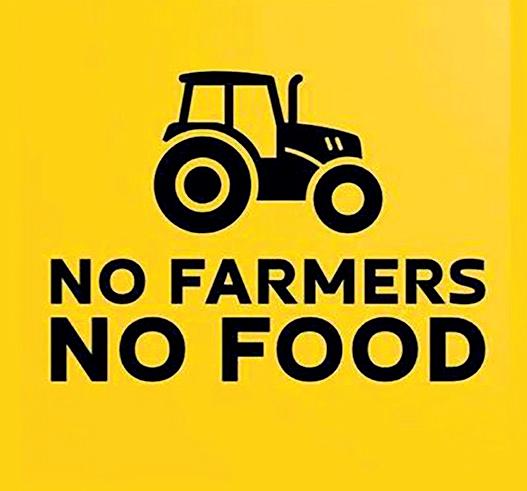
We do not want anything nefarious to spring up around the campaign. Our job is purely to promote the valid concerns of the farmersJAMES MELVILLE
Communications specialist James Melville told Farmers Guardian the new campaign had set out its core missions to address unfairness in the supply chain, mental health, bovine TB and a growing green agenda and was borne out of his belief the time was right for issues facing the farming sector to be given a larger platform.
Mr Melville, who grew up on a mixed farm in Fife, said the campaign planned to continue for the foreseeable future and would be ‘scaled up’ in order to keep key issues in the spotlight.
The NFNF campaign was
A PLANT-based food campaign group has launched a last-ditch attempt to stop new rules which would prevent vegan brands using ‘dairy descriptors’ in their names.
The Plant-based Food Alliance UK (PbFA) has appealed directly to Defra Secretary Steve Barclay asking him to step-in ahead of the imminent change which has been devised by trading standards officers to make labelling clearer for consumers.
Should it become law, it would mean products such as ‘I Can’t Believe It’s Not Butter’ and Nurishh Camembert Flavour Vegan Cheese,
would have to adopt new branding.
Speaking to The Guardian, PbFA chief executive Marisa Heath said: “At the time when we should be encouraging consumers to make more sustainable choices… this is a bad move.”
However, Rachel Risden, a dairy farmer from Brampford Speke, in Devon, welcomed the policy change.
“It is about time. We could do with an end to all this misleading information.
“The products are named like that to suggest they taste the same when they do not,” she said.

launched in January in collaboration with more than 20 UK farmers including Steve Evans, Ioan Humphreys, Andrew Ward, James Telfer and Anna Longthorp.
Its recognisable yellow logo can now also be seen fronting a raft of personal farmer profiles as well as groups such as the Farmers Movement UK and the Lancashire Farmers Movement, which was calling for protests in Preston on March 10.
However, Mr Melville insisted NFNF would support only ‘peaceful protest’.
He said: “We do not want anything nefarious to spring up around the campaign. Our job is purely to promote the valid concerns of the farmers and that is it.”
Recent reports in the national press suggested the campaign was
merely providing an outlet for Mr Melville’s personal political views on issues such as climate change and Covid-19.
“Every single thing we put out as a message or on the feed is agreed with by this core group of farmers,” he said.
He added personal opinions and biases were ‘not part of this’.
Mr Melville also said while the group was committed to sharing the views of real farmers, it was in no way a threat to existing farming bodies.
“We are not here to dismantle the NFU – it does good work and we would like to work with the NFU on these campaigns as we share the same interests,” he said, adding that they wanted to bring people together.
ALTHOUGH the proposed Sustainable Farming Scheme (SFS) is at the fore of Welsh farmers’ minds, the Farmers’ Union of Wales (FUW) is reminding members that the window for the Single Application Form (SAF) opens on March 4.
The union said it has county staff on-hand to assist with any application which now has to be done online.
FUW special policy adviser
Rebecca Voyle said: “The SAF completion process is probably the single most important form completion exercise being carried out by Welsh farmers since 2004, and the financial repercussions of errors on the forms are severe.
“I encourage our members and first-time form fillers to contact their local office as soon as possible to book an appointment if they need help in filling out the form,” she added.
















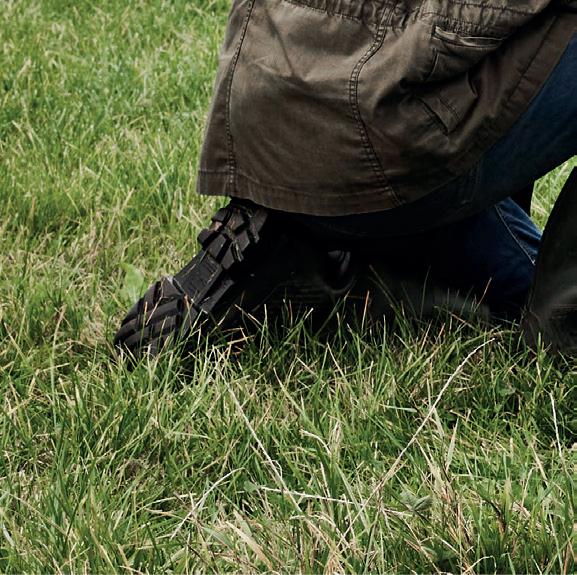















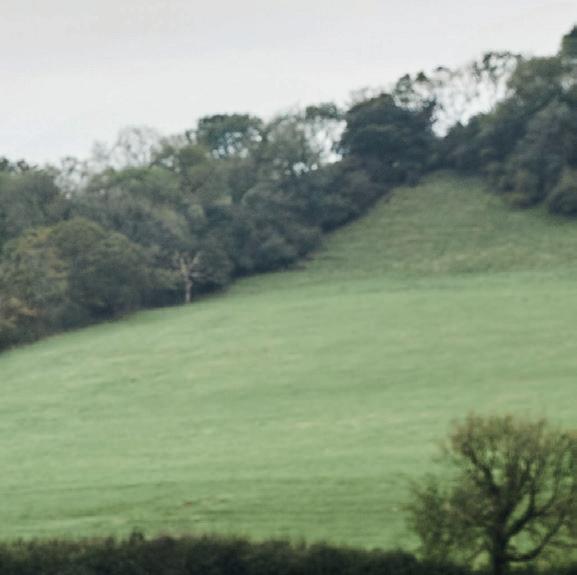








And finally...
Our new show Low Carbon Agriculture takes place at the NAEC in Stoneleigh next week March 6-7). Register for your free ticket by visiting: lowcarbonagricultureshow.co.uk
AS the final countdown begins on the Welsh Government’s Sustainable Farming Scheme (SFS) consultation, the strength of feeling – of uncertainty and despair – about the direction of the country’s farming policy has ramped up.
Thousands of farmers and industry professionals, representing several generations of farming families, descended on the Senedd on Wednesday in a show of unity to highlight the detrimental impacts of three key policy areas.
With a focus on bovine TB, regulation around Nitrate Vulnerable Zones and tree planting targets, the feelings of frustration among demonstrators was palpable. As was a sense of Welsh pride, and passion.
In a rousing speech to the crowds which had gathered at the door of Wales’ democracy, Farmers’ Union of Wales president Ian Rickman said the Welsh Government had awoken the Welsh dragon – stoking the fire of people who now fear their heritage, as well as their future, is under threat.
Under the current proposals, the Welsh Government’s own impact assessment has predicted a £200 million hit to farm income and around 11 per cent less livestock in Wales. This undertone of destocking throughout the SFS will not only impact farming


but the ancillary industries and jobs both in rural and urban areas that rely on it.
Not to mention the risk to food security, which is perhaps one of the most pertinent, with UK production already down across the board and a global population expected to increase by two billion in the next 30 years.
Welsh Government modelling says the policies as they stand will have a devastating effect on the dairy sector leading to a 368m-litre drop in milk, the equivalent to taking 648m pints of milk off the shelves around the world.
And as the clock ticks down to the end of the SFS consultation, the very real impact is already laid bare on farms across Wales.
Mental health charity The DPJ Foundation told us calls to their helpline have spiked, marking a 72 per cent increase in referrals compared to this time last year.
What is clear is that in the middle of all this are families. Farming families with lives, livelihoods and generations of history at stake.
Welsh Government has said it is listening and there is still time to have your say – the Sustainable Farming Scheme consultation is open until March 7, visit: gov. wales/sustainable-farming-scheme-consultation
‘Farmers are still facing some
Background: Whatattractedmetoa careerinfarmingwasmyloveand passionforthecountryside.
Assomeonewhodidnotcomefrom afarmingbackground,thejoyand memoriesImadelivinginrural Nottinghamshire,nearCropwell Bishop,haveservedavaluable purposeininspiringmetojointhe farmingcommunity.
WhatIlovemostaboutfarmingisthe connectionfarmershavetoourfood systemandthecountryside.
Farmersaresoimportantinourlives andweshouldnevertakethemfor granted.
Istartedworkingonfarmsinthe surroundingareaaged14,becauseI lovedanimalsandworkingwiththem.
Witnessingfirst-handthecareand attentionfarmersgivetotheirlivestock wasreallyinspiringtoseeandwas somethingIcontinuedinmywayof
working.Iwastheformerchairat CropwellYoungFarmersClubwhich wasanamazingexperience.
Theindustryshouldbedoingeven moretopromotetheclubstoyoung farmers,becausetheyofferawiderangeofbenefitsintermsofthesocial andeducationalaspect.
Education: Agricultureplayedakey partinmyeducationtooatcollege anduniversity.
Icouldnotwaittoattendthe UniversityofNottinghamandstudy agriculture.
TheexperiencesIhaddrewmevery closetothesciencebehindfarmingand howitcanbepivotalindevelopingand enhancingtheindustryevenfurther.
AfterIfinishedstudying,Iwasstill workingonfarms,butfounditvery difficultandchallengingduetothe Covid-19restrictionsatthetime.
Ididsomesurveyingforaperiod

Jessica Rippon
whichwasreallyenlightening,butthere wasstillasenseIhadnotfoundthe rightcareerforme.
Really,Ifellintofarmconsultancy whereIhelpfarmerswithgrant schemesincludingtheSustainable FarmingIncentiveandCountryside Stewardship.
Idonotbelievefarmersshouldhave tofacetheweightandcostofchanging theirfarmstoimplementthese schemesintotheirbusinesses.
Itryandprovidepracticaladviceto
ensurefarmersaremakingmoneyby becomingmoresustainablewithout theheftycosts.
Challenges: Farmersarestillfacing somehugechallengesatthemoment, includingmentalhealth.
Despiteallthefantasticworkthe industryisdoing,thereisstillastigma associatedwithmentalhealthinthe industryduetothelimitedsocialaspect ofthejobandthelonghours.
Withtheworryaroundfinancial support,farmersneedtokeepbeing supportedbytheGovernmentin growingfood.
Foodproductionneedstobe recognisedasanationalassetto thiscountry.
MORE INFORMATION
If you would like to be featured, email chris.brayford@agriconnect.com
IN recent weeks a new farming campaign has started, promising to raise awareness of the issues which beset farmers in the UK.
On the face of it, this is a laudable aim and something that (as a farmer myself, involved heavily in the promotion of the farming industry) I would support.
However, the ‘No Farmers, No Food’ campaign is not quite what it seems.
The name is taken from the slogans used in the recent European farmer protests which have been hijacked by various far right political parties.
That in itself is a worrying red flag. Even more worrying is that the campaign was founded by James Melville.
This individual is best known for promoting various anti-vaccine conspiracy theories during the Covid-19 pandemic, and is also known to believe that climate change is a scam.
He claims, in various press releases, that the campaign is apolitical and has no agenda other than to support farmers.
And yet, the most vocal supporters of the campaign include Neil Oliver from GBNews and MP Andrew Bridgen – both best known for pushing conspiracy theories and denying climate change.
This campaign will, in time, become a vehicle to push fringe political views and anti-scientific theories, and will severely damage farming and those associated with it.
It is sad that the legitimate desperations of farmers are hijacked by such an ‘astroturf campaign’, and I would urge anyone wanting to support
Contact us
■ IF you would like to send us a letter for consideration, please note that our email address has now changed to fgeditorial@agriconnect.com


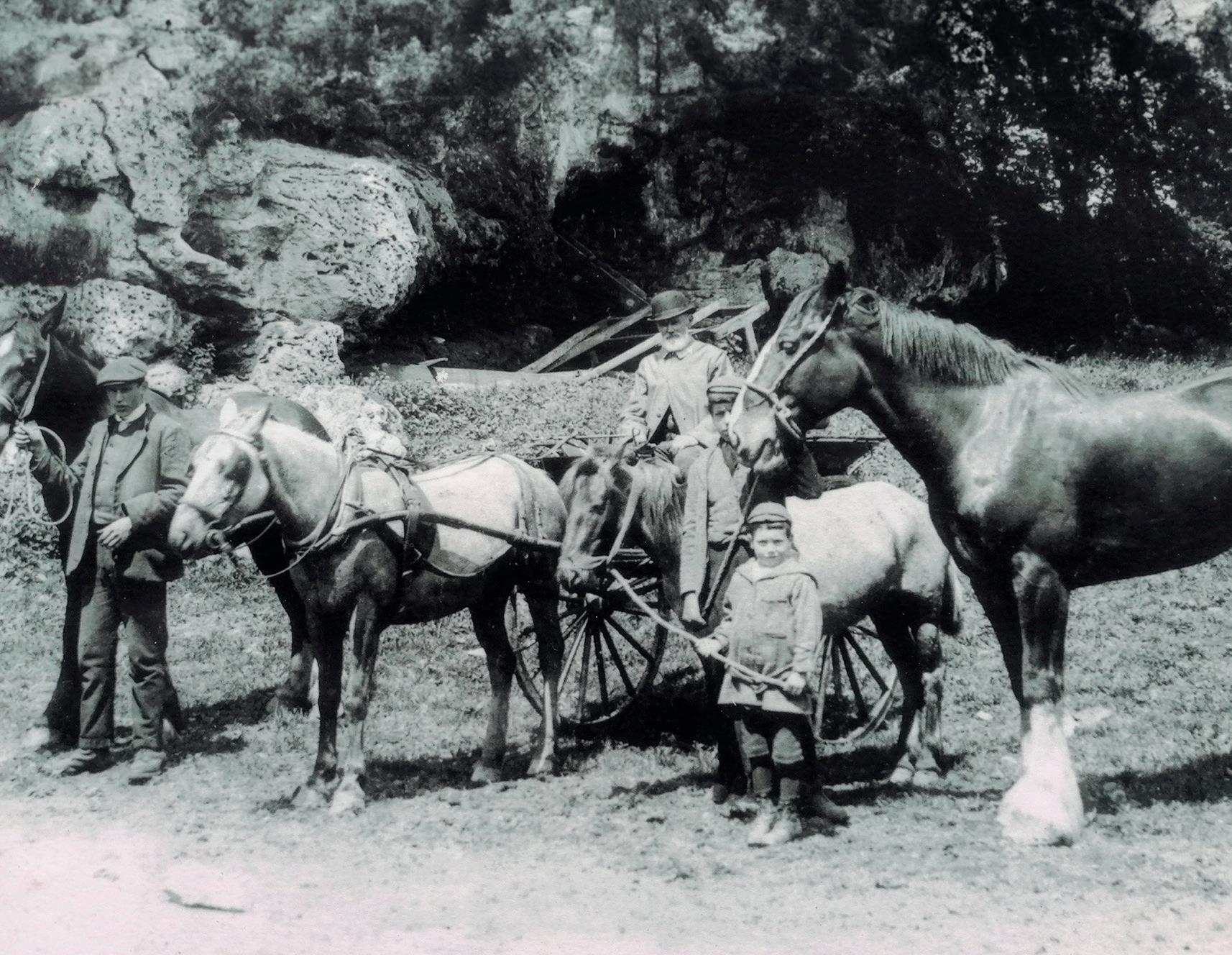
If you have a classic picture you would like to share, please email it to marcello.garbagnoli@agriconnect.com
farming to find, join and support one of the credible campaign groups instead, and actually do some good.
Graham Bottley, Via email.
IT is a worrying time for farmers like us who want to farm and produce food. With subsidy changes coming into action, what will the future of farming in Britain look like?
We have felt the direct impact of these changes, and I share this as a single example of how these changes
are going to be felt. We had agreed with a neighbour to take 50 per cent of his maize to feed to our cows on a new farm he was going to be taking on from a non-farming landowner.
But now that ‘farmer’ is going to put the entire farm into wildflowers and earn a lot of subsidy cash for doing so.
So, our neighbour and us lose out on fodder for our cows who produce highly nutritious food for us all to eat.
This is one farm, but how many times is this going to be happening?
How many high-quality fields are no longer going to be producing food?
The reality is, that farmer is going to make more money from those wildflowers from government subsidy than he would producing food.
It will certainly be an easier life
for them. Farming without the stress and risk – that would be nice for us all, would it not? But if we all do that, then who is going to be producing the food?
I fear the subsidy changes are very short-sighted. And what defines a farm?
We want to be producing food for a fair price, but some landowners who have no interest in farming to produce food can claim a lot of subsidy cash by planting things like wildflowers.
Is this right? I am not sure the right balance is being struck and I really do worry about what our futures hold, as no doubt more and more farms will turn away from food production.
Stefania Bennett, Via email.

site, for example, the type of device you are using, your operating system, IP address, uniform resource locator (URL), clickstream and length of visit. How we use the information you provide: We will use your personal information: • to administer the Competitions, on the basis that the use of your personal data for this purpose will be necessary to enter you into the competitions and, if you are successful, contact you to notify you of your prize; and, • if you are new to Farmers Guardian and where you have agreed to this, to provide you with news and updates from time to time about our services; and, if at any point in the future you do not wish to receive any news and updates from us or from, you can unsubscribe from our marketing list at any time by following the steps below. To unsubscribe from any communications using the link on the email we send you or by emailing us at dataprotection@farmersguardian.com. We will not use your information for any purposes except those listed in this policy without letting you know and getting your permission, if necessary, first. Who do we share your information with? We will not disclose your information to any third parties without your consent, except where: • it is necessary to enable any of our staff, employees, agents, contractors, suppliers or commercial partners to provide a service to us or to perform a function on our behalf; • we have a legal obligation to disclose your information (for example, if a court orders us to); or • there is a sale or purchase of any business assets, or where Farmers Guardian or any of its group companies are being acquired by a third party. Where we use third parties as described above to process your personal information, we will ensure that they have adequate security measures in place to safeguard your personal information. For how long do we keep your personal information? We keep your personal information for 36 months for the purposes for which it was collected or for any period for which we are required to keep personal information to comply with our legal and regulatory requirements, or until you ask us to delete your personal information. Your rights: You have a number of rights in relation to your personal information. These include the right to: • find out how we process your personal information; • request that your personal information is corrected if you believe it is incorrect or inaccurate; • obtain restriction on our, or object to, processing of your personal information; • ask us not to process your personal information for our own marketing purposes; and • obtain a copy of your personal information which we hold about you. We will take steps to verify your identity before responding to your request and will respond as soon as possible and in any event within a month. If you would like to exercise any of your rights or find out more, please email us at dataprotection@farmersguardian. com. Complaints: If you have any complaints about the way we use your personal information please contact us at dataprotection@farmersguardian.com and we will try to resolve the issue. If we cannot resolve any issue, you have the right to complain to the data protection authority in your country (the Information Commissioner in the UK). If you need more information about how to contact your local data protection authority please let us know. Contact us: Please read this policy carefully and if you have any questions, concerns or comments about this policy or, specifically, how we might use your personal information, please contact us by email at dataprotection@farmersguardian.com.
MORE money is needed to tackle bovine TB, with the industry unable to ‘test itself out of this disease’, while hopes of an effective cow vaccine within five years were ‘unrealistic’.
That was the message from Devon farm vet, Mr Dick Sibley, who said he has been removed from Defra’s bovine TB partnership group for ‘challenging’ the current bTB programme, which he said was ‘unfit for purpose, and did not work’.
He said: “There is an unwillingness to listen. They try to push a
square peg through a round hole by hitting it harder and harder.”
He had hoped to bring a ‘strategic’ input to the partnership group, highlighting the success of the national Johne’s management plan in the dairy sector.
But Mr Sibley said the current bTB approach lacked farmer engagement and education.
While he was still ‘open minded about the vaccine’, it was not the solution to ensuring bTB free herds – a message he persistently challenged Defra on, adding ‘the vaccine would reduce the development of clinical signs, but most farmers were not interested in that’.
“If I said to a farmer we have a vaccine and next time you will only get one reactor. He would say I do not want any reactors, I want to be bTB-free,” he said.
You have got to have every tool available in forms of testing, management programmes, blocking transmission routesDICK SIBLEY
Mr Sibley added the Government was never going to eradicate bTB ‘the way they are doing it now’.
For the farmers in his patch who were ‘endemically infected’, he was providing strategies to ‘live with the disease’ and minimise the impact where possible.
“What we would have liked to have done was to work with the Animal and Plant Health Agency [APHA] and Defra, but now we get on with it within our own little world”, he said, adding APHA was under-resourced and had ‘given up on them’, highlighting the prob-


Dick Sibley says that the current policy on bTB is not working.
lems encountered when trying to speak to case vets.
Mr Sibley was frustrated by the narrative that bTB was getting better, because for farmers in the South West, he said it was getting worse.
“You have got to have every tool available in forms of testing, management programmes, blocking transmission routes.
“You cannot test yourself out of this disease. I have never cured a cow by testing it.”
He said the Government needed to invest more money and resour-
Farmers call out ‘heart-wrenching’
WELSH dairy farmers have described the ‘heart-wrenching’ scenes of watching healthy, fit and heavily pregnant animals being shot and killed on-farm due to bovine TB.
The Cornock family runs a mixed family farm in West Wales, with their Holstein dairy herd at the core of the business.
The number of animals on the farm has dropped significantly, from 338 to 243 including beef animals and the situation has become ‘much worse’ since being put under severe interpretation testing. Nia Cornock added most of the cows leaving the farm in the last two weeks were ‘heavily in-calf’ and she criticised the inconsistency in testing.
“We bought 14 fresh calves in before Christmas. After we did the blood tests in January, four of them have gone down as reactors. It is frightening,” she said, adding they only received half their value for the cows due to them being bought-in and becoming reactors in their first on-farm test.
Mr and Mrs Cornock said their youngest son, aged 12, was worried about getting too attached to the cows.
Their other son Dafydd, who with his younger brother hopes to one day take on the farm, said at the moment there ‘does not feel like a way out’.
“We just have to grieve through it, but we cannot carry on like this
ces to the disease, to save money in the long term.
A Defra spokesperson said bovine TB was ‘one of the most difficult and intractable animal health challenges’ facing the livestock sector.
“Our strategy has already led to a significant reduction in this insidious disease and building on the progress made we are now able to move onto the next phase, including wider badger vaccination, alongside improved cattle testing and work towards deployment of a cattle vaccine.”
all the time,” he said, adding the worst thing was having to see the shooting of the animals on-farm.
While they were looking to replace a percentage of the stock lost, decisions would be made in spring on whether to plant more crops.
Both Mr and Mrs Cornock urged the Welsh Government to explore all measures to tackle the disease, including in the wildlife.
A debate was brought forward in the Senedd this week highlighting Welsh farmers’ concerns around current policy.
A spokesperson for the Welsh Government said they were very aware of the distressing impact of
bTB and it was determined to eradicate the disease in Wales.
“The slaughter of cattle on farm can be particularly distressing to those who witness. We are committed to exploring other approaches to on-farm slaughter,” it said.
The spokesperson added they were appointing a Bovine TB Technical Advisory Group, with its first priority to look at the current on-farm slaughter policy and relevant information.
“We have always been clear, Government cannot eradicate TB on its own. Partnership working with our farmers and vets is crucial to reach our shared goal of a TB-free Wales,” they added.

“JOHN






In their most comprehensive tractor multi-test to date, TREKKER
“THE

“ADVANCED
(09 and 10/2023) compared seven tractors in the 300 hp category: Claas Axion 870, Deutz-Fahr 8280 TTV, John Deere 6R 250, Massey Ferguson 8S.285, McCormick X8.631, New Holland T7.300 and Valtra Q285. The 6R 250 model not only won, but also received many enthusiastic statements.

THERE was a sense of optimism and positivity among auctioneers with the sheep trade at an ‘unprecedented level’.
According to AHDB analyst Isabelle Shohet, deadweight GB prices had ‘never seen such an elevated period’ during January and February, with significant jumps of up to 28p/kg in recent weeks.
Iain MacDonald, Quality Meat Scotland (QMS) market intelligence manager, said the lamb market had risen further after a firm end
to 2023, with ‘record levels’ for this time of year.
Hoggs had averaged well above 300p/kg at Scottish marts in February, according to QMS, averaging about 315p/kg in the second and third weeks of February.
QMS said that for February, hoggs had averaged well above 300p/kg at Scottish marts and averaged about 315p/kg in the second and third weeks of February.
Mr MacDonald said: “Compared to February 2023, when the lamb market had a weak start to the year, prices have been running 35-40 per cent higher at Scottish marts, with the increase on the five-year average closer to 30 per cent.
“Store markets have also rebal-






anced substantially higher, with finishers paying an average of £101 for hoggs at Scottish marts in midFebruary. This compares with £65 in the same week of 2023.”
Skipton auctioneer Ted Ogden said the sheep trade had been strong, with a sharp rise in prices.
He added: “Prices are on a level beyond our expectations, which is fantastic news. Customers are looking for prime stock of sheep.
“It will be interesting to see the numbers of sheep coming into markets as we enter March when they are coming off the crop.
“But with Easter on the way and customers on the lookout for lamb, we hope the strong trade in sheep continues.”
Tom Greenow, market manager and auctioneer at Gisburn Auction Mart, said there was demand for high quality lamb, which would boost confidence in the industry.
He said: “However, the weather remains a problem for farmers during the lambing season. Farmers are having to get sheep in earlier than they necessarily would have liked.
“There is always a question of how many sheep there will be to buy once the lambing season ends. But trade is going to be a big factor in that.”
SAINSBURY’S has become the latest and ‘largest retailer’ to implement a section for online customers to buy home-grown British farm produce.
The retailer has now joined Morrisons and Aldi as the latest supermarket to back the ‘Best of British’ campaign.
The new webpage puts a spotlight on more than 450, 100 per cent Britishsourced grocery products – including popular produce, meat, dairy, eggs and chilled essentials.
Simon Roberts, chief executive at Sainsbury’s, said many customers wanted to support British suppliers and make ‘more conscious choices’.
“We recognise the pressures that British farmers are facing and the importance of supporting them to maintain a resilient UK food system for the
long-term. Our relationships with farmers and suppliers are incredibly important to us and we remain committed to sourcing British as much as we can, now and in the future.”
MP Dr Luke Evans said it was a huge step forward for his ‘Buy British’ button campaign.
He said: “Sainsbury’s has taken a further step forward by placing signposting to buy home-grown produce on the homepage and in other sections on the website, such as those dedicated to dairy, fruit and vegetables.”
NFU president Tom Bradshaw welcomed the move, adding the union’s independent research showed the public wanted to buy more British food from retailers.
POULTRY businesses have become ‘leaner and leaner’ in recent years, as the industry strives to be as efficient as possible, but this presents a real risk when there are shocks and surprises in the food system.
It comes as NFU research revealed 15 per cent of producers were unlikely or unsure about carrying on beyond 2025.
That was the message from Prof Louise Manning, of the University of Lincoln, at NFU Conference’s poultry breakout session. She said the industry and Government needed to look at how they thought about risk.
“No-one would be a farmer if they did not have a risk appetite. Sometimes I challenge farmers if their risk appetite was a bit too much,” she said.
The industry has focused on becoming leaner, taking costs and people out of the supply chain.
Resources
But Prof Manning highlighted this meant the system could break when faced with challenges if it did not have the resources to withstand them.
She said: “The poultry sector has to think about what it is to be resilient. And not just the poultry sector, every sector in the agricultural industry.”
However, the cost of business resilience was highlighted after the industry had ‘taken all the fat out of the system’.
Prof Manning said it would cost a significant amount to become more climate smart and highlighted the risk if temperatures rose quicker than the models suggested. She said it was something banks needed to consider, with ‘green finance’ coming from the banking sector.
She said: “I think it will be a challenge in the short-term to pay
No-one would be a farmer if they did not have a risk appetite
for resilience. I would hope we can work together to make sure we have a resilient food system.”
She added the Government had to look at how it could support the industry through funding.
James Mottershead, NFU poultry chair, added the first form of sustainability ‘had to be economic’.
He said: “If you are not making sure of economic sustainability, you are not going to be investing in the latest technology.”















A GROUP of meat industry leaders have demanded a Government rethink on its proposed ‘one-size-fitsall’ UK immigration policy which they say will double wages and cause ‘untold damage’ to the meat sector.
NFU Scotland and other key food and farming industry stakeholders – Quality Meat Scotland, Salmon
Scotland, Seafood Scotland and Scottish Agricultural Organisation Society – have joined Scotland Food and Drink in writing to Home Secretary James Cleverly to express their deep concern about proposals to reduce net migration in the UK by increasing salary thresholds for skilled workers to £38,700 – a rise of almost 50 per cent.
The letter said: “We think this is the wrong approach and ignores the essential role that overseas workers play in our industry, and our society.”
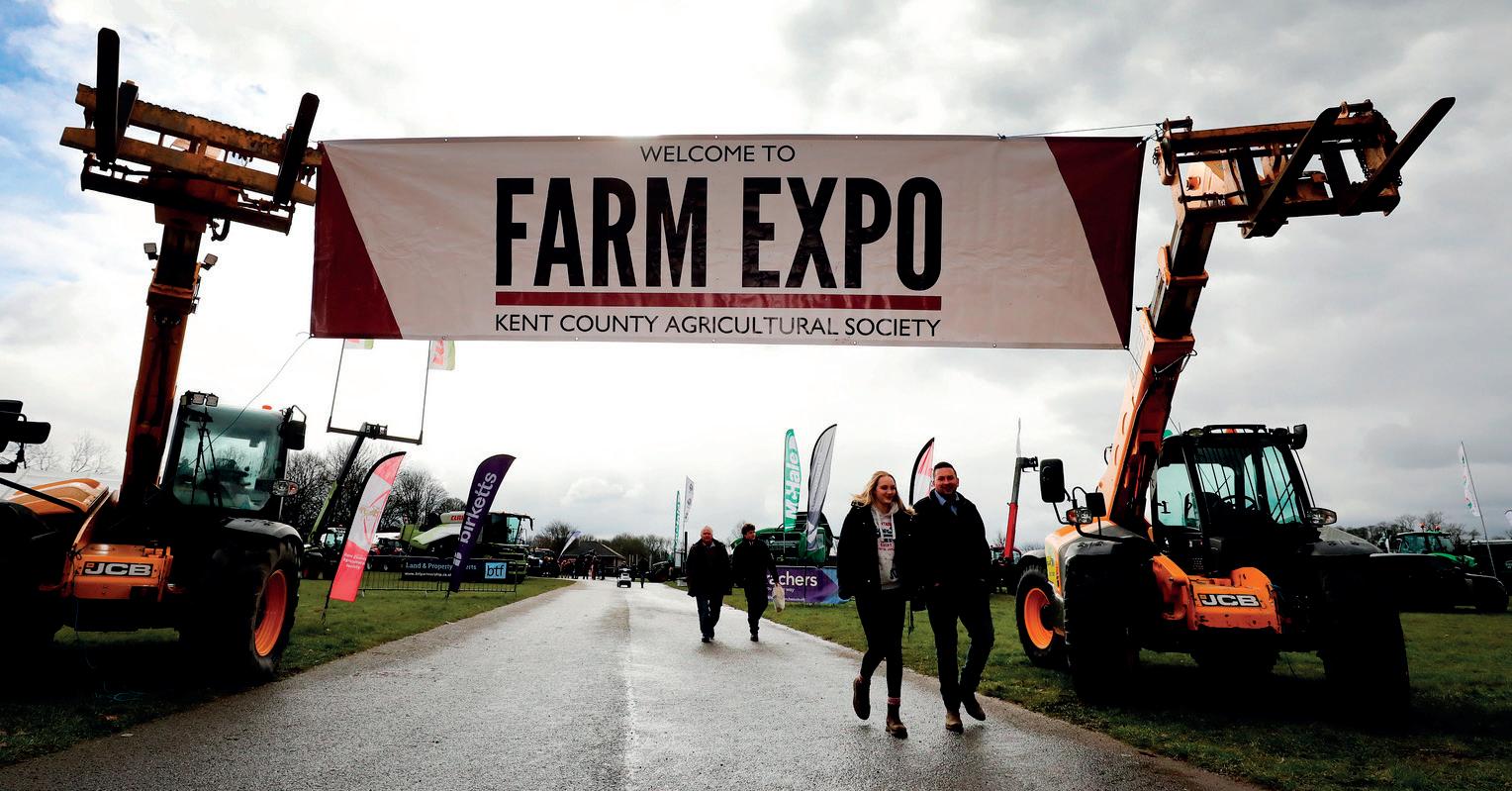
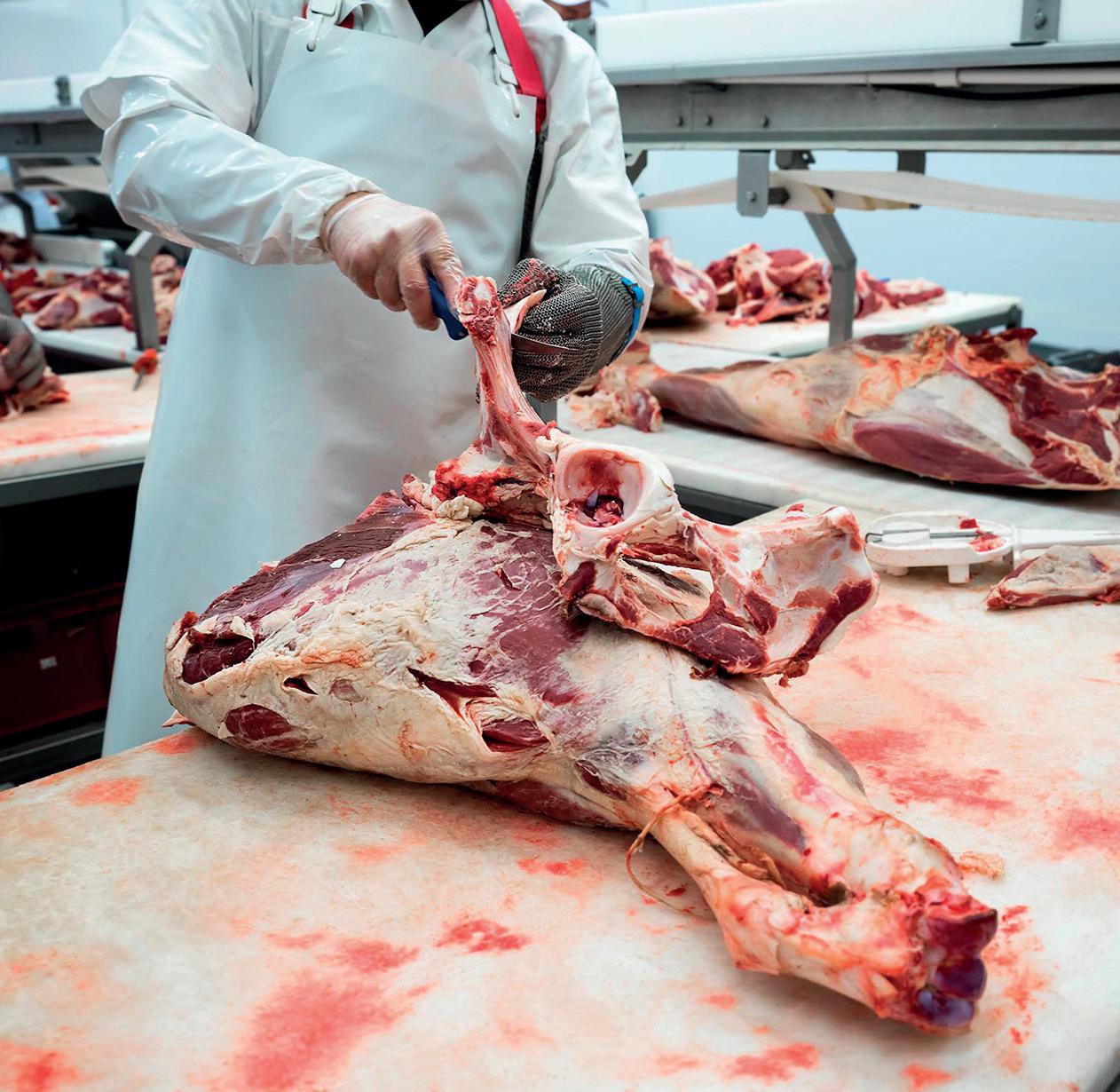
The proposed ‘one-sizefits-all’ UK immigration policy would see a salary increase for skilled workers of almost 50 per cent.
The group acknowledged the importance of managing immigration but added it was ‘vital’ the food and drink sector – worth £15 billion in Scotland alone – should be protected and that the UK continued to enjoy ‘affordable, high-quality food and drink’.
In a separate letter to the Home Secretary, Nick Allen, chief executive of the British Meat Processors Association (BMPA), explained forcing companies to take on overseas butchers at £38,700 would harm the sector which currently pays UK workers £26,200.
Mr Allen said this would instantly spark a raft of equal pay claims under the Equality Act 2010, as existing British workers have a legal right to demand to be paid an equal salary for the same work
as their newly arrived overseas colleagues.
He added such an increase in overheads across the whole workforce simply could not be absorbed when firms were already working to tight margins of around 2 per cent. Instead, it would stoke food price inflation and be passed on to the British consumer.
Mr Allen said: “Companies across the meat industry and other key sectors that rely on sourcing overseas labour to fill persistent job vacancies have become exasperated with the Government’s one-size-fits-all, blunderbuss approach to migration.
“BMPA, along with many other industry groups have written separately to the Home Secretary to warn him of the damage that this new policy will inflict, and to entreat him to take a more targeted, sector-bysector approach.”













MAY 2024 wheat futures markets saw the first week-on-week rises of 2024 last week, with prices closing at £164.30/tonne on Friday.

This was up from £163.15/t on February 16. It follows the May 2024 contract falling to its lowest level so far, at £160/t on Monday 19. Helen Plant, senior analyst at AHDB grains and oilseeds, said trading had been variable in global markets, but both Chicago and Paris wheat futures also saw overall gains.
There was a ‘potential pick-up in demand’ within France and internationally, alongside short covering in wheat futures by speculative traders. There were also reports the US could impose new sanctions against Russia to mark two years since the invasion of Ukraine,
alongside potential weather threats to the US crops.
More news
She said: “However, more news seems likely to be needed to support further rises. South American maize prospects remain positive, with planting of Brazil’s Safrinha maize crop going well.
“Following the recent heatwave, the Rosario Stock Exchange cut its estimates for the Argentinian maize crop by two million tonnes and soyabean crop by 2.5mt.
“Both forecasts are still well above last year’s level. Plus, while more rain is needed to keep the forecasts stable, this is forecast for the coming days.”
French winter crop conditions were also broadly stable.
RURAL communities’ needs are being ‘ignored’ as the National Audit Office (NAO) highlights concerns mobile network operators will not meet deadlines on 4G coverage.
By autumn 2023, 92.7 per cent of the UK landmass had 4G coverage, but the programme was behind schedule, with only EE announcing it had met its interim coverage target.
Reasons for the delay included it taking longer than expected to finalise mast locations, agree site sharing and access and procure services.
Gareth Davies, head of the NAO, said: “Demand for mobile data access is expected to increase as data-intensive services become more popular and new technologies enable new
A LONG-awaited Defra report has been hailed as an ‘important catalyst’ in improving consistency when it comes to tackling agriculture’s carbon footprint.
A lack of industry-wide standardisation has been a major concern for farmers when taking part in carbon accounting.
This was acknowledged in the ‘Harmonisation of Carbon Accounting Tools for Agriculture’ report, with firm recommendations to try and balance the emission books more consistently.
Agrecalc said the timing of the report could not have been better, ahead of the Low Carbon Agriculture Show, which is hosted by Farmers Guardian’s Agriconnect at the National Agricultural Exhibition Centre at Stoneleigh in Warwickshire on March 6-7.
Julian Bell, Agrecalc agriculture
uses, and Government has set out a clear ambition for improved connectivity.
“It is unclear whether the Shared Rural Network programme will achieve its coverage target on time; costs are higher than anticipated; and Government has not clearly articulated the benefits of aspects of the programme, including increased connectivity in sparsely populated areas.
“As Government develops its 5G strategy, it will need to more clearly define what it is aiming to achieve in different parts of the UK and economic sectors, so limited resources can be targeted where they deliver most value.”
CLA president Victoria Vyvyan said the needs of rural communities were

By autumn 2023, the programme was behind schedule, with only EE announcing it had met its interim coverage target.

‘being ignored‘. She said: “Failure to meet the agreed deadlines simply perpetuates the ongoing rural-urban digital divide, holding rural businesses back and hitting economic growth.”
She added there should be ‘no more excuses’ and if deadlines cannot be met, other solutions needed to be looked at, including imposing national rural roaming on operators.
director and principal consultant, who will speak at the show, said: “We welcome this report because it presents a real opportunity for Agrecalc and other calculators to progress towards increased consistency and standardisation in our approaches and methodologies.
“We are dedicated to providing farmers and the broader industry with the most robust and widely accepted scientific methods to confi-
dently identify their emissions and pinpoint areas for reduction,” he said, adding confidence from the farming community was ‘vital’ to achieve carbon reduction goals.
Key recommendations from the report include defining what a farm-level assessment is, aligning calculators with the requirements of the latest standards and guidelines, as well as regular
Attention will be turning to fertiliser applications for 1st cut silage if they haven’t already begun! Field conditions for slurry applications have not been ideal, and many swards because of the relatively mild but wet February have greened up nicely. It’s vitally important that spreading equipment is fit and ready to apply fertiliser when the time comes.
Spreading fertiliser accurately should not be left to chance. Firstly, fertiliser quality has a major influence on accurate spreading. Where urea is being blended with ammonium sulphate or other materials such as DAP and MOP, it’s going to be incredibly difficult to apply each one of these materials evenly. It’s like trying to spread a fertiliser made up of golf balls and table tennis balls! Be careful, these urea blends will not have spreader settings, the exception might be for some urea and ammonium sulphate blends.
reviews and updating of calculators to take into account changes in scientific knowledge.
It also said calculators should use emission factors from agreed set databases for emissions in fertilisers, feeds and fuels and calculator providers need to build user confidence through transparency of approach, third-party verification and alignment of calculators to minimum standards.
with Philip Cosgrave Agronomist, Yara UK Ltd.
Secondly, if it’s your spreaders maiden voyage of the year, then check it out mechanically beforehand and check that you can find a spreader setting for the fertiliser product you are going to use. Yara consider providing up-todate fertiliser settings for all its YaraBela, YaraMila and YaraVera product ranges as an essential element of providing quality uniform compound fertilisers.
Finally, if you haven’t purchased your 1st cut fertiliser yet, buy a sulphur containing product.
We can safely say that sulphur will grow you 10% extra 1st cut yield, which could be an extra 2 bales of silage per ha for an investment of only £8.
UKRAINIAN farmers have brought agricultural machinery destroyed by the occupiers to the border after Polish protesters cause blockades and spill grain on railway tracks citing unfair competition.
Members of the Ukrainian Agri Council (UAC) brought machines to the Kakivets-Korczowa checkpoint to showcase the consequences of the war.
Polish protesters have blockaded border crossings, as well as opening railway carriages to allow grain to pour onto the tracks.
Signs held by protesters stated

 ANDRIY DYKUN
ANDRIY DYKUN
that the grain flowing in from Ukraine would bankrupt Polish farmers. The Polish Government said it was speaking to farmers and unions to resolve the situation.
But their Ukrainian counterparts warned of the impact on Poland if Ukraine were to lose the war.
Andriy Dykun, head of the UAC,








said: “Our goal is to show our Polish colleagues the circumstances in which we have been working for two years.
“The machinery of our farmers, which we brought from different regions of Ukraine, was destroyed by the Russian invaders. It was blown up in Ukrainian fields, shelled by artillery, and burned by the occupiers.
“Behind every combine or tractor there is a tragic history of the farm, sometimes with human losses. We pay a very high price for each grain.”
Over the two years of war, the
total cost of destroyed agricultural machinery is $5.8 billion (£4.6bn).
According to the latest estimates of the World Bank, the total losses and damage to the Ukrainian agricultural sector over the two years of war have increased to $80bn (£63bn).
The UAC urged their Polish colleagues to ‘consider facts, not Russian propaganda’.
He said: “We understand that the situation of Polish farmers is difficult, but it is not Ukraine’s fault. There is an overproduction of grain on world markets,” he said, adding that there was a huge oversupply from Russia.
REPRESENTATIVES from the Irish Farmers Association (IFA) met Taoiseach Leo Varadkar last week to discuss farmers’ frustrations.
President Francie Gorman and an IFA delegation met Leo Varadkar, emphasising the frustration and anger with increased regulation, reduced support and falling incomes.
tions and the sector need to pull together to ensure that the derogation stays in place,” he said.
“The payment delays of 2023 cannot be repeated. “The move to make an interim payment on ACRES is a step forward and money needs to get to farmers as a matter of urgency,” he said.”
















“While the meeting was constructive, the Taoiseach and the Government must deliver.
“To date, farmers have been taking actions at local level, but anger is building,” he said.
He said that he made clear the Government needed to lead a unified national effort to retain the nitrates derogation.
“All politicians, farm organisa-
He added increased tillage production was a key Government policy but the area was declining, calling for a budget for a new tillage scheme. Ash dieback was also discussed as well as a Residential Zoned land tax.
Other issues raised included VAT refunds, the cost of doing business and work permits.
“In conclusion, the planned actions agreed at our recent National Council meeting will continue until we get delivery on the issues we highlighted,” he said.
 Edited by Angela Calvert – 07768
Edited by Angela Calvert – 07768







Rachel and Richard Moss, who met 10 years ago at their local Young Farmers’ Club, epitomise a driven young farming couple, who are determined to pursue their farming dream for themselves and their two children, and seize every opportunity which comes their way.
The family now farm on a Staffordshire County Council progression dairy farm, currently milking a 160head mainly Jersey and Holstein cross herd with 80 followers, supplying Joseph Heler.


The herd is averaging 7,300 litres, with plans to increase to 8,500 litres, and they are committed to keeping the quality of milk, currently at more than 5 per cent fat and 3.8 per cent protein.
Rachel is a farmer’s daughter who also grew up on a Staffordshire County Council farm, but was a florist for more than 10 years.
Richard is a first generation farmer who previously worked as a herd manager, but always had an ambition to one day milk his own cows.


Their first break into the dairy industry was not straightforward. They were turned down for a tenancy on a council farm in Cheshire after reaching the final two. But in November 2019, they secured a tenancy at a start-up Staffordshire County Council 32-hectare (80-acre) dairy farm.
Rachel says:
“We have not had anything given to us; we have done it all our-
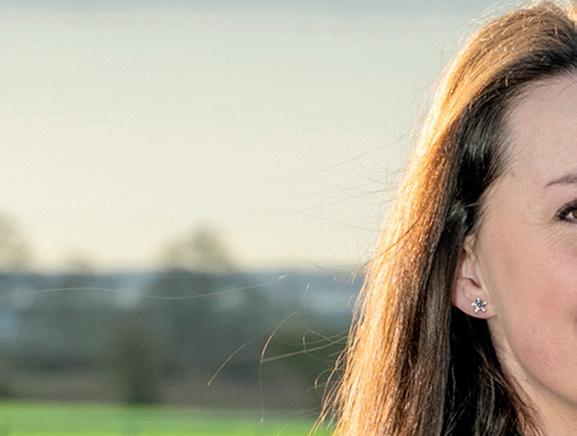





selves. When we started, we had no cattle behind us. We just put money into it and literally started everything.”
Richard says: “It was initially quite scary and a completely different way of life compared to going out to work for somebody else. But I have ownership now. I probably do not make all the right decisions, but it is your own fault when you make the wrong ones.”


The couple had only been at the start-up farm for two-and-a-half years when the progression farm within the same county popped up. It was an opportunity Richard and Rachel






say came up sooner than they anticipated, but one they could not turn down. The farm offered them a longer term tenancy, more security for the family, as well as a bigger dairy unit. And with double the acreage, it enabled them to increase their herd size.


Richard says: “It was a chance to invest and see more of a return on what we do. The starter farm was not quite big enough. For us to grow a bit bigger, we had sort of reached where we



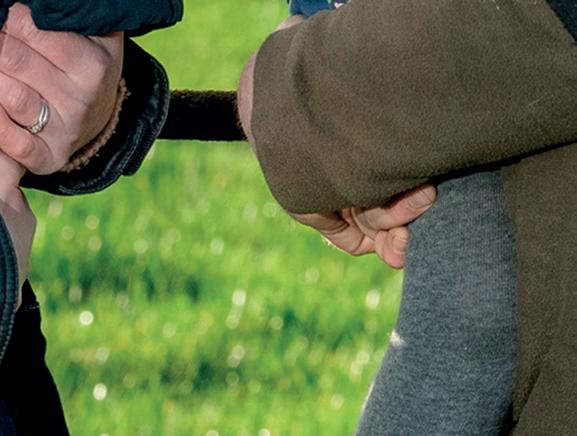
wanted to be. We took the opportunity while it was there.”
When they moved to the progression farm a few miles away in July 2022, it was not the easiest of starts for the family, faced with the Covid-19 pandemic and then a bovine TB breakdown.


Richard says: “We had just moved and wanted to increase cow numbers, but then we went down with bTB. We felt like we were standing still.”
Rachel says: “The milk price kept going down and fertiliser prices were high.



When we moved, we had to start a new




electricity contract and our bills more than tripled. It was a cost we were not expecting.”
But farming together and with the support of family and the community close by, they overcame their challenges.
Richard says: “We were a bit on our own at the last place, but here it is more of a neighbourly farming community.”
Rachel says: “We know we are all in the same boat. We are all county council farm tenants.
“You do feel different when you are a tenant, compared to people who own their farms. We understand each other.”
Since being at the farm, the couple’s proudest achievement has been not only growing a healthy milking herd, but installing a robotic automatic scraper and upgrading their milking parlour.
Parlour
Rachel says: “We are now direct to line in a Fullwood 20:40 swingover parlour. That is probably our biggest improvement. We have also installed vacuum on demand and variable speed milk pumps to reduce the energy usage.”
The couple were also offered a small grant to improve the council holding, which they used to install a heat recovery system, again to help save energy. Other improve-
If you are in your 50s when your Farm Business Tenancy ends and you have nothing to go to, you are back to where you first started RICHARD MOSS
ments on-farm included installing solar panels and reseeding more than half of the land.
Rachel says: “We are in the Mid-Tier Countryside Stewardship scheme, which we use to maintain hedgerows, water courses and improve fencing across the farm.”
For their next project, they have had a grant approved to install sleeper tracks across a section of the farm.
Rachel and Richard do not currently employ any relief staff, running the farm between them.
They juggle the milking and


all-year-round calving with looking after their two children, Freya and Charlie.
Rachel says: “The children love the farm. It is long hours, but usually they are with us whatever we are doing outside, up until


recently, and every afternoon milking they are with us.”
Richard reiterated that if he was still working for somebody else, he would not have been able to see the kids as much as he does now. He says: “We have a lot of support from family when we need it, but day-to-day, there are only the two of us. Although we love being busy and doing what we do, we
Richard Moss says that going forward they hope to employ

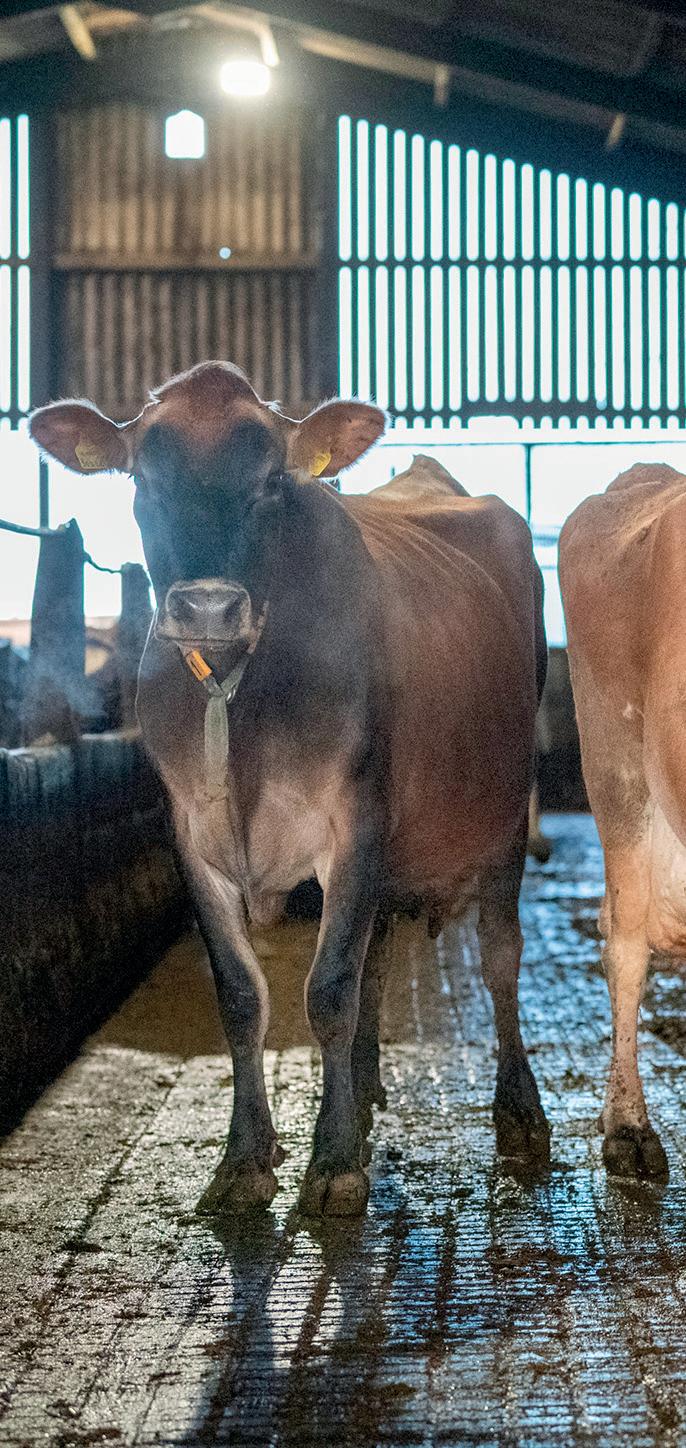


want to make the farm run as efficiently as possible to give ourselves more of a work-life balance.”
Richard says that going forward they hope to employ a relief milker, but says they are building the farm up at the moment.
He says: “The last thing on our mind has been getting someone to milk the cows for us, as that

is another cost which we do not need. The money we earn we put straight back into the farm.”
Looking to the future, the couple hope to be able to stay on the farm for the full tenancy, but recognise the Farm Business Tenancy (FBT) on council farms is



a total of 26 years, which included their time on the start-up farm.
Richard says: “It would be nice to end up on a private estate with more acres. The only down side with these FBTs is that they are dependent on how young you are when you get your first one.
“If you are in your 50s when your FBT ends and you have nothing to go to, you are back to where you first started. You could end up going back to working for somebody again.”
Reflecting on their journey, Richard and Rachel agree the decision to move to the progression farm was the right one, but realise this was just the beginning.
Early days
Richard says: “It is still early days for us; we moved quite quick. We do not feel we have a story yet. I am pleased we are here.
“There are a lot more starter farms than progression farms which come up.
“We were lucky at the time and, if we had waited longer, there would have been more people after them and we might not have got it.”
Rachel adds: “This is one of the biggest farms on the estates and we hope it has the potential to have more land. We are not relying on it, but that would be lovely in the future.”
The couple both say there will
Farm facts
■ All-year-round calving
■ Beef calves sold under 42 days old
■ The family are four years into a 26-year tenancy
■ Jersey and Holstein cross cows
■ Milk is 5 per cent butterfat and 3.8 per cent protein
■ Grass and maize silage grown
■ Forage wagon for silagemaking
always be doubts along the way, questioning whether they have invested in the right areas, but they stress the most important thing is that they are ‘doing it together’ as a family.
Rachel says: “What is nice is that those animals are our animals. We are not just milking someone else’s cows. It is literally down to us. Being our own boss and being part of our own family workforce.
“Someone said to us when we first started ‘congratulations on getting your farm, if you can get through the first 12 months then you are doing alright’.”
They have now run their own farm for seven years, and when asked to sum up in three words their time in dairy farming so far, they simply say ‘determination, commitment and hard work’.
SUSTAINABILITY should make sense for both the environment and business finances, and this is something that arable farmer Martin Lines tried to achieve.
Mr Lines, who is chief executive of the Nature Friendly Farming Network, farms 165 hectares on his family farm, based in south Cambridgeshire, and built his business on producing crops in a nature-friendly way.
He said: “Post-war, the focus was on increasing food production, and that was at the detriment of our soil and the environment. And the constant buying of inputs also depleted our bank balance.”
Mr Lines soon realised that he was producing much more than just food.
He said: “As farmers, we are asset managers of natural capital, producing goods and services that society wants: food, energy, fibre, public access and water storage. If we look at it in a holistic way, we can see how much productivity and production there is.”
Mr Lines changed his farming business following the continued phasing out of the Basic Payment Scheme.
“My focus now is to produce as much as possible, for the best margin possible, for all the goods and services that society wants from us – I am trying to stack as many enterprises as I can,” he said.
The farm was based on a heavy clay soil type, and Mr Lines historically ploughed much of the farm until he realised it was creating structural challenges within the soil.
He said: “[Due to ploughing] the soils were becoming tighter and
■ Family farm based near Cambridge
■ 540 hectares, including 160ha owned plus 380ha rented and contract farmed
■ Clay soil type
■ Mainly grow combinable crops, including winter wheat, winter and spring barley, winter beans and oilseed rape
■ Nature-friendly farming practices: reduced cultivation, incorporating cover crops, flower margins and reducing inputs


High input prices constantly put pressure on growers, so creating a system which relies on little to no inputs might seem attractive, but how does it work in practice? Ruth Wills attended the Rootstock conference to find out.


wetter. So, I went on a journey to find a low-disturbance drill, and now we slot the seeds in; there is no soil moved and a lot less weed germination.
“My father was very concerned that the soil would eventually slump, so we got into cover crops. We grow mixes as diverse as possible. We also have a crimp roller which can terminate cover crops if we need to.”
So, how did Mr Lines build a business that not only produced a good margin, but also benefited the environment?
“Nutrients only get placed where we need them; they used to be broadcast across the field, and it has saved us £8,000 a year in fertiliser costs,” he said.
He also used soil and yield mapping technology to understand in-field variation, giving him the ability to adjust seed rates accordingly.
“Yield maps are the best thing we
ever put on the combine; they are really easy to interpret – green usually means a profit and red is usually a loss – so if you cannot improve it, take it out of production. If the average yields go up, the costs will usually go down,” he said.
Mr Lines redesigned the farm landscape to include in-field strips and flower margins.
He said: “There is biodiversity both in the middle of the fields and in the soil.”
The flower margins also proved to have additional benefits.
Mr Lines said: “We had a flower margin beside some beans, full of aphids, and we could not spray for 10 days because it was wet and windy, but after the 10 days, all of the aphids were gone and all I found were ladybirds and hoverflies. By understanding what pollinators and insects were present, we stopped using insecticides nine years ago.”
Using cover crops, flower margins or in-field strips – plus adding compost or manure – boosted
If we look at it in a holistic way, we can see how much productivity and production there is MARTIN LINES
yields by 18 per cent, said Mr Lines.
“And we have significantly slashed our costs; by over 60 per cent in diesel alone,” he added.
“There is a reduction in herbicides and insecticides – we only use one or two bags of slug pellets a year.”
Martin Lines won silver in the Sustainable Farmer of the Year category at last year’s British Farming Awards.


Two farmers from the East Midlands reflected on how climate change was affecting them in practice during a recent Wheat Genetic Improvement Network discussion session. Teresa Rush reports.







EXTREME weather linked to climate change is the biggest challenge facing UK farmers and growers today. That was the view of Joe Stanley, who – after 15 years at home on the family mixed farm in Leicestershire – is now head of sustainable farming and knowledge exchange at the Allerton Project, based at Loddington near Market Harborough.
In a recent panel discussion during the Wheat Genetic Improvement Network (WGIN) annual stakeholders meeting, with Nottinghamshire farm manager Richard Cross and led by Tom Allen-Stevens, founder and manager of the British On-Farm Innovation Network, Mr Stanley explained what climate change looked like on-farm from his perspective.
He said: “I was farming at home for about 15 years and in that period, you could rely on the seasons to do more or less what they had done for your father and for your grandfather before that.
“But from about 2018 we have
gone from a situation where almost every season was becoming extreme [in weather terms], to one where almost every month is becoming extreme and setting new records.”
It became more difficult to plant crops in the autumn and the spring, and harvests also became challenging, said Mr Stanley.
“Livestock farming has also been significantly impacted by this [extreme weather] in terms of fodder availability, straw availability, and disease,” he said.
Richard Cross manages the 1,100-hectare Oxton Estate in Nottinghamshire. Farming is at the core of the estate, but there are several diversification enterprises. Soil types are predominantly light over gravel and heavier red Keuper Marl, which is the farm’s best wheat land.
Extreme weather events were posing challenges in the form of crop failures and soil erosion on the estate.
Mr Cross said: “We used to get 650mm of rain a year here, which is reasonably dry, but we recorded just over 1,000mm of rain between July and Christmas.
“And that means our challenging

rape drilled last autumn was lost as a result of the wet weather.
Because of the volume of water, the amount of erosion we have had across some of our fields has been unprecedented RICHARD CROSS
fields – we have got some quite steep fields on the heavy land – are basically impassable.
“We did manage to get drilled up – nearly. We have been trying to take care of our soils; I use a strip drill and we thought we had done everything right.
“But because of the volume of water, the amount of erosion we have had across some of our fields has been unprecedented.”
Close to two-thirds of the estate’s winter wheat, barley and oilseed
“The soil has been really badly damaged, and I would not want to calculate the amount of topsoil we have lost because of the force of the rain,” said Mr Cross.
Yet in the previous season, maize grown for anaerobic digestion died off because of drought.
“It is these extremes of weather we are getting which are making farming more and more challenging,” said Mr Cross.
Mr Stanley added that overwinter crop losses were at a similar level at the Allerton Project.
He said conditions on the farm were ‘less than inspiring’ despite 20 years of doing everything possible to move in a more sustainable direction and concentrating on soil health.
He told scientists and plant breeders at the meeting that the effects of extreme weather on UK agriculture should not be overlooked as they sought to introduce new traits into crop genetic material.
He said: “The scale of the problem that we are now facing here in the UK, in terms of climate


UPDATES on several wheat breeding research projects were shared at the Wheat Genetic Improvement Network meeting. These included:
■ Breeding wheat for a hotter climate (John Innes Centre)
■ Delivering Sustainable Wheat
change and the impact it is having – especially on arable and horticultural production – means that, quite frankly, the seeds that you produce can have the most fantastic traits that you can engineer or breed into them, but if they are going to rot in the ground, they are not going to be any use to us.
“The challenge of getting a seed into the ground and to grow at the appropriate time of year should not be dismissed.”
Traits to build crops’ climate resilience, helping them to cope with more extreme conditions, would be welcome, said Mr Stanley.
He also called for more varieties with greater potential for growing under integrated pest management and lower nitrogen input regimes.
“The problem I have found as a grower has been that those varieties which are most resilient, most resistant, and most tolerant to pests or diseases also tend to be pretty rubbish from a financial point of view. We do need to have that complete package.”
Mr Cross agreed that there was a need for varieties to stack up practically, economically and environmentally.
He said: “I am trying to manage without insecticides and have been doing that for the last four years, but I really want something to come along, other than the beneficials I am encouraging by not applying insecticides, to help me out.”
programme (JIC, Rothamsted Research, the Quadram Institute, the Earlham Institute; Bristol, Imperial College, Lancaster, Leeds and Nottingham universities; NIAB)
■ Enhancing wheat nutritional quality (Rothamsted Research)
■ Hi-Fi bread – increasing the fibre

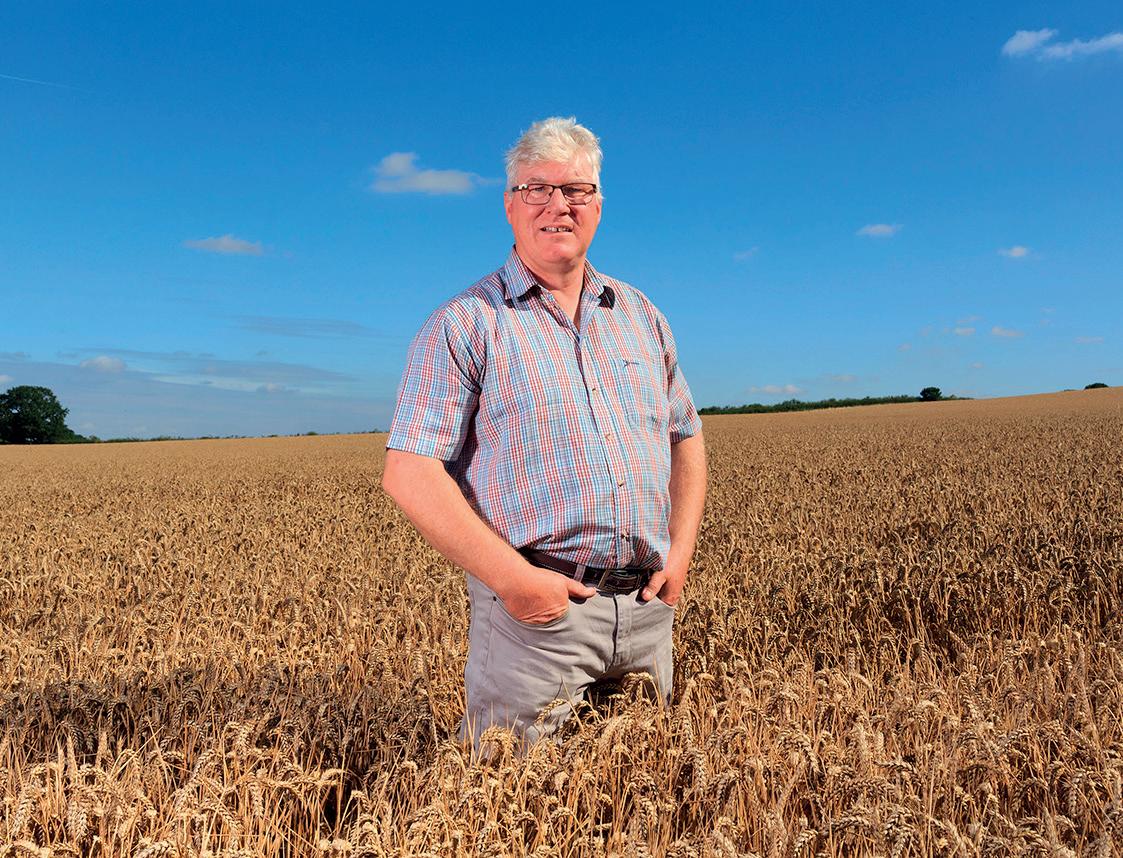
content of the great British white loaf (Reading University)
■ Linking ambient temperature to crop growth (JIC)
■ Exploring variation in barley yellow dwarf virus across the UK for improved knowledge and diagnostics (Rothamsted Research)

■ The Wheat Genetic Improvement Network: wgin.org.uk
■ The British On-Farm Innovation Network: bofin.org.uk
■ The Allerton Project: allertontrust.org.uk


Pea and bean growers could improve yields by nearly a fifth through the application of a starter fertiliser with phosphate enhancement capability. Farmers Guardian reports.
A THREE-year trial spanning vining peas and beans and combining peas and beans has shown an average yield increase of 17 per cent with the application of a starter fertiliser.
The crop nutrition trials spanned sites across Yorkshire, Cambridgeshire, and Oxfordshire with varying nutrient status and were initiated in 2019 in response to requests for more detailed fertiliser guidance from vining pea growers in the East Riding of Yorkshire.
The trials were subsequently expanded to include combining peas and beans, as interest in these crops was growing on the back of demand for homegrown protein and a desire among many to extend the rotation.
Jim Carswell, Agrii technical manager for fertiliser, says: “As with cereals, establishment is known to be key to performance, especially in dry and wet springs, but early nutrition has largely been neglected. We can quite easily do better.”
The trials sought to build on the accepted understanding of how phosphate supports establishment. Although essential, typically just

five to 15 per cent of the applied phosphate is used by the crop. Much is rendered unavailable by polyvalent cations before it can be taken up by the crop.
Phosphate lock-up is a widely recognised problem on both high and low pH soils. Using a form of phosphate treated with a protective
coating, Agrii-Start Pulses (0N: 17P: 19K + 19 SO3 along with Ca and Mg) was applied at 210kg per hectare. The increased phosphate availability and the obtainability of other important nutrients was reflected by the yields.
Of the 35 trials performed between 2020 and 2022 that received Agrii-Start Pulses, 29 – equivalent to 83 per cent – delivered a positive yield increase. Visual benefits, especially in rooting and green area index, were also noticeable.
Mr Carswell says: “The higher yields were the result of a bigger root mass in the treated crops.
“This supported bigger canopies and higher chlorophyll levels in the plant. The polysulphate component

of Agrii-Start Pulses provided other physiological benefits which were consistent with what we have seen from its use in other crops.
In 2022, trace element coatings were added to the fertiliser to support availability.
“The need for trace elements to improve root nodulation is well understood and there are five trace elements that have been identified as being fundamental to this area of crop growth. What is not understood, however, is the quantities required,” says Mr Carswell.
PRE-EMERGENCE residual herbicide from Bayer, Emerger, with activity against a range of common broad-leaved weed species, can now be applied in field beans (winter and spring) and combining peas. However, the authorisation does not include vining peas.
The news will likely be welcomed by growers given the low number of pre-emergence herbicides authorised for use in these crops, says Richard Phillips, Bayer campaign manager for roots and horticulture crops.
He says: “As the only aclonifen product on the market, the authorisation for Emerger in peas and beans means growers have access to a
herbicide with a broad-spectrum of activity. Its novel mode of action – HRAC group 32 – will also support efforts to promote resistance management.”
Among broad-leaved weeds, Emerger offers good activity on fat-hen, redshank, black bindweed, mayweeds, charlock, chickweed and poppy, as well as moderate control of blackgrass (from seed).
“Emerger is primarily absorbed by the shoot of germinating weeds. This is advantageous in dry weather conditions, such as those that typically occur in the spring, when seeking to establish spring crops,” adds Mr Phillips.
A NEW South Country Cheviot female record of 2,200gns was set at the Cheviot Sheep Society sale at Longtown.
This was for a gimmer by Castle Hitman, in-lamb to GDM Dundee, a Hindhope Cavalier son, from James Cochrane, Castle Crawford. The buyer was E. MacMillan of the Lurg and Townhead flocks, Stirling.
Judge, Gordon Jackson, Blackburn, selected as champion a onecrop ewe from W.N. Douglas, Catslackburn, Yarrow. Out of the £12,000 Catslack Halo and inlamb to the £10,000 Crossdykes champion at last year’s society ram sale, it made 1,900gns to J. Pugh and Partners, Ty Talgarth, Mid Glamorgan.
W.J.C. and S.J. Weir, Mainside, Hownam, took 1,200gns for a two-crop ewe by Castle Assasin and in-lamb to Catslack Weir’s
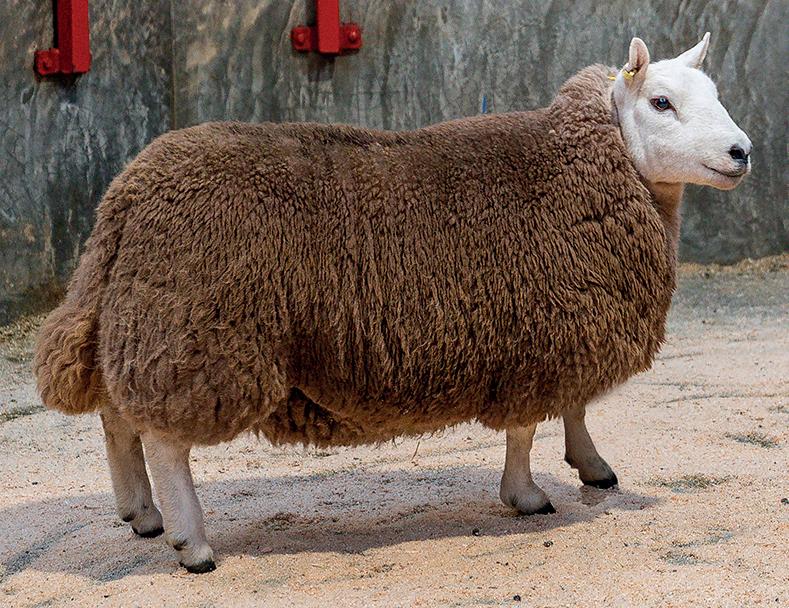
Wonder. The buyer was Lorraine Luescher, Glendinning, Westerkirk, who sold the reserve champion at 700gns, a Castle Glendinning Harris gimmer, inlamb to Stirkfield Firefly.
There were three 1,000gns sales – a Castle Go-Getter gimmer from R.H. Paton, Castle Crawford, to J. Anderson-Roskell, Ragith -

Top price, a gimmer from James Cochrane, Castle Crawford, which sold for 2,200gns to E. MacMillan, Stirling.
whaite; a Catslackburn gimmer in-lamb to £12,000 Tweedshaws which went to William Nixon, Cooms, and a three-crop ewe by Becks On Top from T. Elliot, Hindhope, which sold to Messrs Pugh, Harlech.
AVERAGES
Ewes, £845; gimmers, £868; 1 geld hogg, £336.
Auctioneers: C. and D. Auction Marts.
THE show and sale of Blackface in-lamb females at Lanark topped at 5,800gns for the champion, a gimmer by McCoy LAL out of a Spectre-sired dam from J. and J. Murray, Crossflatt, Muirkirk. Carrying a single to Titan, it sold to R. and I. Shaw, Lochgilphead.
Next, at 5,000gns, was a gimmer in-lamb with a single to £23,000 Dalchirla, consigned by E.J. MacMillan, Lurg, Fintry, which sold to Messrs Connell.
Thomas Muirhead’s Orchilmore flock, Crieff, was next at 3,400gns for a one-crop ewe by £6,000 Auldhouseburn, due with a single by the £32,000 Auldhouseburn, which sold to J. and J. McAlister.
This was followed at 3,200gns by a gimmer consigned by J. Wight and Sons, Grains. By the £30,000 Midlock, a son of the £200,000 Dalchirla, it sold having been artifi-
cially inseminated to the £30,000 Crossflatt, to R. Mackay, Oban. Messrs Wight also sold a gimmer sired by £30,000 Midlock, carrying twins to Emperor, for 2,800gns to M. Hamilton, Woolfords, West Calder, for their South Cobbinshaw flock.
AVERAGES
Overall 39 females, £1,681.35; 14 aged ewes, £1,736.25; 24 gimmers, £1,675.63; 1 ewe hogg, £1,050. Auctioneers: Lawrie and Symington.
RECORDS were shattered at the British Limousin Cattle Society’s show and sale at Ballymena when the junior and overall champion sold for 17,000gns setting a new record for a Limousin bull sold at auction in Northern Ireland. This was 18-month-old Ampertaine Teus by Ampertaine Foreman out of Ampertaine Joy, a Goldies Fantastic daughter, from James McKay, Maghera.
With a beef value of LM56 and two copies of the F94L myostatin gene, it sold to Mark McKinstry, of the Ballyaulkin herd, Co Antrim.
Next top price of 8,500gns was paid to John O’Kane and Sons, Garvagh, for their intermediate champion, 19-month-old Gleneagle Trooper by Ampertaine Majestic, out of the Mereside Lorenzo daughter, Gleneagle
Polly. The buyer was Stephen McGookin, Carrickfergus.
Making 5,600gns was the reserve senior champion from Ian Davidson, Larne, 21-month-old Ballyrickard Trigger LM43 by Foxhillfarm Lordofthering, which sold to A. Abbott, Lisburn.
AVERAGES
18 bulls, £5,160 (100 per cent clearance). Auctioneers: J.A. McClelland.
THE dispersal of the in-lamb pedigree Swaledale sheep on behalf of Patrick and Kirsty Sowerby, Barras, topped at £6,000 for a three-crop Del Boy-sired ewe in-lamb with twins which sold to Messrs Ridley, Haltcliffe.
A four-crop Del Boy-sired ewe inlamb with twins sold for £5,000 to Messrs Ewbank, Middlesmoor.
Selling for £4,500 was a three-crop Elvis-sired ewe carrying triplets which went to Messrs Robinson, Catlow. At the same money, a five-crop Bull and Cave-sired ewe carrying a single sold to Jack Hallam, Whitby.
One-crop ewes sold to £4,000 for a Nelson-sired ewe carrying twins.
Shearlings topped at £1,800 for an Oakbank Harry-sired entry which sold to Messrs Scarr, Muker.
200 Swaledale ewes from shearlings to 10-year-old ewes, £675.31.
Auctioneers: Harrison and Hetherington.
THE Burrows family, Barton, led the trade at Brockholes Arms dairy sale at £3,050 for the second prize-winning heifer, Stardale Lambda Legacy which sold to Aubrey Greenhalgh, Preston.
They also took the reserve championship with the first prize cow, Stardale Maui Vaakje 4, which went on to sell for £2,880 to Evan Ellis, Shropshire, and then sold Stardale Robert Legacy, a second calved cow for £2,620, with the consignment averaging £2,667.
The championship rosette went to the first prize heifer from the Tomlinson family, Preston, with Bilsrow Amulet Olympia which sold for £2,600 to Messrs Ellis. Other heifers from this home sold at £2,450, £2,350 and £2,150.
The consignment from Thompson Bros, Claughton-on-Brock, sold to £2,400 for the second prize cow, with heifers to £2,000.
Robanne D Helena from R. and A. Jolleys, Forton, topped their consignment at £2,250 and a pedigree heifer from D. Fryars and Son, Poulton le Fylde, sold to £2,200.
In-calf heifers from Messrs Jolleys sold to £1,580 and pedigree bulling heifers from the Tomlinson family topped at £1,050.
Auctioneers: Brockholes Arms Auction Mart.
Visit the UK’s most comprehensive auction listings at auctionfinder.co.uk

rSale sees 19 bulls average £5,620
THE sale of pedigree Charolais at Swatragh topped at 9,200gns for October 2022-born Brogher Trump, a Whitecliffe James son going back to Blelack Digger and out of the Mornity Nerosired Brogher Ripple from Trevor Phair, Florencecourt. The buyer was W.J. Fraser and Sons, Ballindalloch.
The reserve intermediate champion Drumacritten Toby from G.E. Nelson, Drumacritten, was next at 9,000gns, selling to C. McDonnell, Glenariff, Co Antrim. Out of Drumacritten Jessie, this bull was also sired by Whitecliffe James and carried two copies of the F94L gene.

The senior, male and overall champion went to S. and D. Bothwell, St Angelo, with Killadeas
Trevor, a Cloonglasna11 Padraig son out of Killadeas Octavia. This August 2022-born champion was
TRADE at the inaugural sale of pedigree native cattle at Brockholes Arms topped at £3,000 for Coley Endure Y654, an Aberdeen-Angus bull from H. Whittaker and R. Clarke, Halifax.
At £2,800 was another Angus, Three Peaks Master Earl Y039 from Pemberton Farms, Ingleton. This was followed by £2,700 for Woodmoss Phoenix Y039 and £2,500 for Wood-

mass Preston Y043 from Woodmass Farming, Ormskirk.
Pedigree Aberdeen-Angus females topped at £2,300 twice for R. Parker’s Mereside herd, Ormskirk, with pedigree Aberdeen-Angus cows and calves from the same home to £2,250. A pedigree in-calf Aberdeen-Angus heifer from J. Walsh’s Buckhurst herd, Bury, made £2,200.
Hereford
Pedigree Hereford bulls sold to £2,700 for Taymar Arnie from S. Taylor and D. Marsh, Preston. Other Hereford bulls sold to £2,050 for Sandham Bon, a younger bull from Clive Hurt, Preston.
Hereford females topped at £2,000 for the bulling heifer Eveter 1 Demelza 9 from R. and E. Jackson, Chorley.
A pedigree Longhorn stock bull, Kirklan Victor, from Cowell and Moore, Preston, sold for £1,900. Auctioneers: Brockholes Arms Auction Mart.
snapped up by J. and G. Smith, Stromness, Orkney, for 8,000gns.
The intermediate champion Glencoe Thanos, from P. and V. McDonald, Killeavy, made 6,800gns and went to M. Johnston, Toomebridge, Co Antrim. This Liscorran Magic son is out of a Clyth Diplomat-sired daughter, Beechdale Lupin.
Reserve junior
Pedigree breeders J. and D. Watson and C. Curry, Northumberland, paid 6,000gns for the reserve junior champion Stranagone Unrivaled by Ocean-sired Strangagone Saphir from R. McWilliams, Maghera.
AVERAGES
19 bulls, £5,620 (+£1,370 on 2023). Auctioneers: Swatragh Livestock Market.
THE entry of 133 at Leek’s dairy sale had a 100 per cent clearance topping at £3,000 paid by June Baskerville, Lichfield, for an Applejax daughter which was one of 12 heifers from the Needham family, Rushton, which averaged £2,515.
At £2,950 was a 31kg Augustus daughter which sold to Angela Bailey, Brown Edge. Another Applejax daughter reached £2,700 to Andrew Hulme, Basford, and two Pursuit daughters made £2,650 each, again to Mr Hulme.
Third calver
Cows reached £2,360 for a 12 generation VG/EX third calver from David Brailsford, Chesterfield.
All milkers including the commercial entry averaged £1,882.
Auctioneers: Leek Auctions.
THE Border and Lakeland Holstein Club sale at Carlisle topped at 6,000gns for Peak Darlingo Rhapsody VG86, a second lactation daughter of the three-time UK Dairy Expo champion, Peak Goldwyn Rhapsody EX97 and sister to the Irish national champion, Milliedale Dusk Rhapsody EX96. It was consigned by the Bunting family, Dumfries, and sold to David Leyburn, Northern Ireland.
Boclair Holsteins, Glasgow, sold
Boclair Chief Apple, the junior heifer in-milk class winner, for 3,200gns to Baltier Farming Co, Newton Stewart.
The overall champion was Denmire Crushabull May, a Crushabull daughter from the Dennison family, Ulverston, which sold for 3,100gns to Messrs Coulthurst, Preston.
The reserve champion from Wormanby Farms, Carlisle, was Wormanby Pepper Anita by Delaberge Pepper, which sold for 2,700gns
to St Main Dairy Farming Company, Perthshire, with its consignment of five averaging £2,814.
A group of 70 yearling heifers from John and David Airey’s Newcroft Holstein herd, Kirkby Lonsdale, topped at 1,900gns for the 15-month-old heifer Newcroft Rubels Redrose by Rubles Red, which was bought by the Hastwell family, Kirkby Stephen.
The heifer calves from this group topped at 1,600gns for six-monthold Newcroft Alongside Adeen by Barbantdale Alongside bought by the Crowther family, Annan.
17 cows in-milk, £2,446.50; 114 heifers in-milk, £2,594.33; 45 bulling heifers, £1,230.17; 23 heifer calves, £1,184.67. Auctioneers: Harrison and Hetherington.


11,000+ attendees

355 exhibitors
7 partners/ sponsors

Exhibitor Stats:
90% met their objectives
Why should you exhibit at LLTS?
• Reach a targeted audience
• Generate sales and leads
• Meet current customers
87% saw a positive returnon-investment
• Launch a new brand, product or service
• Undertake key market research
• Achieve brand exposure in the industry

It was a well organised show with a good turnout of the people we needed to speak to. We also obtained a significant number of good quality leads.
-Exhibitor Testimonial-

This was our first time exhibiting and it has been a really positive experience, and we gained some strong leads in a new customer demographic.
-Exhibitor Testimonial-
The Land, Leisure and Tourism Show has 5 dedicated zones to maximise the experience of exhibitors and visitors:

94% were satisfied with the show






For more details on how to book a stand, please scan the QR code and register your interest:







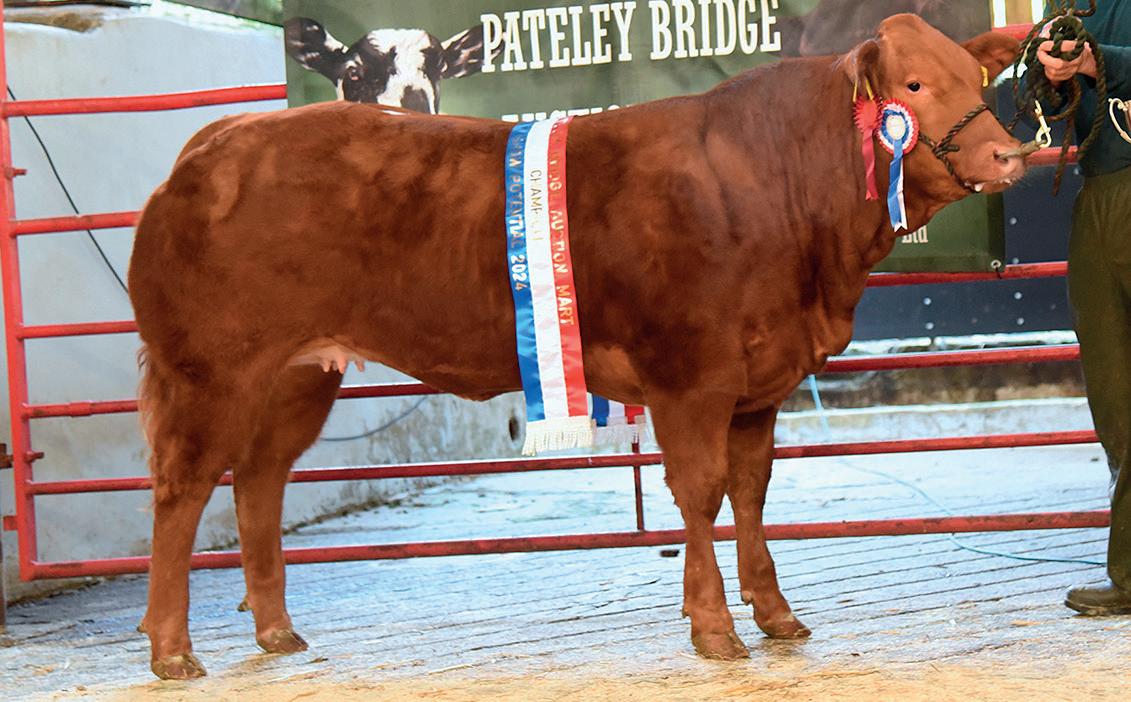
rHeifers sold to an average of £1,578.32
RECORDS were smashed at the Farmers Guardian-sponsored show and sale of show potential cattle at Pateley Bridge by the overall champion, which sold for £7,200.
This was a February 2023-born heifer by the Limousin sire, Gallaber Leo, from K. and J.G. Huck, Austwick, who also topped the same sale last year. The buyer was the judge, James Nisbet, Ayrshire.
Reserve championship went to Twilight, a May 2023-born British Blue cross heifer by Maes Owain, from

To find out where we will be next, go to farmersguardian.com/mth-roadshow
J.C. Walker and Son, Dunsop Bridge, which went on to sell for £3,400 to T. and J. Gratton, Matlock.
Messrs Walker also had the third prize winning Limousin-sired heifer, Maggie May, which made £4,200 to Lowesby Farms, Leicestershire.
The steer champion was Ant, an April 2023-born British Blue cross


by Brennand Jimmy, from Mark and Fee Ewbank, Middlesmoor, which was knocked down to Craig Bentley, Thirsk, for £3,500.
The same vendors also sold the second and third prize winning British Blue-sired heifers for £3,200 and £2,700, respectively.
The reserve champion steer, winner of the Limousin-sired class from Messrs Huck, sold for £1,750.
The unhaltered cattle were judged by Angela Tarry-Smith, Warwickshire, and Louise Todd, Lincolnshire,
with the championship going to a Limousin heifer from E. Townend, Huddersfield, which sold for £4,400 to Lee Hopwood, Staley Bridge.
The reserve was a British Blue heifer from S.A. and T.L. Fawcett, Barden, which made £2,000 to Messrs Swales, Melbourne, York.
AVERAGES
78 steers, £1,464.12; 102 heifers, £1,578.32.
Auctioneers: Barnard Castle and Teesdale Farmers Auction Mart Co.
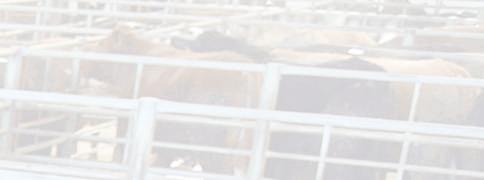



rSteers realise high of £2,500
THE Farmers Guardian-supported show and sale of show potential cattle at Barnard Castle topped at £3,700.
The sale leader was the third prize winning Limousin-sired heifer from J.N. Swinbank, Darlington, shown by Kate Swinbank. By their stock bull, Barrons Lumberjack out of a British Blue cross Limousin cow, it sold to Alan Redpath, Leicestershire.
The haltered calves were judged by Andy Ireland, Ayrshire, who awarded the championship to J.W. Dent and Sons, Lartington, with a British Blue cross heifer by their stock bull, Familer D’Hontoir.
It sold for £3,300 to Mellin and Cropper, Long Preston, who also paid £3,300 for the second prize winning Limousin-sired heifer from R. Hutchinson and Son, Bowes.
Steer
The Dent family also took the reserve overall and steer championship with a British Blue by the same sire, which sold to the judge for £2,400, and the reserve heifer
championship with another British Blue cross, which sold for £2,900 to Messrs Huck, Carnforth.
Limousin-sired Reserve champion steer from T.W. and K. Hutchinson, Forest in Teesdale, was the winner of the Limousin-sired class and made £2,300.
The top price steer at £2,500 was the second prize winning Limousin from K.O. Stones, Marrick, which sold to D. and W. Harrison, Driffield.
Top priced bull at £1,775 was a British Blonde from T. and D.I. Allen and Son, Wolsingham, which was bought by F.S. Kemp, Durham.
The unhaltered section topped at £2,700 for the second prize Limousin heifer from W.D. and B. Thompson, Haltwhistle, which

For the full report from the English Nursery Finals, don’t miss next week’s Farmers Guardian.
start, nursery championship, nursery, novice confined to Cumbria, new handler trial, all dogs to be booked in by 1pm, all first prize nursery dogs over the season qualify for the nursery championship and must be on the field to take part in the ballot at 12.30pm, championship to start at 1pm.
March 3. PENNINE INTERCLUB CHAMPIONSHIP, MoorLodgeFarm,Oakworth,BD220JG,10amstart,
entryclosed,contactCarolMellin,tel:07891871298, catereronsite. March 9. FOUR NATIONS NURSERY FINAL, Slindon HouseFarm,Slindon,Stafford,ST216LX,8amstart, entryclosed,contactGeorgeBonsall,tel:07749298 682,refreshmentsavailable.
March 10. SOUTH YORKSHIRE OPEN, fundraiser fortheEnglishNational2024,LowerEastfield,Sheffield, S357AY,9amstart,enteronfield,entryfee£10perdog.
March 16. LEICESTERSHIRE, AvonValleyFarm, LE176DH,what3wordsfoster.vanish.originals,bythe kindpermissionofFrankandDeeHodgkin,AMandPM sessions,30dogspersession,limitoffourdogsper handlerpersession,thesamedogscanrunineach session,£8perrun,pre-entertoCaileigh,tel:07860 716467,entriesonlyacceptedonreceiptofpayment,

sold to Kevin Ludgate, Bedfordshire, with the first prize winner from the same home making £2,300.
The unhaltered cattle were judged by Ricky Alder, Ponteland, who awarded the championship to a British Blue heifer consigned by F. and M.P. Allinson, Baldersdale, which sold for £2,500 to James Huck, Austwick.
Reserve
Reserve champion was a British Blue steer from R.R. Reay and Sons, Matfen, which was knocked down for £2,200 to Olvia Matten, Thirsk.
AVERAGES
Heifers, £1,482.09; steers, £1,440.09; feeding bulls, £1,391.06.
Auctioneers: Barnard Castle and Teesdale Farmers Auction Mart Co.


The sale saw an impressive turnout.
ifyouchoosetowithdrawyourrunsarefundwill beissuedifwecanfillyourspace,hotandcold cateringwillbeavailablethroughouttheday.
March 2. WIGTOWNSHIRE NURSERY TRIALS, Low BalyettFarm,CairnryanRoad,DG98QL,inter-district nurseryfinals.
March 9. LLWYNBEDW, Llanpumsaint,Carmarthen, SA336JU,8.30amstart,spectatorswelcome. March 23. LLWYNBEDW, Llanpumsaint,Carmarthen, SA336JU,8.30amstart,spectatorswelcome.
ENGLISH NURSERY FINALS, EastcoteHallFarm, Solihull,Birmingham(Judges,A.BlackmoreandJ. Gilman)Nursery(45ran)1,M.Banham(SouthEast)Jon, 159of200;2,R.Mitcheson(Northumberland)Mitch, 142;3,J.Burrow(Windermere)HillsideRoy,138;4,R. Hutchinson(Trawden)Chrissy,137;5,T.Birkett(Fylde) Ben,132OLFD;6,P.Ellis(Windermere)Tip,132;7,S. Mynard(Mid-Shires)Winston,131OLF;8,C.Pickford (Cheshire/Staffordshire)RainowNap,131;9,J.Drinkwater (Northern)Gyp,129OLF;10,J.Drinkwater,Cassie,129. GeorgeBonsallShield,LoganWhistleandCan-amShield forbestOLF,M.Banham,Jon.CrystalFeedsBreeders Cup,R.Mitcheson,Mitch.Sponsorsofthetrialwere GilbertsonandPage,PGNutrition,LoganWhistles,Melton MowbrayMarketandAnimalPhysiotherapyCompany. SLINDON, 1,R.Ellis,Pip,92;2,A.Owen,LlangwmTom, 91;3,T.Longton,Clay,87OLF;4,R.Ellis,Sue,87;5,J. Elkin,KemiBert,85;6,C.Slater,WhiteleyTed,84.



With a reputation for trading quality livestock and a traditional town centre location, Leyburn Auction Mart is the beating heart of the local farming community.
Situated at the gateway to the Yorkshire Dales, it has played an integral role in the local farming community for more than 100 years. As one of a handful of town centre auction marts left in the country, it has remained at its Richmond Road site since its establishment in 1918.
The mart is run by manager and head auctioneer Stephen Walker, who has held the position for 28 years now, alongside junior auctioneer Daniel Watson, company secretary Rachael Simpson, and the board of farmer directors.
The team is also supported by assistant auctioneer William Bramham, who has been a large part of the mart’s success, selling regularly on busy sale days for 40 years.
There are two weekly sales of cast and clean cattle, followed by prime lambs, hoggs and cast sheep on a Wednesday, and rearing calves and stirks each Friday, together with regular sales of store cattle and sheep, breeding cattle and sheep and dairy cattle.
More than 80,000 head of stock has gone under the hammer over recent years, with a turnover of just under £15 million in 2023.
In the latest in our Mart’s the Heart – Auctions: Standing the Test of Time series, supported by the Livestock Auctioneers Association and Shearwell Data, Katie Fallon visits Leyburn Auction Mart.
Often referred to as the mart’s ‘crown jewel’, Leyburn is well known for its rearing calf sales, boasting healthy numbers of buyers and sellers each week.
Mr Walker says it is rare to see fewer than 100 calves at a sale, with regular vendors from the local area and further afield, such as Durham, South Yorkshire and West Yorkshire.
Buyers are also known to travel from all neighbouring counties, Northumberland and the Scottish Borders.
Mr Walker says: “There seems to be something about Leyburn; we have always had a good calf market and it is something we pride ourselves on.”
Alongside the monthly dairy sales, with up to 50 cattle entered in sales in recent months, breeding sheep sales
also take place in autumn, with 3,0004,000 Mule and continental gimmer lambs and shearlings sold annually.
A show and sale of Teeswater sheep, on behalf of the Teeswater Sheep Breeders Association, is also held each year. Mr Walker says the breed’s enthusiasts regularly make the journey from as far as Devon, the Scottish Highlands and Northern Ireland.
The mart has also built a strong reputation for good quality store cattle and, despite the reduction in the national suckler herd, numbers and trade have remained buoyant for quality bred suckler cattle coming out of the Dales. Store cattle sales are held fortnightly between autumn and spring and monthly throughout summer.
Mr Walker says the quality of stock

which goes through the rings is a credit to the local farmers, with buyers known to travel the distance to the mart’s store sales.
He says: “Selling genuine livestock to genuine customers – that is what Leyburn is all about. We have farming families who have sold here for generations and many loyal customers who we look after.
“There is great support from the local area and we welcome any new customers who wish to come our way.”
While there is a clear focus on continuing to trade quality livestock in both the sheep and cattle rings, the mart remains a rural hub, undoubtedly supported by its town centre location.

Sales are always well attended.
Leyburn Auction Mart is the beating heart of the local farming community.



Hosting Young Farmer rallies, an annual carol service for the Royal Agricultural Benevolent Institution and annual dinner dance, Mr Walker says the mart is always available to the local community and organisations.
As one of a few town centre auction marts left in the UK, its location is a large part of the mart’s heritage, a stone’s throw away from where it all began.
Mr Walker says: “The town centre is where it started, when livestock fairs were held in towns in the 1800s, before the gradual transition of livestock being traded by auction.”
While still within the bounds of the town, Mr Walker says the mart
is fortunate to have its two-hectare (five-acre) site, where it can operate well with the rest of the town. The mart’s premises is also home to several associated businesses, including an agricultural merchant, animal feed company and accountants.
Mr Walker says: “The shops and businesses in the town do appreciate we are here and we appreciate them. We all benefit each other.”
The mart’s location also helps to bridge the gap between the farming community and the general public, with the spectacle of livestock sales drawing in holidaymakers and visitors alike.
Mr Walker says: “We often get

holidaymakers coming into the mart. They pop their heads round the door and you can tell they are intrigued by the act of auctioneering.
“It is not unusual for people to come on an annual holiday in the Dales and come to the auction mart every year.”
With the town’s public car park not far from the mart, visitors are often drawn in by the sound of a sale, which Mr Walker hopes may help some of those who are not from farming backgrounds to forge a deeper connection with where their food comes from.
With a focus on keeping their existing customers happy through strong sales of commercial stock, Mr Walker says encouraging the next generation of auctioneers is also key to their future success.
He says: “Daniel is the future, and auctioneering is a skill and a talent which as an industry we need to nurture.”
Having been at the mart as junior auctioneer for the last two years, and halfway through completing a live-




■ Stephen Walker: Manager andheadauctioneer,sellingstore cattle,storeandbreedingsheep, dairycattleandcalves
■ Daniel Watson: Junior auctioneer,sellingstorecattle,store andbreedingsheepandcalves
■ William Bramham: Assistant auctioneer,sellingstorecattle andcalves
■ Rachael Simpson: Company secretary
■ Wednesday (weekly): Cast andcleancattle,followedbyprime lambs,hoggsandcastsheep
■ Friday (weekly): Rearing calvesandstirks
■ Friday (fortnightly): Store cattle,feedingbulls,beefbreeding cattleandstoresheep
■ Friday (in autumn): Muleand continentalgimmershearlingsand lambs,Swaledalebreedingsheep andpedigreeTeeswatersheep
stock market operations and management course at Harper Adams University, Daniel regularly sells store cattle, store lambs and breeding sheep, as well as undertaking general duties of sale organisation and canvasing.
Looking to the future at Leyburn Auction Mart, Mr Walker says: “We are focused on keeping those established sales healthy going forwards; those two sales twice a week, every week. They are our bread and butter.
“We are fortunate we have a lot of good customers and a lot of good farmers producing quality stock in the local area. It is a credit to the local farmers.”
There seems to be something about Leyburn; we have always had a good calf market and it is something we pride ourselves on STEPHEN WALKER
 Edited by Emily Ashworth
Edited by Emily Ashworth
Two key aims for the industry are to help those already in farming thrive and encouraging new talent from outside the sector. This special focuses on leadership, opening doors to new faces and working towards a more inclusive future.By Emily Ashworth
Last year farming champion and TV personality Kaleb Cooper launched his very own bursary to help youngsters from non-agricultural backgrounds get a step up in the industry.
In association with the Royal Agricultural University (RAU), two lucky students were picked and now get the chance to work alongside the
Clarkson’s Farm star on a placement, as well as receiving a £3,000 bursary.
Caitlin Oxton and Caitlyn Bartlett are both from non-farming back-
grounds. Caitlin is in her second year at RAU studying applied farm management, while Caitlyn is in her first year studying agriculture.
Both are keen to make their mark in the industry, and there is no doubt that with support from Kaleb and his array of contacts, they will do just that.
Having built up a good amount of experience over the years, Caitlin recalls that taking the first step was the hardest.
were in the industry when I first started out working in poultry. In the last couple of years, we have done a lot in terms of women in agriculture.
“It is not as hard to get into the industry as it was 20 years ago.”
Kaleb is from a non-farming background and has somewhat made it his mission to speak up about the variety of careers within the sector.
He hopes to give others the chance to experience it.

































































She says: “There are a few obstacles, as you are going in with no knowledge, whereas others know what they are doing. It is a bit of a catch-up.




















“The first step is the hardest, when they are throwing everything at you. But it is all possible with the right people around you.”




































Both are interested in agronomy, but they both say that getting experience in other areas, such as livestock, is essential, especially when it comes to learning vital skills, such as tractor driving.
He says: “Farming is who I am. Encouraging the younger generation into agriculture has always been so important to me. I feel lucky that I knew my path from such an early age and want to help spread that passion and drive. Launching this bursary means so much, as it can support students who want to pursue an agricultural career or who might be struggling to get into farming.





























Having come into the industry with no prior exposure though, what have they since learned?
Caitlyn says: “I was surprised – and reassured – to see how many women
“Having come from a non-farming background, I believe agriculture can be for anybody. I know there is so much potential for young people to have brilliant careers in agriculture.
“It should be open to all and espe-



























To hear the interview with Caitlin and Caitlyn, scan the QR code:

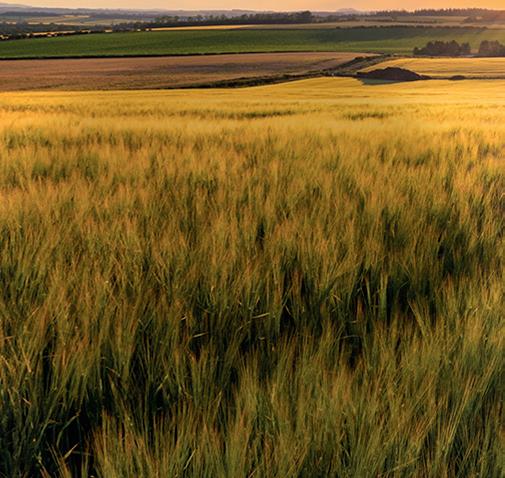
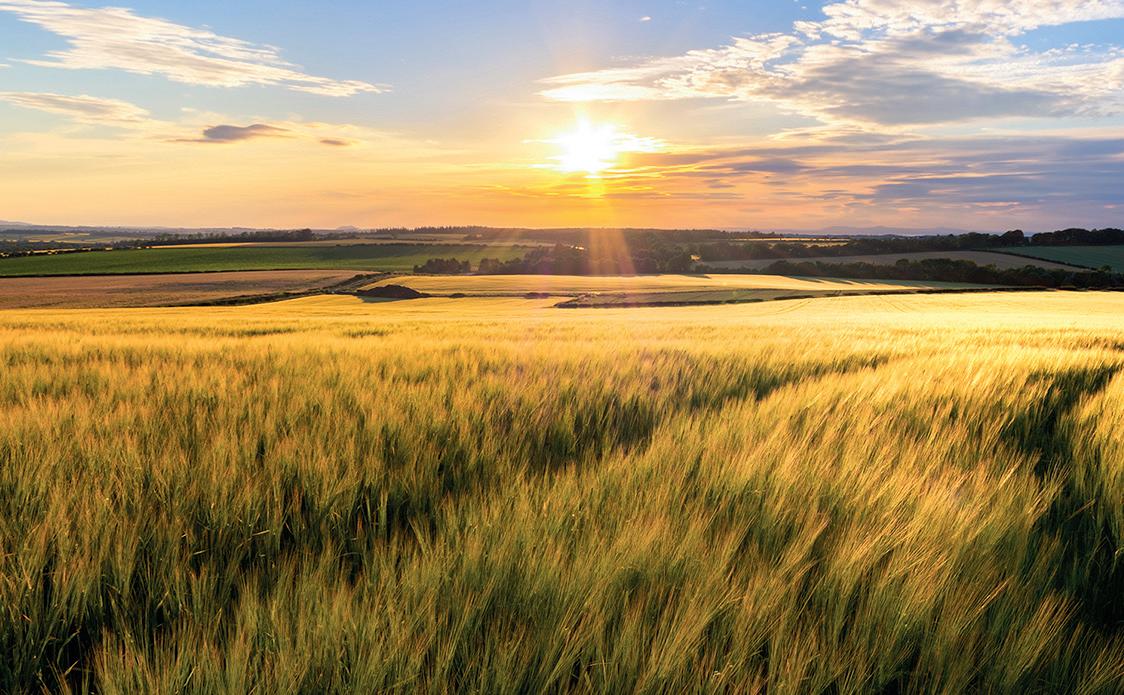

cially those who have financial difficulties or are completely new to farming.”
Caitlin has one year left at RAU, and her placement with Kaleb starts this month. She will split it into two, working half of it alongside Kaleb and hoping to be able to use the other half to explore the agronomy sector, utilising Kaleb’s contacts. Over the next year, she is looking forward to graduating and has a job to go home to working on a dairy and arable farm before the new term starts. She is, however, taking all she can from this experience.

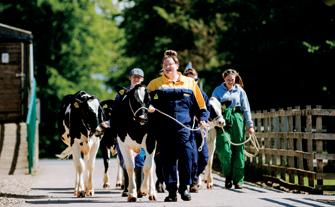

Whether you are looking to start in the agricultural industry or are looking to build on what you already have, there is help out there.
She says: “I thought there would be so many people who apply for [the bursary] and luckily I ended up getting it.
“I am starting to set myself up for [life] post-university. Having those contacts and Kaleb himself, it will help in the future. It is the exposure of it all.
“I just want to see what everything ends up being and see how what we are doing now develops. Things can change, but that is quite exciting.”

Caitlyn has two years left, but she hopes to get out there and gain some hands-on in-field experience. She feels it is quite hard to get work experience in agronomy.
She says: “There are not many firms which will let you shadow them, so you do not want to get further down the line to realise this is not where you want to be.
“[This] is an amazing opportunity he has given us both, especially the placement. It will open doors and give me the chance to do something I
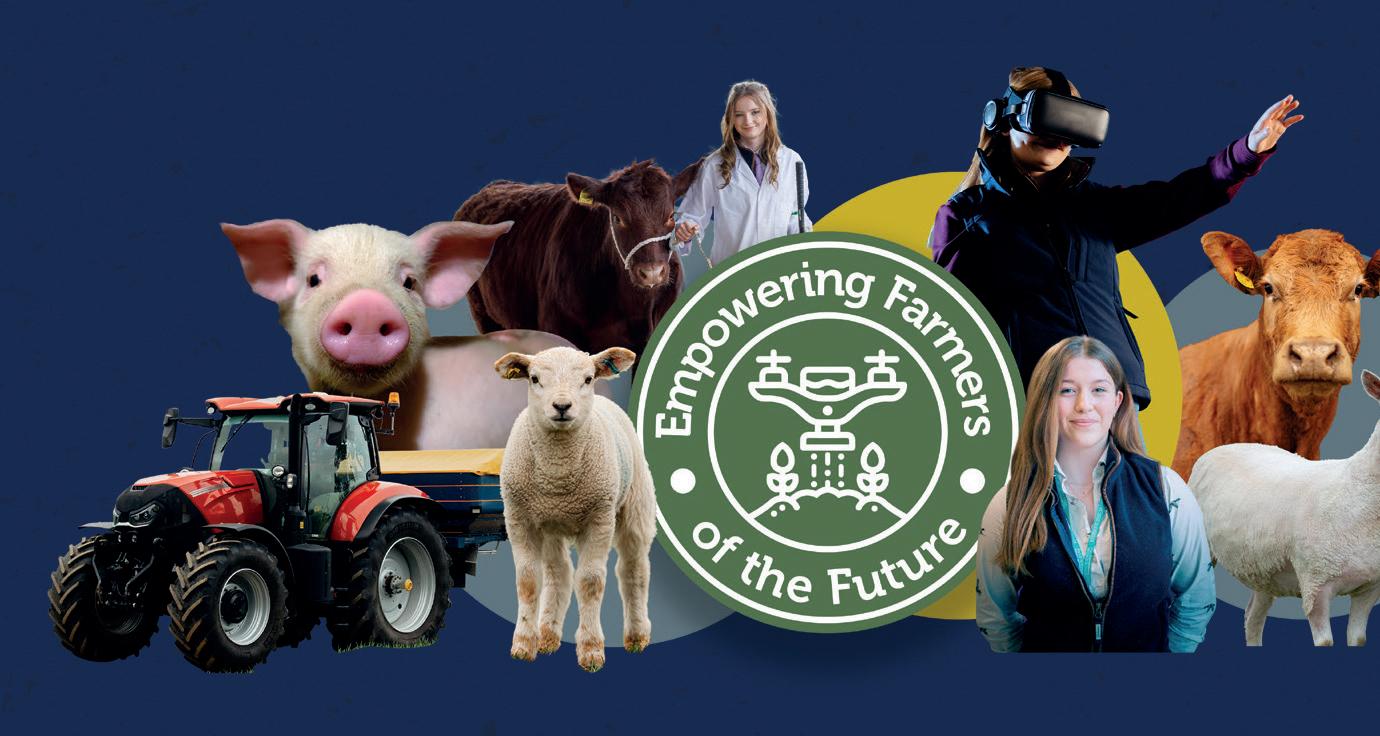


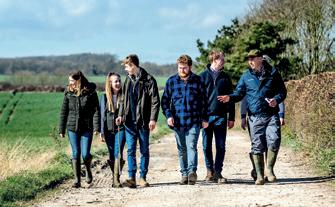



36 MIKE DUXBURY
TheBlindFarmer talksaboutdiversity
38 BUILDING BUSINESS
HenryPlumbFoundation supportingyoungsters
40 TRAINING
DawnMeatsoffering leadershipprogramme
40 ROOTS TO REGEN
Makingpractices profitable
41 CONFIDENCE
KeytoolsfromWomen inFoodandFarming
42 Q&As
TwoNuffieldScholars
would not be able to do in a different sector in the industry.
“After I have done [my placement], I am interested to see if my path changes. It will still be in farming, but perhaps I will prefer livestock.”




QWhat do you feel are the main barriers when it comes to welcoming people into agriculture?
AI think the main barrier is the perception of disabled people’s capabilities; an assumption that because they have a disability they do not have the intelligence or skill levels to work within this or any industry.
Inherited rights and social standing are also barriers. Having money or being born into an agricultural family should not be the only in-road.
It should be accessible to all, from any walk of life, like any other industry.
QWhat needs to change about farming’s message in order to attract a wider talent pool?
AI do not see the message as being the issue. We are in a world now where action demonstrates the true inspiration within the industry.
A lot of companies have talked about diversity for a long time, but it is usually around practices rather than people. For example, how can a farm make money from the land, rather than how can the industry be better enriched by non-agricultural people, including those from diverse groups?
In this Q&A, Farmers Guardian speaks to Mike Duxbury, the blind farmer who established the Inclusive Farm, about how he wants to open farming’s doors to all.
I also feel there is difficulty in understanding what true diversity and inclusion means. Again, it is not the message, but how it is being perceived.
QIs sharing stories enough? How do we push this further, such as getting farming onto the curriculum or highlighting this to the Government?
AFeel-good stories in the media have a very short shelf life. We need to start working with educators, teachers and parents to involve students at the right age, when they are making their career decisions.


Plus, agricultural colleges need to be more open to diversity and inclusion. It would be desirable to have a national programme and commitment that they all sign up to, to ensure all people have a fair chance of entering and participating in the agricultural training system.
Articles in newspapers and magazines have their place, but deep-rooted cultural change needs to happen.
QWhat/who helped you when you were starting out? And has this shaped how you work now in terms of getting people into agriculture?
AMy love of agriculture while working alongside my father helped me live my dream. My drive and determination was encouraged by my father and forward-thinking people from Warwickshire College of Agriculture, who gave me an opportunity to go to their educational establishment when I was rejected by every other college. They allowed me to be myself and develop and learn the same as any other student, allowing me to find my own way of learning and working in a sighted world.
QWhat would your advice to others be? And how can the industry start working towards a more inclusive future?
AFirstly, always follow your dream, challenge rejection and be the best you can be. The industry must learn the true meaning of diversity and inclusion in people.
As an industry, it must also recognise its own prejudice and learn to not be afraid of people with differences, or those from different backgrounds, but embrace diversity to enrich, educate and nurture better business and a more sustainable future for all.
QDo you have any insight from those outside the industry –any specific examples from people who thought agriculture was not for them and how you have helped to change that?
AA lot of people believe that farming is tough, insular and does not

embrace outsiders at all – a career to be born or bought into. Money and bigotry are both huge factors denying outside blood into farming. This discourages a lot of people, especially if they have a disability or difference.
However, since I built the Inclusive Farm, there has been a huge uprising in those who see a potential for themselves coming into agriculture.
We have a young lady coming from France to stay for three weeks, who wants a career path in agriculture and believed she could not take this path until she saw our farm.
While I do not want to make it all about myself and my project, we have tackled the project head on and challenged big businesses and organisations into questioning their own policies and attitudes to diversity and inclusion. We all, as a nation and as human beings, need to be open and accepting of other people’s differences.
Q What is your main mission if you were to sum it up in one sentence?
A My mission is to bring organisations together from business, education, Government and influential bodies to collaborate in creating a national policy and programme for learners with differences.

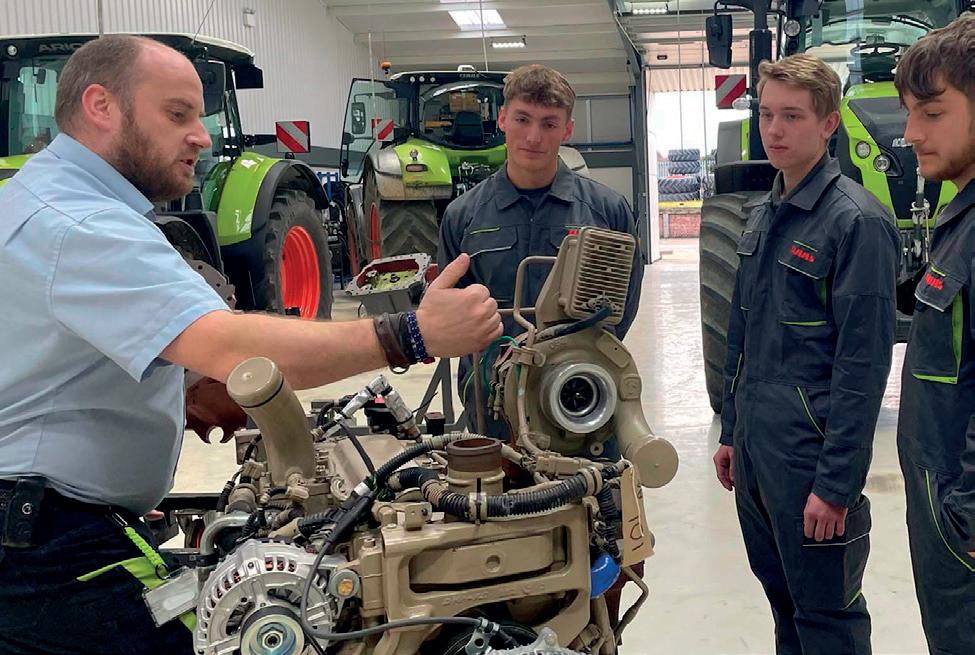

This is a great time to consider an Apprenticeship with CLAAS UK, with the need for skilled people within the agricultural industry rising as technology continues to advance.
Our forward thinking dealers recognise the need to provide practical experience to a new workforce, alongside a structured learning programme and our CLAAS Apprenticeship Scheme provides the perfect platform to do this.
•Gain a Level 3 Land-Based Service Engineering Technician Quali cation
•Be trained by industry-leading specialist CLAAS instructors
•Employed and based at your local CLAAS Dealership
Scan the QR code to nd out more about the apprenticeship programme.
•4-year apprenticeship programme
• Attend the award-winning CLAAS Academy in Saxham for block release training for 9 weeks per year
•Access to latest technology and machinery
Want to know more about
CLAAS and our dealerships? Visit claas.co.uk
The Henry Plumb Foundation was established in 2012 to support and help young people get started in the food and farming industry. Emily Ashworth reports.
Founded by the late Lord Henry Plumb, a wellknown farmer and politician, the mission was to establish a lasting legacy in the industry and invited a group of his friends to become the trustees of The Henry Plumb Foundation.
The foundation has since helped a large number of young people in farming, and one of its key differences is the support of pairing scholars up with mentors.
Each successful scholar is allocated a mentor who has knowledge of the business and sector of the mentee – others are sometimes
brought in to provide special help where a mentor has identified a need.
Bursary
Successful applicants receive a bursary of up to £4,000. It is open to donations from individuals and organisations who wish to provide tangible support for the work of the foundation and hosts its own fundraising events.
Lord Plumb was a respected voice in farming, having been an avid supporter of Young Farmers’ Clubs and a former leader of the NFU, to name but a few of his roles.
In honour of this, the foundation


also assists individuals who wish to become communicators and future leaders. In these cases, alongside an allocated mentor, the scholar will also receive support from, for example, a small team.
During the time the organisation has been in place, about 150 young people have been assisted with their ambitions to enter the world of food and farming, while others already a part of it have been able to grow their enterprises due to its support. Some of these have been helped financially while others with adequate funding have benefited from the allocation of a suitable mentor.
The Henry Plumb Foundation continues on its mission to help young people on their journeys,
 Lord Henry Plumb
Lord Henry Plumb
and alongside the monetary support, it is its mentor scheme which remains at the heart of all it does.


AS a current mentor to Josh Teal (see panel, p39), David Christensen is keen to highlight that as much as he is here to steer and support Josh, he also gets much out of the experience.
He says: “It is a great initiative –pairing up established farmers with young guns really is helpful.
“The combination of access to finance, life advice, technical

We are so busy we get stuck in our day jobs and forget to lift our heads above the parapet. You do not think about what problems these new entrants are up against DAVID CHRISTENSEN
advice and business advice is the perfect combination. They can learn from our mistakes, but we have also gone on to have successful businesses, so it is about taking advantage of that.
“And it works both ways: You have me, who has been around for a long time, and it forces you to rethink. We are so busy we get stuck in our day jobs and forget to lift our heads above the parapet. You do not think about what problems these new entrants are up against.
“It helps in my other representative roles too and you can ask, is what we are proposing working for the new guys?”
An established dairy farmer from Oxfordshire, this is the second time David has been a mentor, but for him, he is keen to reiterate that his support goes beyond his official time to mentor the chosen scholar.
“This is what farming is, you make contacts and friends, and Josh can ring me in five years’ time – it is an ongoing relationship,” adds David.
The next closing date for scholar applications is March 21. If you are aged 18-35 and have an idea or are in the early stages of developing your plan, visit: thehenryplumbfoundation.org.uk
HAVING grown up enjoying time on his grandfather’s smallholding in Oxford, Josh Teal caught the farming bug quite early.
He went on to study a level two diploma in agriculture at Moreton Morrell College, and the 24-yearold now works as a herd manager on a beef farm in Bicester.
Working for someone else though, he says, gave him the drive to start his own small herd of cattle.
“I had a few cattle at my grandpa’s,” he says.
“Then some grazing ground came up for rent, so I bought some to put to grass.”
To make it work, though, Josh needed to build numbers, and after coming across The Henry Plumb Foundation, he was able to fund his small business venture and access support from his chosen mentor – and fellow Oxfordshire farmer – David Christensen, who sits on the board of representatives for Arla and is a regional advisory board member

for the Midlands region of NFU Mutual.
“We get on so well,” says Josh.
“He advised me what to buy, what not to do and to have someone who knows about prices is great.
“We spoke about how I can maximise profits with a low input system, grass management and paddock grazing.
“It gave me the push I needed to go at it a bit more. Before it was more like a hobby, and I have gone from 10 cattle to 50.”
With a mix of Aberdeen-Angus, British Blues and Herefords, the ultimate dream is to find a tenancy and build his own farm business up.
He says that finding somewhere to keep the cattle and access to grazing have been the biggest barriers, but he has been able to monetise his small herd with the guidance, support and funding from the foundation.












At the beginning of the year, Dawn Meats announced the return of its Management Development Programme run in association with University College Dublin (UCD).
Open to employees of Dawn Meats and Dunbia, a subsidiary of Dawn Meats, it has been operating in partnership with UCD since 2015. Covid19, however, disrupted the programme, and after three years it is now back.
More than 100 have completed the programme, which is designed to help managers address the global challenges facing the agri-food industry, such as economic and environmental sustainability, while helping to develop skills in leadership, communications and professional networking.
Academic modules are taught by leaders in the field of management and sustainability in the food industry, as well as members of the Dawn Meats and Dunbia leadership teams.
Niall Browne, chief executive of
Dawn Meats, says: “This is a fantastic opportunity for those working in our business and we are delighted to announce its return.
“It is important for us to develop the leaders and managers of the future and help them learn the skills they will need to maximise their own potential. There are many challenges in the agri-food industry, and we want to make sure we have the people with the ability and the know-how to rise to them.”
Gary Rowland, Dunbia’s group learning and development manager, believes there is also a lack of awareness of the opportunities available, and that there is a ‘disconnect between the food on a plate and how it got there’.
He says: “Whether your interests lie in the sciences, humanities or data analysis, or you prefer a more hands on approach than strategising, all those interests and preferences are catered for.





Lantra has developed an Agriculture Apprenticeship Toolkit designed to help guide farmers through the process of hiring an apprentice.
We hope with this support we can help bring more young adults from non-farming backgrounds into the industry, and help pave the way for the next generation through mentorship from industry professionals.

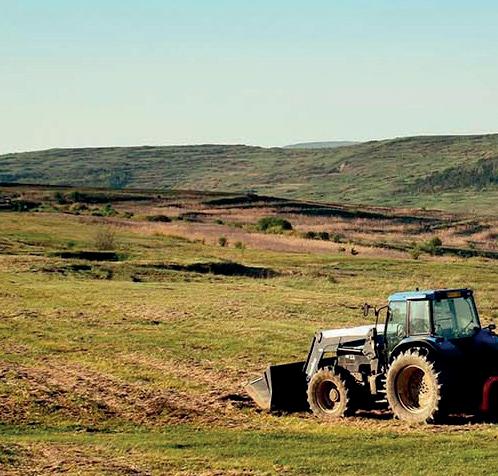
www.lantra.co.uk


“However, a career in farming and the agri-food industry does require a level of resilience as it often involves unsociable hours and, depending on the role, some level of physical labour and these can be viewed unfavourably compared to other industries. Education plays a key role.
“We need to encourage learning about the food chain and where food comes from. As a business, it is imperative that we look to adapt our practices to enable school leavers to come in and gain exposure to parts of the industry they may not have thought about,” he adds.
WITH increased interest in lowering input costs and farming in a naturefriendly way, a new course claims to personalise the transition between conventional and regenerative systems.
The year-long ‘Roots to Regeneration’ programme is a collaboration of Planton Farms and Roots of Nature, bringing together the experiences and knowledge from both the director of Roots of Nature and regenerative agriculture consultant Caroline Grindrod and co-founder of Planton Farms, Clare Hill.
Clare says there are often many needs to match up when trying to implement new practices within a farming business, such as contract restrictions and finances, and it can often be challenging to implement a ‘onesize-fits-all’ regeneration strategy.
She says: “The key difference with the Roots to Regeneration course, when comparing it to many others, is that it is a 12-month learning journey.
“Support is readily offered to make changes while encouraging participants to ‘step back’ and identify key questions such as, what regenerative outcomes they are looking for? What do they enjoy? What do they want to do more of? Then with these answers, we are able to design systems for individual farms and farmers, rather than use practices copied straight from other farms.”
By the end of the 12 months, she says participants will have gained an in-depth knowledge of regenerative farming principles, hands-on implementation skills, and a collaborative community to further their journey as leaders in agriculture.
“We want participants to be able to leave with confidence and understanding of what regenerative outcomes they are trying to achieve, and how they might then make these changes that are right for them and their farm,” she says.
The first cohort starts on March 5, with the hope of running at least one course per year, increasing as the interest rises.
She adds: “I like to ask potential participants how much they spent on fertiliser, animal feeds and external inputs that are outside of their control.
“The programme should be seen as an investment and could easily be written off within five to 10 years with suitable cost savings.
“This course will set off a path for a farming journey that includes a lower-cost system.
“This year we secured multiple grant funders for 50 per cent of the course price making it much cheaper for participants, we are hoping to continue more funding as we progress.”
Recognising your own and other people’s strengths to become a good leader and building self-confidence were highlighted at a LAMMA event focusing on women in agriculture. The Women in Food and Farming network is an organisation which supports women in the industry and provides valuable networking and knowledge sharing opportunities.
The panel discussion on January 17 was chaired by Emily Norton of Norton’s Dairy. She was joined by: Beverly Dixon, of Haygrove and HR director of G’s; Jacqui Green of the British Growers Association and Viridis Associates; Rosie Bryson of Crop Health and Protection; Christine Tacon, of MDS, BBC Rural Affairs Committee and chair of Red Tractor; and Tess Howe of The Institute for Agriculture and Horticulture.


The Women in Food and Farming discussion at LAMMA 2024 offered career inspiration. Emily Ashworth reports.
■ Womenbringdifferentskillsto thetable;utiliseyourdifferences
■ Alignedpurposesarekeyin teamworkandmanagementroles
■ Bethebestleaderyoucanbeand gettoknowwhoyouaremanaging;
remembernoteveryoneisthesame
■ Journalwhatgoeswellandask yourselfwhatimpactithad
■ Giveyourselflittlechallenges; theseprovideyouwithsmallwins andpushyouforwards
Support the workforce of the future by sharing your expertise with City & Guilds





■ Co-operation;bepartofthechange whichalterstheculture;collaboration iskey
■ Startaskingthefirstquestion; whenoutatconferencesorina group,oncesomeoneelsespeaks
up,itgivesyoutheconfidenceto,but whynotbethefirstpersontotalk?
■ Notmanypeoplearenaturally confident;thistakestimeand requiresyoutopushyourself outofyourcomfortzone
There’s a growing need for employers and industry members to get more involved in the development and review of technical qualifications.
We are keen to engage with industry members and work together to create technical qualifications for the land-based sector that are robust and fit for purpose.
There are a number of ways in which you can support us:
•
•
Join our Employer Industry Boards to discuss skills, training and qualifications
Review qualification content as we develop new qualifications and review existing ones
Become an associate, in a role such as a moderator or examiner

These opportunities are flexible and work alongside your other commitments.


Each provides excellent professional development opportunities and will help drive standards for future generations.

For more information visit: cityandguilds.com/tlevels/employers or contact Jackie Hough at Jackie.Hough@cityandguilds.com
Liz Haines, a dairy farmer based in Staffordshire, and Dan Smith, who manages Jamie’s Farm, are both Nuffield Scholars for 2024. What do they hope to acheive?

 Liz Haines
Liz Haines
QYour research is titled ‘Neurodiversity in agriculture’; what do you hope to achieve?
AI would like to start the conversation about neurodiversity –including dyslexia, ADHD and autism – in agriculture. If we hope to attract more people into agriculture, then we need to do all we can to ensure that it is a welcoming and inclusive industry.
However, it is not just about bringing a wider group of people to the table; we need to be doing all that we can to ensure they can share their ideas, achieve their potential and thrive.
AQWhat does a diverse workforce mean for the future of farming?
To push the boundaries of what is possible and move the industry forward, I believe we need fresh ideas. If we carry on working in the same echo chambers, then we will get the same answers. Instead, we need to be focusing on what we can do to bring in new perspectives, and how we can work together effectively to come up with answers.
A fantastic example of this is Dr Temple Grandin, an animal science professor and leading expert on humane animal handling.
Dr Grandin has a form of autism which allows her to perceive the world differently and create revolutionary systems for livestock handling.
AQWhere did the idea for this research come from?
In my experience, neurodiversity is common in agriculture –perhaps even more so than other industries – but it is not something that is talked about.
As an employer, I believe we have a duty of care to support the needs of those working for us. Ultimately, if we support our team effectively, then we are far more likely to have a successful business.
QWould you encourage farmers to look at a wider talent pool when it comes to hiring?
A
We all know that agriculture has challenges around recruitment, so we must widen the net. In my experience, we have taken on team members who do not have any agricultural experience, but their enthusiasm and lack of preconceptions have made them brilliant to work with. It comes down to investing time in training and communicating effectively.
Q Why did you decide to apply for a Nuffield Scholarship?
AI see huge value in challenge and development, and it is something I encourage in others, so I would feel hypocritical to not push myself. I am also a great believer in helping others and the scholarship creates opportunities to do this on a global scale.
As someone who entered the industry without any qualifications, and often suffers from imposter syndrome, I am also able to complete a Postgraduate Diploma by accrediting my Nuffield report.
AQWhere has your passion for this research topic come from?
In my role, I am privileged to have daily conversations with the brilliant and capable young people who we have working on the farm. I am passionate about championing those who are often dismissed - given the right support and guidance, many of them could prove to be huge assets to our sector.
I am also hugely proud of our regenerative farming methods and
the positive effect we are having as land custodians. This often ignites passion in others who visit, and I see this energy as a vehicle for change.
Q How do you hope your research can change the industry?
A I intend to identify the barriers young people face and how they view the agricultural industry and combine this with knowledge and learnings from organisations, farmers and educators who are already doing great work.
My aim is to share knowledge and encourage a bright future for the sector and those who work in it. It is a hugely complex issue that other industries are working hard to develop strategies around, so it is important agriculture does not miss its opportunity.
Q What must we do to get more people into the industry?
A Firstly, we must recognise there is an issue, take responsibility and collaborate. As an industry, we are proud of our daily contribution to the lives of others, so: celebrate our profession, engage with the future and inspire where possible.
I am at the beginning of my study, but I have been able to speak to lots of incredible people who are making progress in this area. We are moving in the right direction, so we need to keep the momentum going.




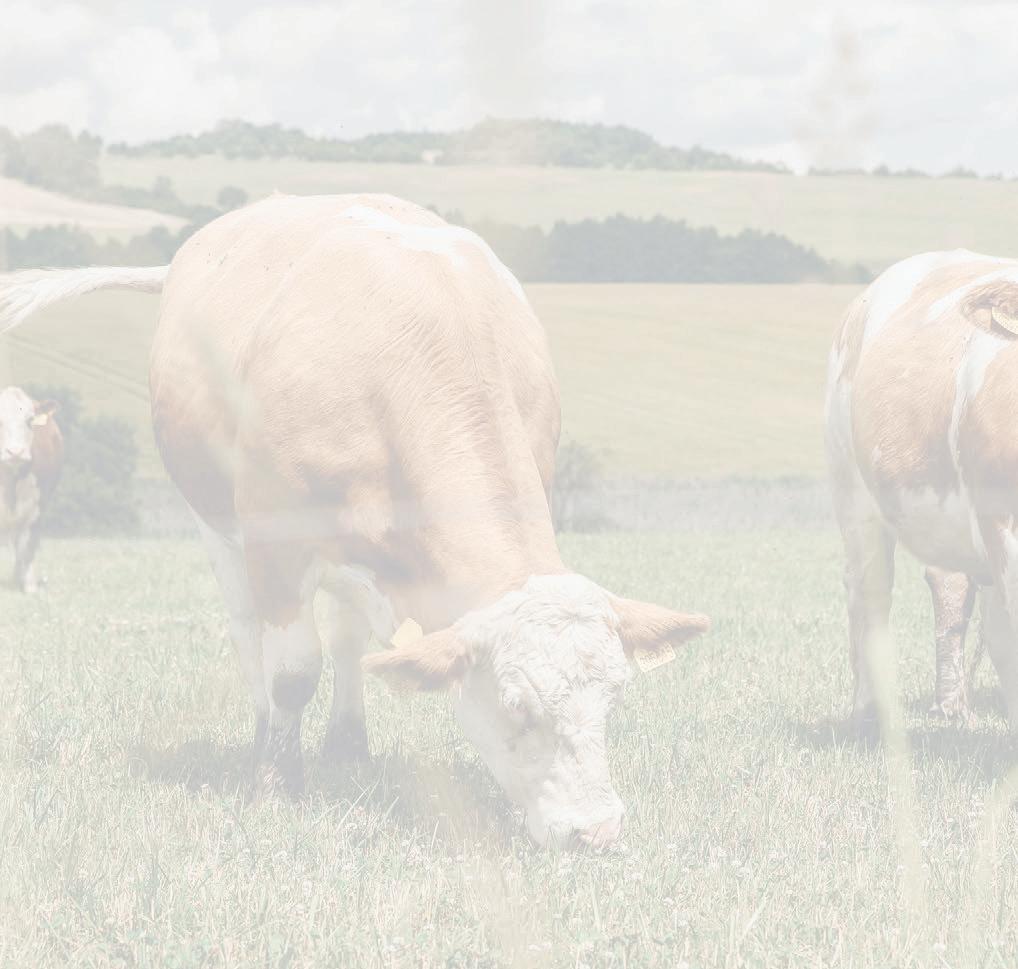
DLF is the world’s largest producer of grass and clover seed and has a comprehensive portfolio of associated products.
As part of DLF’s succession planning, a rare opportunity has arisen for an Agricultural Business Manager
join our Sales Team in Scotland and the North.
The ideal candidate will likely have a successful background in agriculture combined with good technical knowledge of farming practice. An attractive benefits package to include a company car, pension, bonus, and competitive salary is on offer to the right candidate.
Closing date: 28th March 2024
Please send all applications to victoria.wraight@dlf.com
Scan the QR Code for more details.




A 2,000Ha family run agricultural business in the Northeast of Scotland, farmed by an extensive range of agriculture machinery and equipment.
The candidate must hold strong people management skills to lead a permanent team of 10, as well as seasonal staff.
The successful candidate should have experience, knowledge and a strong interest in large scale arable farm management. Including mechanical planting, harvesting, irrigating, cultivating and storage of our farming enterprise produce including grain, potatoes, and bulbs. They should have enthusiasm to address future challenges and suggest and implement modern farming methods and technology to constantly better the business.
Responsible for planning crop rotations, and the purchase of farm inputs and sale of farm produce.
The candidate will be forward thinking and hold good problemsolving skills.
Full driving licence, agriculture machinery and basic maintenance experience is essential.
Ensure health & safety compliance and create a positive H&S culture. A competitive package will be offered dependant on experience, company vehicle and family home are available for the right candidate. Flexible working hours and patterns dependant on busy periods. To apply, please send your CV to Serena@slainspark.com.
John I Forbes & Partner, Slains Park Farm, Kinneff, Angus, DD10 0SY.


We are looking for a Head Stockperson to be responsible for the day to day running of our beef suckler herd and cattle fattening enterprises.
You will be experienced with the general husbandry of cattle including calving, feeding, animal health and breeding.
We are currently running 180 Suckler cows, mainly Limousin but with some Shorthorn and Angus cross cows. The farm is usually carrying upwards of 400 head of cattle. The enterprise is well resourced with excellent stock, modern buildings and good handling facilities.
Based in Hampshire, we are a mixed farming Estate totalling 1870 acres. We are committed to a sustainable farming system with the livestock enterprises being key to the long-term future of the Estate
The herd was Reserve Champion in 2022 Limousin Society National Commercial Herd competition.
This is a genuine career opportunity for the right person.
We are offering a generous relocation allowance with a Salary and benefits package commensurate with the importance of the role which includes a rent free modern 3 bedroom house on the Estate.
Please submit your CV and covering letter to:office@strattonsfarms.com






Agriconnect is a business unit within the Arc network, a global events, data, and media platform. Arc is a fast-growing global events, data, and media platform with a varied portfolio content led portals, magazines, and events.
Since 1844, the brands of Agriconnect have been the trusted source of information for farmers and with brands like Farmers Guardian, events, like LAMMA and Farm Business Innovation, and digital platforms, like FG Insights, Agriconnect continues to bring together the British farming community.
THE ROLE:
• We are now looking for a motivated and driven salesperson to join our Sales team.
• The main function of the role is to develop business through growth in revenue, yield, and to increase customer numbers. You will be required to identify new opportunities and influence companies’ media buying habits within the agricultural sector. Due to the ever-changing nature of the industry, this person will have the ability to spot new avenues and exploit market trends.
• Hours: 35 hours per week – Mon – Fri
• Location: Preston – temporary hybrid remote
• Salary: Competitive, dependant on experience.
• Own, support and fully develop specific market sectors
• Conduct sales presentations by telephone, email or face to face to existing and prospective clients in order to develop existing business and generate new business wherever possible.
• Advise existing and new customers on the most effective solution to meet client needs within the Agriconnect portfolio.
• Continually seek and develop new sales & opportunities.
• Ability to accurately forecast future sales
• Keep abreast of all current trends, activities and relevant news within agriculture and specific sector
• An interest in agriculture
• Highly motivated & driven, with an ability to meet ambitious performance goals
• Be enthusiastic and motivated to continually explore new opportunities, whilst possessing a natural inquisitive nature
• Excellent communication written and interpersonal skills
We offer an excellent package including:
• A competitive basic salary
• 25 days holiday increasing to 27 after two years
• An extra day off on your birthday
• Free life assurance
• Contributory pension scheme
• Employee assistance programme
Arc has ambitious plans for growth, and this is an opportunity to be part of our continuing success story whilst enjoying a fabulous work/life balance. We strive to create a culture that is open and respectful, where differences are valued and celebrated. We want everyone to be able to reach their full potential, so we are committed to cultivating a company that promotes inclusion and belonging.
To apply for this role, please email amber.tabiner@agriconnect.com



Salary - £34,000 - £40,000 per annum, plus benefits Closing date - 22 Mar 2024
An exciting opportunity has arisen for an Senior Herdsperson to join our team because we are taking on a second dairy farm tenancy in the spring as a joint venture with our current 2I-c. In Exeter.
Our farm Our farm is 153ha; we are a spring-block calving unit milking 300 grass-based cows in a 24/48 parlour. The cows are all NZ breeding, mainly Friesian cross Jersey and all our dairy replacements are reared on the farm. We also pasteurise and sell milk through a vending machine. We are 1 of 5 farms involved in an exciting 3-year project with LEAF, which is designed to develop and implement a range of sustainable integrated farming practices suited to our farm, overall addressing net zero and environmental enhancement. We are also Farmers Weekly Transition Farmers, sharing our experiences with methods to make our farm more sustainable for the future.
Your Role - As a Senior Herdsperson, you will be working closely with the business owners in the day-to-day running of the dairy herd. We fully expect someone to grow into this role as we teach the skills you require. One of the business owners is a farm vet and does regular focused learning sessions on different aspects throughout the year; staff are also sent on courses when required to support you and the farm’s progression.
You - We are looking for someone with a cheery nature and a love of cows to work with us to continue to take the farm forward. You’ll have good experience in dairy farming. Training will be given where necessary, but your values and behaviours are more important than your experience, and we are always happy to listen to new ideas!
The Benefits - In return, we can offer a 2-bedroom lodge with a garden, with a competitive salary depending on experience and a genuine commitment to your ongoing development and future in dairy farming.
• Company pension
• Housing allowance
• Free parking
• On-site parking
• Relocation assistance
For more information on any of these vacancies or to see all our current roles, please go to:
JobsInAgriculture.com





Field Service Engineer
RVW Pugh Group is a well-established agricultural dealer with over 40 years of experience. We supply an extensive range of Agricultural and Machinery across Shropshire, Cheshire, and Mid Wales.
The Group is made up of TR Machinery (selling the Fendt brand) and RVW Pugh (selling the Massey Ferguson brand).
Our leading franchises are Massey Ferguson, Fendt, Merlo, Teagle, plus many other leading brands.
With RVW Pugh Group’s continuing growth, we seek Agricultural Service Technicians to join our busy teams based at either Churchstoke on the Powys/Shropshire border, Holmes Chapel in Cheshire or our new depot in Newport Shropshire that is opening soon
ESSENTIAL DUTIES AND RESPONSIBILITIES
• Perform diagnostics and repairs on agricultural equipment in a workshop and/or field environment.
• Complete all reports and administration required in a timely manner and to a high quality (job cards).
• Follow all safety rules and regulations. Complete all training programs to further develop skills and knowledge. Maintain a clean work environment, and assists with overall workshop organisation
ESSENTIAL SKILLS, QUALIFICATIONS & EXPERIENCE
• Experience performing service repairs.
• Ability to perform repairs and maintenance using correct tools and equi ment, following approved techniques.
• Proficient knowledge of mechanical, electrical, and hydraulic systems.
• Ability to use standard computer applications, internet, and manufacturer service portals.
• Ability to operate vehicles and equipment used for diagnostic purposes.
• Good customer service skills.
• Familiar with manufacturer’s products.
• Ability to work well in a team environment.
• A full, clean driving license is essential for field roles.
• Ability to work extended hours and weekends on a rota basis
FOR THE SUCCESSFUL CANDIDATE, WE OFFER THE FOLLOWING:
• Stable working environment
• The opportunity to work as part of a well-established friendly team
• Van, laptop, and phone all provided
• Ongoing training
• Workwear provided
For more information on any of these vacancies or to see all our current roles, please go to: JobsInAgriculture.com

Our client - a respected and exciting UAE based biotech company is seeking a highly skilled, highly motivated and highly experienced individual to join their senior team as commercial manager. The well funded and resourced company is a leading specialist in snake and scorpion venom extraction and the production of peptides, toxins, enzymes and proteins derived from venom. With a core set of values and strong vision, the business aims to be at the leading edge in their sector through utilising technology, having exceptional management at all levels and by being agile and adaptable to the demands of the market.
As Commercial Manager you will be responsible for leading and executing the sales and marketing strategies for the company and the role requires a deep understanding of the pharmaceutical and biotech industries coupled with excellent communication skills and a track record of commercialisation and business development.
Location: United Arab Emirates (AE)
Closes: 15 Mar 2024
Job Sector: Dairy
Contract Type: Permanent
Salary: Excellent salary plus benefits
Our client - a respected and exciting UAE based investment company is seeking a highly skilled, highly motivated and highly experienced individual to join their senior executive team as Chief Operating Officer for livestock. The well resourced company, founded in 2019, has seen exceptional but sustainable and profitable growth in its portfolio and has multiple brands, businesses and interests across the Middle East, Africa and Asia - all within the agri food sector and across multiple disciplines of agriculture.
As COO for livestock you will be the key executive responsible for overseeing the efficient and effective operation of a diverse portfolio, which includes poultry & bird farms, wild animal facilities, dog kennels, sheep, and goat farms, as well as dairy farms, each spread across multiple regional and global locations. This role involves strategic planning, execution, and optimisation of all activities related to the livestock operations, ensuring efficiency, profitability, and adherence to industry standards.
Location: United Arab Emirates (AE)
Closes: 19 Mar 2024
Job Sector: Animal Health, Animal Nutrition, Avian, Dairy, Livestock, Pig and Poultry, Sales & Marketing, Sheep, Technical, Veterinary
Contract Type: Permanent
Salary: Excellent salary plus benefits
Future-proof your farm business, gain insight and exchange knowledge with a FG Farm Futures membership

Included in your membership:
52 magazines a year
Farmers Guardian delivered directly to your door every week including full digital access. Plus, check out our brand-new features exclusive to FG Farm Futures members.











Insight – Quarterly, in-depth, analytical reports into the latest agricultural trends, from diversification, to climate-friendly farming and understanding the latest grants available.
Exchange – A series of digital events focused on learning from real case studies and exchanging knowledge with agricultural thought leaders


Weekly Digest email – From the desk of FG’s editor every Sunday morning, gain insights into how the week’s news impacts your business.
Members’ Lounge – Enjoy an exclusive space for members to network at leading events, such as LAMMA, CropTec and Farm Business Innovation.

































































































FGBuyandSell.com
s & Bedding 60-63 Buildings & Building Materials


Market Results


SEDGEMOOR AUCTION CENTRE

01278 410250 | livestock@gth.net, NORTH PETHERTON, SOMERSET, TA6 6DF
SEDGEMOOR AUCTION CENTRE
SEDGEMOOR AUCTION CENTRE
Tuesday 5th March 2024 at 11.00am
Dairies to £2020, Cull Cows 196p/kg - £1467, Clean - £1398, Ewes £180
Lambs 370p/kg - £200, Pigs – 180p/kg - £160, Calves BB Bull £500
Store Cattle Sales
500 STORE CATTLE
THIS SATURDAY 2ND MARCH 2024
Fat/Barrens: Graham Watkins 07976 370894
Dairies: Meg Elliott 07967 007049
Stores: Mark Elliott 07973 673092
Sheep: Robert Watkins 07929 946652
us at www.leekauctions.co.uk
Wednesday 6th March
8am Cast Ewes and Rams followed at 10am with Prime Hoggs (Ballot 10am)
Monday 11th March
The Annual March Show & Sale of Top Quality Continental Store Cattle & Feeding Bulls
Entries close noon Monday 4th March
Wednesday 13th March
Sale of Store Hoggs of all classes entries close noon
Wednesday 6th March
Friday 29th March
Sale of Dairy Cattle of all classes including a Special Section for Dairy Shorthorns.
close noon Monday 18th March

01278 410250 | livestock@gth.net, NORTH PETHERTON, SOMERSET, TA6
The Dispersal Sale of the Milking and Incalf Heifer Portion of the NMR Herd being
186 DAIRY CATTLE
Comp: 150 Dairy Cows & Heifers Inmilk &/or Incalf (Inc. 7x Swedish Red X & 2 Fleckvieh X); 26 Calved Heifers & 10 Incalf Heifers
✰ NMR HERD AV: 9570KGS. 4.18%BF 3.42%P; SCC=194
✰ HERRINGBONE Parlour; CUBICLE Housed
✰ YOUNG COWS: 142 1st – 3rd Lactation
✰ CALVING: Dec-Mar (54); Apr-Jul (53); Aug-Nov (66)
✰ CLOSED HERD SINCE 2010; TB4 Area
✰ SERVICES TO: Aberdeen Angus, British Blue, Captivate, Chase, Hereford, Maddox, etc.
For JE Scutt & Son
(Removed from Badlesmere Court Farm, Faversham, Kent for convenience of sale)
** Live bidding on MartEye, please register in advance at gth.marteye.ie **


Bakewell Market Results - Monday 26th February
736 Cattle & 1,503 Sheep - Full report available on our website
Store Cattle Entries for Monday 4th March
Please call the Bakewell Office on 1st March before 12 Noon Call 01629 812777
To include: Special Entry of 75 Lim Strs/Hfrs, 10-29 mnths
Watch the livestreamed cattle sales on www.streaming.auctionmarts.com
T HURSDAY LUNCHTIME WEEKLY SHEEP SALE
Entries/Enquiries, contact
Peter Oven: peter.oven@bagshaws.com or 07973 982443
Or Ivor Lowe: ivor.lowe@bagshaws.com or 07977 449126
Follow on Facebook for up to date details on Special Entries

Tel:
Deutz
www.bagshaws.com

CHARTERED SURVEYORS | ESTATE AGENTS | VALUERS | AUCTIONEERS
WHITLAND MART
THURSDAY, 7TH MARCH 2024
SALE OF SUCKLER COWS, BREEDING BULLS, IN-CALVERS & BULLERS, WEANED CALVES AND PIGS. TO INCLUDE: 68 PEDIGREE LIMOUSIN COWS & CALVES, BULLING HEIFERS, IN-CALF COWS & BREEDING BULL FROM ONE VENDOR.
SALE TO COMMENCE AT 11.00 AM WITH SUCKLERS
FOLLOWED BY WEANED CALVES. PIGS TO BE SOLD AT 10.00 AM.
FOR FURTHER DETAILS, ENTIRES ETC PLEASE CONTACT
WHITLAND MART OFFICE 01994 240665
DAFYDD WALTERS 07896 605019 | DYFAN DAVIES 07812 127818
www.jjmorris.com or find us on facebook
Advertisement for the Farmers Guardian November 2023

Advertisement for the Farmers Guardian – All Marts 2024


Livestock Markets
▪ Bridgnorth, Carmarthen & Newcastle Emlyn
▪ Private & deadweight sales
▪ Primestock & store markets
Bridgnorth: Weekly primestock sales and fortnightly store sales
Carmarthen:
Weekly dairy, calves & weanlings sales; weekly barren cows, store cattle and all classes of sheep; monthly weaned calves, suckler cows and breeding bulls; monthly orange TB restricted cattle sale; monthly Holstein South Wales show & sale
Newcastle Emlyn:
Weekly calves, weanlings, cull cows & sheep; fortnightly store cattle sales
Rural Professionals
▪ Specialising in property sales, lettings & management; dispute resolution & planning; environment al schemes & grants; valuations
Auctioneers & Valuers
▪ Growing crops & fodder; rural land & property, farm dispersal; machinery sales; annual valuations
Bridgnorth Market Contacts: Martin Clack 07977 0675198, Ollie Clack 07891 343673 or Mark Burgoyne 07831 192603
Welsh Mart Contacts: Llŷr Jones 07812 934964 or Paul Taylor 07815 509504. Bidding available on “Marteye” in Welsh marts nockdeightonagricultural.co.uk

SA33 5DR
nockdeightonagricultural.co.uk
01 267 493200
LIVESTOCK CENTRE, NANT Y CI, CARMARTHEN, SA33 5DR
LIVESTOCK CENTRE, NANT Y CI, CARMARTHEN, SA33 5DR 01 267 493200
01 267 493200
After a steady start to the year, the trade for dairy cows through February has continued to harden, with the best yet again tipping the £3,000 mark.
What has changed, you might ask, to explain the increased buoyancy. The answer is not a great deal.
While there has been a slight increase in the milk price in the New Year, this would not be considered a significant improvement with the average payment for February remaining in the 37-39ppl price bracket.
However, the trade has gone from what can only be described as lacklustre and quite fickle to strong for all classes and quality.
Through January, cow prices were unpredictable. One week you could have a bouncy trade for all qualities and the next a much steadier affair, with second- and third-rated animals
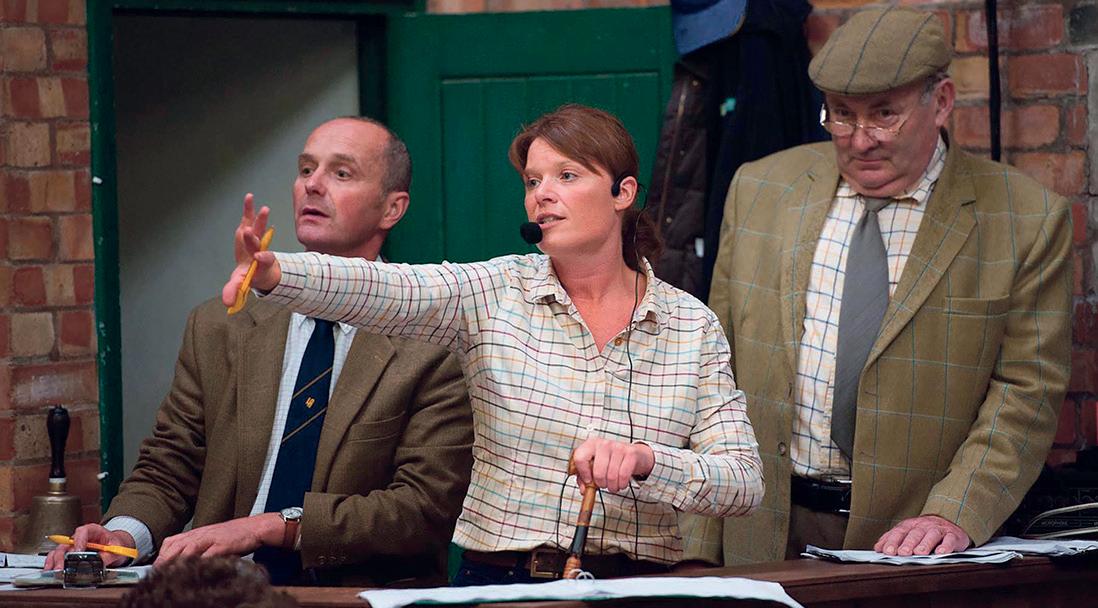
being particularly hard to place. Since the beginning of February, the task of selling has become a more pleasurable experience, which began with the lesser end being considerably more keenly sought after.
On Tuesday at Leek, a bumper entry of 133 sold on an exceptional trade which saw all classes including in-calf heifers and youngstock making good money. First quality heifers were all in
TIMED ONLINE AUCTION OF 2NO. FENDT TRACTORS, SPRAYER, DEWULF POTATO HARVESTER, POTATO GROWING EQUIPMENT, IMPLEMENTS & MACHINERY

To include: Tractors: 2015 Fendt 936 Vario (10,244hrs), 2014 Fendt 724 Vario (11,150hrs).
Loader: 2000 Matbro TM250-R (10,376hrs). Self-propelled Potato Harvester: 2020
Dewulf DS30P40-50 (2,336hrs). Self-Propelled Sprayer: 2021 Fendt Rogator 655 36m
Potato Equipment: 2021 Dewulf DS30P40-50 planter, 2021 Scanstone 3845HDAR ridger, 2020 Jones 16t Rootcrop field loader chaser, 2006 Grimme GT170S harvester, Reekie haulm topper. Irrigation: Briggs R50/R64 booms, 1992 Perrot TRS 110/300 reel.
Machinery: Kongskilde Delta 5m and Lemken Smaragd cultivators, Weaving combination cultivator drill 3.5m, 2008 Kuhn VKM305 flail mower, 2010 Jones carrot crowner, Cousins V-Form, Cousin Patriot, 2004 Lemken Euro Diamant 7f plough. Trailers: Bye Engineering fifth wheel, 2008 Bailey 14t 2005 AC 14t and 1983 Richard Western 10t trailers, 2005 Montracon curtain sider, Chieftain 1,000ltr bowser. Also: conveyors, cultivators, trailers, weights, farm vehicles, wheels, tyres and associated spares. Included by Permission: Simba DTX 300, Teagle Multidisc 250XL, 2015 Kuhn 3m combination drill, Jones 1500 onion windrower, CTM Rockstar de-stoner, Garford Robocrop, Stanhay 12row onion drill
COMMENCES: THURSDAY 7TH MARCH 2024 AT 9.00AM
FINISHES: THURSDAY 14TH MARCH 2024 AT 10.00AM VIEWING DAY: FRIDAY 8TH MARCH 2024 FROM 10.00AM - 4.00PM
that £2,500-£3,000 price bracket, with 23 passing the £2,000 mark.
The quality of animals presented



On a week-by-week basis, numbers of milkers forward nationally are down and, as of yet, there have been few herd dispersals and, in all likelihood, are there likely to be many.
One would argue that we have sold so many herds in the last decade that they are simply not there to disperse.
Those in milk production now are generally wanting to stay in it and, other than retirements, the reasons for a herd dispersal are only likely to result from death, divorce or tragedy.
Although the weather has not been kind, we are heading into the spring which often results in a more optimistic clientele and consequently trade.
All of these factors influence prices now and going forward and as ‘turning out time’ draws ever closer





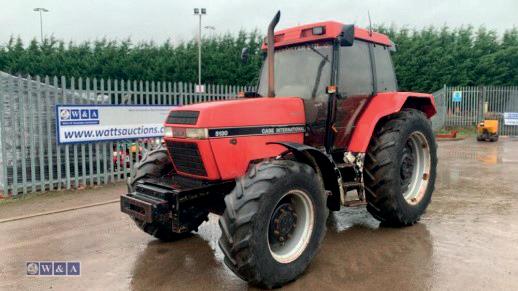





Tel: 01228 406200
Show and sale of 800 CONTINENTAL
Evening Show Friday 1st March – 6.00pm
Sale Saturday 2nd March – 9.00am
Kindly sponsored by Sponsored by AW Jenkinsons, Tynedale Farm Supplies, Tithebarn & R&J Mulholland Butchers
STORE
Monday 4th March – 11.00am
Sale to include 300 inlamb Texel/Blackface/ Cheviot ewes various ages due start April from M/S Hastings, Lockwood Farm Please advise entries Joe Bowman 07736 883670 – Rory Livesey 07535 001541
BORDERWAY MONTHLY DAIRY DAY
Wednesday 6th March 2024 - 10.30am
Comprising: 175 freshly calved cows/heifers40 In-calf heifers - 10 bulling heifers
Breeds represented include Holstein Friesian, Jersey, British Friesian, Fleckvieh & Ayrshire
FRESHLY CALVED ANIMALS The sale includes: Another outstanding consignment of freshly calved cows and heifers all producing large volumes of milk from many of the top dairy farms in the North.
LARGE CONSIGNMENTS Other consignments of freshly calved animals include CLACKMAE (14)
WREAYWOOD (12) KIRTLEBANK (10)
GUILLYHILL (10)
JERSEYS the Kerricks pedigree Jersey herd have consigned 40 heifers comprising 20 freshly calved heifers and 20 In Calf heifers due soon to top sexed sires. This is an exceptional group! The Kerricks herd is one of the top production herds in the UK.
IN CALF HEIFERS 20 pedigree Jersey in calf heifers sell 20 Holstein Friesian in calf heifers sell due soon
YOUNGSTOCK a special batch of bulling heifers PLEASE ORDER YOUR CATALOGUE TODAY or connect with someone from the sale staff.
PLEASE FOLLOW US ON FACEBOOK TO VIEW ANIMALS PRIOR TO THE SALE
Wednesday 6th March – 10.00am
Special sale of YOUNG BULLS
Prizes for top price single bull under 12mths and 12mths and over Pens of 3 or more under 12mths and 12mths and over
WEANERS & YOUNG BULLS – 12.30pm
YOUNG CALVES – 10.00am
Show and sale of
PEDIGREE HOLSTEIN FEMALES
Wednesday 20th March
On behalf of Border & Lakeland Holstein Club Entries close Wednesday 6th March
Show and sale of PEDIGREE HOLSTEIN & BRITISH FRIESIAN BULLS
Wednesday 10th April
On behalf of Border & Lakeland Holstein Club
Entries close Wednesday 13th March
Show and sale of PEDIGREE LIMOUSIN CATTLE
Friday 3rd /Saturday 4th May
Entries close Monday 4th March
PEDIGREE BEEF DAY
Friday 10th & Saturday 11th May
Shows and sales of CHAROLAIS CATTLE
Including the “White Gold” show and sale of all classes of females
BRITISH BLUE CATTLE
on behalf of Border British Blue Club BLONDE CATTLE, SIMMENTAL CATTLE & SALER CATTLE
Entries close Friday 15th March
SALE OF MACHINERY, IMPLEMENTS & HEAVY PLANT items
Sale bidding starts 10.00am
Wednesday 6th March
until 10.00am Thursday 7th March
Sale includes Dispersal sale of Farm Machinery, Equipment & Small Tools on behalf of Robin Hood Farm, Bassenthwaite CA12 4RJ
On Farm Viewing of lotsSaturday 2nd March 11am - 3pm
KIRKBY STEPHEN MART
Tel: 01768 371385
Monday 4th March
Show and sale of 360 STORE CATTLE
Also 60-70 cast/feeding cows & OTM cattle also Special spring sale of 80 BEEF BREEDING CATTLE
To include part dispersal of 14 pure Limousin cows & heifers with calves at foot from Messrs Porter, Low Oxnop Judging 8.45am -
Sale Commencing with Cast Cows 9.30am followed by Beef Breeding Cattle and Store Cattle
MIDDLETON MART
Tel: 01833 640281
STORE CATTLE
Tuesday 12th March
Entries close 10am Monday 4th March
H&H Group plc (H&H) SALE OF 4901 SHARES OF £1 EACH IN H&H GROUP PLC BY AUCTION
Wednesday 6th March 2024 at 12.00 noon
In Ring 1 at Borderway Mart, Carlisle
SALE OF 2175 SHARES OF £1 EACH IN H&H GROUP PLC BY AUCTION
Thursday 14th March 2024 at 10.30 am
In the ring at St Boswells Auction Mart
If you are unable to attend the auction you can make alternative arrangements to purchase shares either by phone or by leaving commission bids with Margaret Irving on 01228 406334, 07912 485326 or margaret.irving@hhgroupplc.co.uk
Please note that copies of the Annual Report for the period to 30th June 2023 and Interim Report to 31st December 2023 will be available on our website at http://hhgroupplc.co.uk/share-news/
Please note that only existing shareholders or restricted investors will be permitted to bid for these shares. If you are Interested in purchasing shares you should contact Margaret Irving to establish whether they meet the eligibility criteria under relevant legislation. Investments in shares are for the long term. The value of your investment and the income derived from it can go down as well as up and you may get back less than you originally invested.
If you are in any doubt about purchasing shares, you should consult an independent financial advisor author-ised under the Financial Services and Markets Act 2000. This financial promotion has been approved by SPARK Advisory Partners Limited (“SAPL”) under s21 of the Financial Services and Markets Act. SAPL is authorised and regulated by the Financial Conduct Authority. SAPL makes no recommendation as to the suitability of shares in H&H Group plc as an investment.


LIVESTOCK AUCTIONEERS � VALUERS
www.nwauctions.co.uk
info@nwauctions.co.uk
LANCASTER AUCTION MART
Tel: 01524 63308
Monday 4th March
10.30am PRIME HOGGS & CAST SHEEP
11.30am OPENING WEEKLY SALE OF SHEEP WITH LAMBS AT FOOT
Friday 8th March
10.15am 150 REARING CALVES & WEANLINGS
10.15am 150 CAST / OTM CATTLE
11am DAIRY CATTLE
11.15am 300 STORE CATTLE
J36 RURAL AUCTION CENTRE
Tel: 015395 66200
Tuesday 5th March
1pm 2000 PRIME HOGGS & CAST SHEEP

BARNARD CASTLE AUCTION MART
TUESDAY 5TH MARCH
20-25 OTM Cattle
25 Feeding Bulls & 150 Store Cattle
Sale at 10am
PATELEY BRIDGE AUCTION MART
TOMORROW SATURDAY 2nd MARCH
Sale of 30 OTM, Prime & Cattle
Prize Show & Sale of 35 Feeding Bulls Sale of 115 Store Cattle
Sale at 11am
BROUGHTON AUCTION MART
Please note the next sale will be the April Fair
SATURDAY 20TH APRIL
Prize Show & Sale of Feeding Bulls & Store Cattle
Sale at 11am
Early entries appreciated
www.barnardcastleauctionmart.co.uk
Libby Bell Auctioneer on 07818 435728




Thursday 7th March
SHOW & SALE OF STORE CATTLE (Under 12 Months)
Predominately TB4, Homebred Cattle. Buyers attendance highly recommended.
10am 150 REARING CALVES & WEANLINGS
10.30am 100 CAST / OTM CATTLE
11.15am 500 BEEF BREEDING, STIRKS & STORE CATTLE
Tuesday 12th March
11am OPENING SALE OF SHEEP WITH LAMBS AT FOOT
Thursday 14th March 10.30am
Fortnightly Sale of IN LAMB SHEEP & 1000 STORE HOGGS
Delivery: Monday 4th & Tuesday 5th March
Sale to Commence: Friday 8th March
Viewing: Friday 8th (9am-4.30pm) & Saturday 9th (am only)

SATURDAY 2ND MARCH
150 Breeding & Store Cattle of all classes inc
2 Lim Hfrs, 10mths, I Wilkinson
16 Lim Hfrs, 10-13mths, S & P Padfield
19 Limx strs & hfrs,11-12m, Spencer & Fox
5 Lim/SimX Strs, 12mths, Riby Grange
3 B Galloway Cows in calf to B Galloway, Dalton Park
2 Lim Bulls10-11mths, P Oxley
4 Lim Hfrs 11mths, J & L Cardwell
10 Blonde AquitaineX Hfrs, 12-15mth, R Burton
4 AAx bulls, 11-12m, K Terry
2 AA Bulls, 9mths, B Brook
Store & Breeding Sheep inc
120 Store & Breeding Pigs Pigs 9am Sheep 9.45am Cattle 10.45am
Contact Office for Details
MART OFFICE: 01757 703347
WEDNESDAY 6TH MARCH
RICHARD HAIGH: 07768 594535
400 Prime Cattle 410 Prime Sheep 175 Prime Pigs Pigs 9am Sheep 9.45am Cattle 10.30am
www.selbymart.co.uk
Contact Office for Details
MART OFFICE: 01757 703347
RICHARD HAIGH 07768 594535
www.selbymart.co.uk

Monday 4th March
SALE OF REARING CALVES Sale 10.30am
PRIME, CAST & FEEDING CATTLE Sale 11.30am (TB exempt section available) MONTHLY SHOW & SALE OF PRIME HOGGS Sale 12.30pm followed by CAST EWES
Weekly Sale of INLAMB EWES, EWES WITH LAMBS at FOOT & STORE SHEEP Sale 11.30am (Entries to the office by Friday for Online Catalogue)
Monday 11th March
Early SHOW & SALE OF EWES WITH LAMBS AT FOOT
Wednesday 13th March
Sale of FEEDING BULLS, PRIME CATTLE, BEEF FEEDING COWS, STORE & BREEDING CATTLE
Inc MONTHLY PRIME CATTLE SHOW (Entries close Wednesday 6th March)
Saturday 16th March
LIVESTOCK ONLY SALE 250-300 STIRKS, WEANED/SUCKLED CALVES, BREEDING & CULL GOATS, STORE & BREEDING SHEEP (ent by Monday 11th March)
Dairy Cattle
Monday 4th March
Show & Sale of 15-20 DAIRY CATTLE Sale 12noon
Monday 18th March
Show & Sale of DAIRY CATTLE
Monday 1st April
Spring Dairy Youngstock Spectacular for pedigree and commercial heifers
Monday 15th April
Spring Coloured Breeds Sale of in milk and youngstock
Further details to follow, register your interest to both buy and sell soon for planning and advertising with Sarah on 07710 795585
Working Sheep Dogs
Tuesday 12th March
ONLINE TIMED AUCTION OF WORKING SHEEPDOGS
(Entries close Tuesday 5th March)

FRIDAY 8TH MARCH – 11.30AM
EXETER LIVESTOCK CENTRE, EXETER, DEVON EX2 8FD SALE OF 120 DAIRY CATTLE
THE ENGLISH GOLD TOP SALE OF 50 PEDIGREE JERSEYS
Comprising: 20 Freshly Calved Holstein Friesian Cows & Heifers from local vendors. Sale of 51 Pedigree Holstein In Calf, Bulling & Yearling Heifers from the 12,027Kgs Morchard Herd of Messrs Yendell, Crediton. The Gold Top Sale of 50 Jerseys to inc the Dispersal Sale of the Newventure & Princesstillstar herds of 42 head on behalf Messrs TS & M Oaks of Worcester. The herd is exceptionally well bred from great families inc Belle, Birch, Cyber, Melba, Grove & Nouvelle. The herd includes 19 In Milk and/or In Calf Cows & Heifers, 11 In Calf & Served Heifers & 12 Maiden Heifers. Plus youngstock from the Riverview herd.


Auction Mart
Claughton On Brock, Preston PR3 0PH
01995 640280 www.garstangmart.co.uk
Tom Greenow - Market Manager 01200445376
Rachel Capstick 07713075659
Jack Pickup 07710708326 Eleanor O’Neill 07706347505
Saturday 2 March
Enquiries to Tom Greenow or the office this week
HEAD

Auctioneer: Ian Atkinson 07944 237516

Tuesday 5th March, 2024
9.00 a.m. 750 Prime Hoggs & 180 Cast Ewes/Tups
10.30am Opening Sale of Sheep with Lambs at Foot 25 Mule & Cont Ewes & Lambs Entered
10.30 a.m. Sale of 100 Store Cattle
11.30 a.m. 60/80 Rearing Calves, Weanlings & Stirks
Wednesday 6th March, 2024
10.30 a.m. OTM Sale & TB Exempt Cattle
Wednesday 28th March, 2024
12noon Show & Sale of Dairy Cattle Entries for Catalogue close 10.00am 22nd March

HAWES, NORTH YORKSHIRE, DL8 3NP
Tuesday 5th March
1500 Prime Hoggs at 10am
300 Cast Ewes & Rams
Saturday 9th March
Spring Show & Sale of Store Cattle, Beef Breeding & Cull Cattle.
Tuesday 12th March
In-Lamb Ewes & Gimmer Hoggs (Please Enter) Telephone: 01969 667207, 015396 20895, 07974 126397. 07711 469280

9.30am WEEKLY CAST SHEEP & PRIME HOGGS
10.30am 221 OUTFITS OF SHEEP & LAMBS AT FOOT followed by 351 IN LAMB SHEEP 12.30pm 251 STORE HOGGS catalogue online. Enquiries to Rachel
Tuesday 5 March
MONTHLY MACHINERY SALE 10am
All entries to the yard Monday 4th 8am to 2pm strictly - loadall onsite. Catalogue online Monday Evening. Known entries of: Leyland 270 with loader, 1t portable proven hopper, 5’6” loader bucket, Muck grab, 1300gal tanker Ifor livestock trailer, hiSpec Feeder, Feed Troughs, Lambing Equipment, hang on cattle troughs, Feed Barriers, workshop clearance, Lamb adopters, fencing misc., gate and hurdles.
Thursday 7 March
10.30am PRIME BEEF followed by CULL CATTLE
10.30am REARING CALVES

11.00am DUGDALE NUTRITION with LELY SHOW & SALE OF DAIRY entries please by Monday 4th 4pm
Saturday 9 March
9.30am WEEKLY CAST SHEEP & PRIME HOGGS
10.00am BREEDING & STORE CATTLE
10.30am SHEEP WITH LAMBS & IN LAMB SHEEP
Entries please for both catalogues by Tuesday 5th 12noon
Thursday 14 March
10.30am PRIME BEEF followed by CULL CATTLE
10.30am REARING CALVES
12.30pm STIRKS Entries please by Tuesday 5th 12noon
Saturday 16 March
9.30am WEEKLY CAST SHEEP & PRIME HOGGS
10.30am SHEEP WITH LAMBS, IN-LAMB, STORES
Friday 22 March – Saturday 23 March
Culmination of the Young Handlers Overwintering 23-24 event. The show will be held at 6pm on the Friday evening, spectators welcomed to support our next generation, light refreshments served in the café. All animals will be sold as part of the Store Cattle sale on Saturday 23 March. Catalogue available that week.
Matthew Middleton 07860659803 www.gisburnauctions.com | 01200 445376

Monday 4th March
Usual Fatstock Sale

Saturday 9th March 10.30am
Machinery & Sundries Sale
Drop items off Friday 12 – 2.30pm Or Sat from 7.30am
Approx 45 Acres of Summer Grazing
Felliscliffe area – Cattle/Mowing Ring Ian for details
Ian Smith - Mart Manager 07738043771
Office 01943 462172 wfam@auctionmarts.com


PRIME SHEEP
Every Thursday at Thrapston
STORE & BREEDING SHEEP & CATTLE, CALVES, PIGS & GOATS
Every Saturday at Thrapston
ALL CLASSES OF SHEEP & PRODUCE
Every Tuesday at Stratford
Saturday 2nd March
Smallholders Sale
To include: Goats, Pigs & Sundries
No pets can be sold, due to our local Councils instructions. Please contact us for further information
Machinery & Other Sales
Friday 22nd March
A Dispersal Sale of Game Rearing Equipment at Rampton, Cambridgeshire
The sale is being held due to the retirement from the business. They previously hatched and reared over 30,000 chicks.
The sale is to include NEW and USED heaters, feeders, drinkers, penning, housing and incubators.
Further comprehensive details will be in the catalogue. If you would like a hard copy, please contact the office or visit our website.
Reduction Sale
Starts Wednesday 27th March, at 12 noon
Finishing Tuesday 2nd April, from 12 noon
An Online Auction of Agricultural Machinery and Effects
At Ellas Farm, Loughborough
Briefly to include: Farm Machinery, Cattle and Sheep Equipment. Further details will be on our Online Auction Site and social media
For further information contact:
Alastair Brown: 07885 804450
Jake Wagstaff: 07487 526803 01832 732241 or visit the website for weekly listings of sale entries
The Livestock Auctioneers Association

The industry shop window
CONTACT YOUR LOCAL LIVESTOCK
MARKET AT www.laa.co.uk

Stephen
Tuesday 5th March
10.30am 40-50 Feeding & Cast Cows & OTM Cattle
325
Inc. Annual Consignment from J & I Whitaker, Bowsber
Wednesday 6th March
11am
11.30am 75-100 SHEEP WITH LAMBS AT FOOT
2.30pm 2000 Cast Ewes followed by 2500-3500 Prime Hoggs
Tuesday 12th March
In Lamb Breeding Sheep
Fortnightly Sale of Store Hoggs Entries for catalogue close Friday 1st March
Wednesday 13th March Fortnightly Sale of Dairy Cattle
Tuesday 19th March
March Show & Sale of FARMERS STIRKS & YOUNG STORES
Wednesday 20th March
Easter Spring Lamb Show & Supreme Hogg Competiton
Saturday 23rd March
Spring Collective Sale of Farm Machinery & Equipment Entries Invited. Contact Will on 07590 876849

THE 93rd MIDSHIRES PRODUCE AUCTION. Approx 4,500 Tonnes on Farms and Estates in the Central Midland Counties
To include a comprehensive selection of HAY, STRAW, HAYLAGE, SILAGE & FODDER BEET in all sizes, easily accessible to towns including Coventry, Leicester, Lutterworth, Market Harborough, Northampton, Nuneaton, Rugby and Southam.
Together with:
200 Tonnes Maize Silage at Sapcote, Leicester, 80 Tonnes Grass Silage at Wormleighton, Southam, 50 Tonnes Fodder Beet at Ansty, Coventry, 100 Tonnes Crimped Maize at Kenilworth, Coventry Plus: Hay and Straw for delivery.
TO BE SOLD BY AUCTION ON Tuesday 5th March 2024 at 2.30pm. Lutterworth Rugby Football Club, Ashby Lane, Bitteswell, Lutterworth, Leicestershire LE17 4LW (3 Miles from Junction 20 of the M1 Motorway)
Catalogues & Information Tel: 01788 564749
7 – 11 Albert Street, Rugby, CV21 2RX www.howkinsandharrison.co.uk/auctions
HORTICULTURE
9.30am Every Wednesday and from 7th March 5pm every Thursday evening Entries include bare rooted trees, shrubs, bedding plants, logs etc..
FURNITURE Next Sale 13th & 14th February
PRODUCE Every Monday at 12.30pm
MACHINERY
Next Sale Tuesday 12th March - Entries already include New Holland 6030, Kuhn SC314D Mower, Keenan MechFIBER 320 Feeder Wagon. Timber Wolf Shredder, Apache Quad. (Last sale 1764 lots)
info@ashleywaller.co.uk www.ashleywaller.co.uk www.easyliveauction.com
PEDIGREE LIVESTOCK
SE R V ICES LIMITE D
We specialise working in partnership with Livestock Societies providing a bespoke support service.
SUPPORT – we can support recognised Livestock Societies with their day to day administrative work and support.
We specialise working in partnership with Livestock Societies providing a bespoke support service.
SUPPORT – we can support recognised Livestock Societies with their day to day administrative work and support.
publications, catalogue work, promotions, equine passports, meeting and event support.
DELIVER – we can deliver and assist with your requirements as we offer over 150 years combined experience in the livestock and agricultural industry.
DELIVER – we can deliver and assist with your requirements as we o er over 150 years combined experience in the livestock and agricultural industry.
MANAGE – we can manage everything from administrative support, registrations, annual publications, catalogue work, promotions, equine passports, meeting and event support.
MANAGE – we can manage everything from administrative support, registrations, annual publications, catalogue work, promotions, equine passports, meeting and event support.
Holme House, Dale, Ainstable, Carlisle CA4 9RH t: 07801 868856 e: info@pedigreelivestockservices co.uk
www.pedigreelivestockservices co.uk





























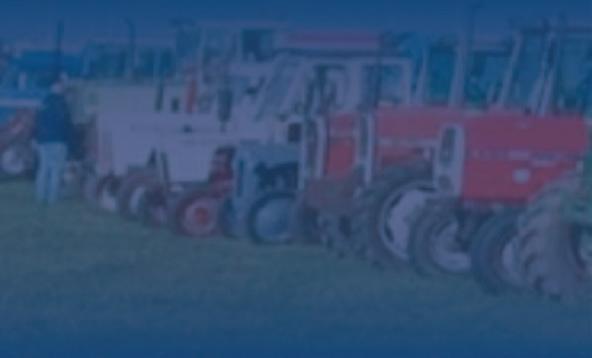










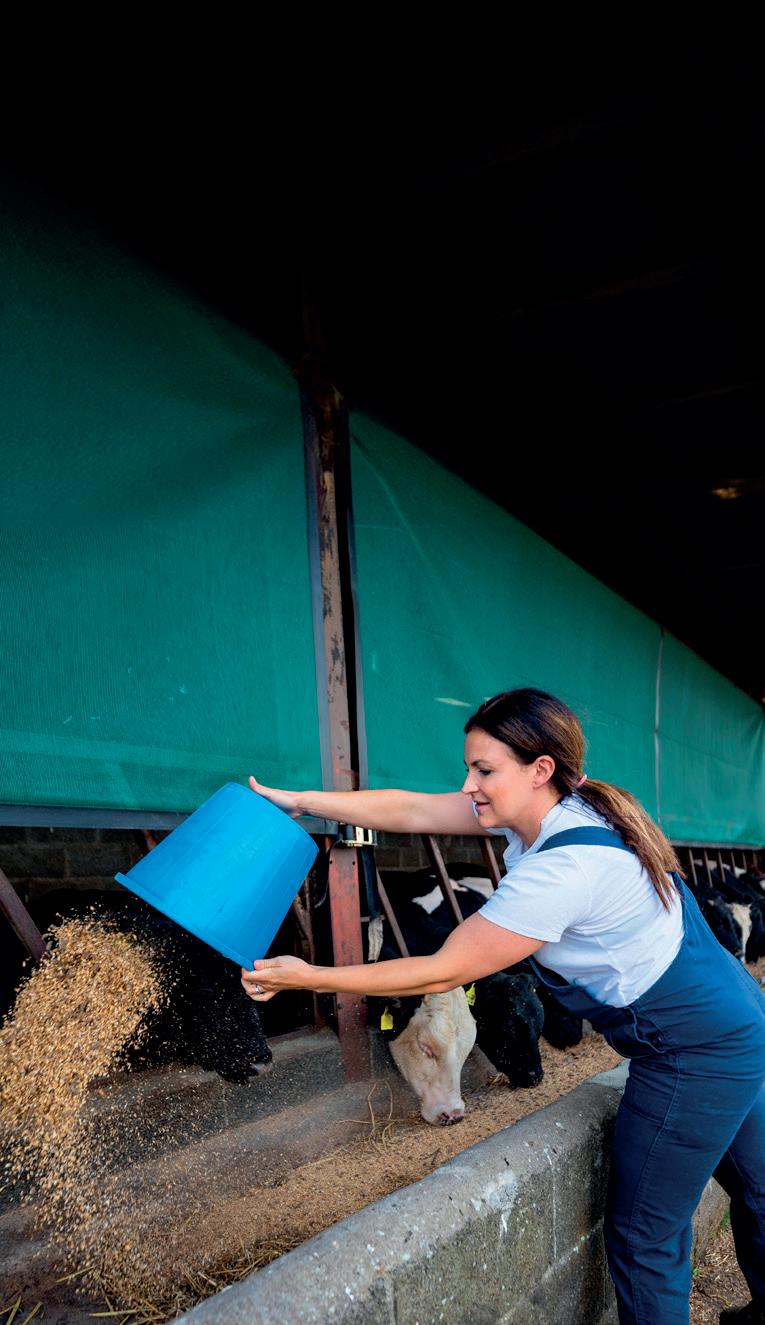




•
• WORK CARRIED OUT TO A VERY
• WATER SYSTEMS INSTALLED
• BOREHOLE PUMPING INSTALLATIONS
• 24HR BREAKDOWN SERVICE
• FREE QUOTATIONS AND SITE VISITS THE POTTERIES GARAGE
TEL: 01942 871900.
FAX: 01942 896843.
•
• Treatment & Filtration
• Water testing 01625 878411

Orders for Insertion of advertisements in Farmers Guardian are accepted subject to the following conditions:
1. Advertisement copy shall be legal, decent, honest and truthful, and shall comply with the British Code of Advertising Practise and all other codes under the general supervision of the Advertising Standards Authority: and shall comply with the requirements of current legislation.
2. While every endeavour will be made to meet the wishes of advertisers, the publisher does not guarantee insertion of any particular advertisement.
3. In the event of any error, misprint or omission in the printing of an advertisement or part of an advertisement the publisher will either reinsert the advertisement or relevant part of the advertisement as the case may be, or make a reasonable adjustment to the cost. No reinsertion, or adjustment will be made where the error, misprint or omission does not materially detract from the advertisement. In no circumstances shall the total liability of the publisher for any error, misprint or omission exceed
a) The amount of a full refund of any price paid to the publisher for the advertisement in connection with which liability arose. OR
b) The cost of a further corrective advertisement of a type and standard reasonably comparable to that in connection with which liability arose.



CONCRETE

Chicken
4. The publisher reserves the right to withdraw, amend or alter any advertisement it considers necessary.
5. Cancellations or advertisements are accepted providing they comply with the cancellation deadlines which are published at regular intervals.
6. Advertisement orders are issued by an advertising agency as a principal and must be on the agencies official form (when copy insutructions not constituting an official order are issued they must be clearly marked at the head “Copy Instructions – not an order”.
7. Advertising Agency commission will only be granted to those Agencies who are currently recognised by the Newspaper Society at the time of placing an advertisement order and copy. The rate of commission is determined by the publisher.
8. When credit is allowed payment is due within 7 days. Monthly accounts are due in full each month. “We reserve the right to charge additional costs and interest for non payment within our credit terms”.
9. Only standard abbreviations are permitted by the publisher. List available on request.
10. Classified display advertisements must be at least 3cms in depth for every column wide, and the minimum size of any advertisement is 2 lines.
11. Every endeavour will be made in order to forward replies to box numbers to the advertisers, as soon as possible after receipt by the publisher, but the publisher accepts no liability in respect of any loss, or damage alleged to have arisen through delay in forwarding or omitting to forward such replies, however caused. Circulars and the like should not be distributed through publisher’s box number facility.
12. The placing of an order for the insertion of an advertisement, is an acceptance of these conditions and any other conditions stated on any type of order form by an agency or advertisers are not applicable if they conflict with any of the above.

New & Used Bulk Milk Tanks
Second hand tanks currently available:
Mueller 8000ltr,
Packo

Complete with Honda engine and Electric motor. This unit is ready for work and can be delivered anywhere in the UK.
Livestock Supplies LTD
Ashley: 07831 887531, Office: 01829 260328, Will: 07769 974476 www.livestocksupplies.co.uk
HEAVY

New


16,000
14,000 Ltr Fabdec
13,700 Ltr Roka
10,000 Ltr Fabdec
8,000 Ltr Roka Silo
6,750 Ltr Delaval (holds 7,000 Ltrs)
6,000 Ltr Roka
6,000 Ltr Fabdec
5,000 Ltr Packo
5,000 Ltr Mueller Model “O”,
5,000 Ltr Roka
4,000 Ltr Mueller
4,300 Ltr Mueller Model “P”,
2 x Refurbished 1T Ice Builder suitable for 10/12,000 Ltrs every other day
Refurbished 1.3T Ice Builder suitable for 16,000 Ltrs every other day
Refurbished 1.5T Ice Builder suitable for 18/19,000 Ltrs every other day
Smaller bulk tanks available, emergency open & enclosed, loan tanks available to rent, main dealer for new Ro-ka milk cooling systems.

Calf Hutches. Complete with fencing. A large selection of all animal and calf feeding equipment and all other associated products also available. Massive saving on list price
Livestock Supplies Ltd.
Ashley: 07831 887531 Office: 01829 260328 www.livestocksupplies.co.uk
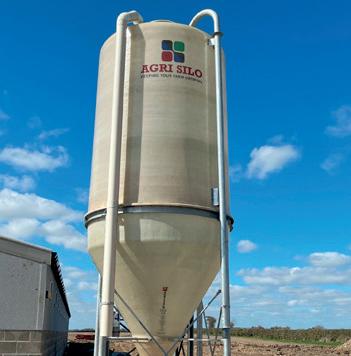











For further details please call S.W Refrigeration specialising in “On Farm cooling Equipment” 01392 210344 or Paul on 07974 140949


Ashley: 07831 887531, Office: 01829 260328, Will: 07769 974476


UK and America.
Please feel free to contact
Richard – 07816 173689
John – 07885 739120
HERD OF CROSS BRED COWS FOR SALE (HOLSTEIN X FLECKVIEH X NORWEGIAN RED)
Closed herd for many years. Low replacement rate, profitable herd. 220+ milkers plus followers.
Tel John 07710 122187 or Stuart 07719 616741 Shrops (P)

Available in suitable batches delivered to most parts of the country
Continental Bull and Heifer calves
3-5 weeks old available now.
Quality store cattle
Five Red and Black Limousin stock bulls
and bulling heifers for sale
From a closed herd. Easy Calving.
Some Semen tested. TB4 area. Younger bulls also available
Telephone: 01978 780368 or 07986 113221 Wrexham (P)
Tel Edward: 07770 457453 N. Yorkshire (P)
High Health Status
Sired by top AI Angus Bulls, bred for calving ease, high growth & maternal traits. Fully guaranteed & ready to work. Will deliver when required.
Contact Robert Shanks 07974 968150 Kelso (P)
PEDIGREE HEREFORDS
YOUNG BULLS top EBV’s
Choice of 20 from our 180 cow herd
TB4 BVD & Lepto vacc. Call Henry 07866 222062 - details on website www.ribbleaberdeen-angus.co.uk
TREDON LIMOUSINS
PEDIGREE

Bulls and select Females for Sale from a high health herd, with fully registered pedigrees.
Further details can be seen on: www.lowergroveherefords.com
Contact: Paul on 07730095062 or paul@lowergroveherefords.com

HIGH ENERGY FODDER BEET
CLEAN- DESTONED, WASHED, WHOLE OR CHOPPED BEET
AVAILABLE IN 20 & 30 TON LOADS DELIVERED NATIONWIDE
THE VERY BEST QUALITY
TEL: 07584 636338
TOP PEDIGREE REGISTERED HEREFORD BULLS AND HEIFERS. All home bred, quiet to handle. Delivery available. 07885 594143 or 01394 460408 (East Anglia)



Whole
• office@proforage.co.uk
• 01565 758755 • 07484 364842
Hay & Straw for Sale in all types of Bales. Good quality.
Reasonable prices.
TEL: (01625) 531629 OR (01625) 522249
AK SHARPE & SONS
ALL TYPES OF HAY AND STRAW FOR SALE & WANTED
Competitively Priced
Andrew 07970 052 419 Phillip 07973 208 384 LANCS (T)

FGinsight.com


BULLS AND HEIFERS FOR SALE
Excellent choice. Great conformation, colour and temperament. Ready to work. High health accredited for IBR, Lepto, BVD and Johnes 1, TB4 North Yorkshire 01756 720210 - 0777 99 20202 More details visit: www.whitehillherefords.co.uk
HAYLAGE for sale
www.haylageforsale. co.uk. Round bales & square bales. Tel: 07785 361396 (T)
ROUND BALE Wheat, Oat and Barley Straw, Tel: 07415 867963 or 07896 712253 Lancs (P)
LIQUID FEEDS to encourage forage intake. Molasses and molasses blends plus additional minerals if required. J E Morten: 01663 734621 High Peak, Derbyshire (T)
DAIRY, BEEF Nuts & Blends. Fodder beet, Potatoes and Maize Silage now available Tel: 07837 485652 Cheshire (T)
FODDER BEET Clean & stone free. Ray Darley 07860 212800 Nationwide Delivery (T)
STRAW, HAY & Haylage Large square bales. Tel: 07785 361396 Bolton / Wigan (P)

Biscon
Cereal
Cereal
Mixed
Biscon Meal (Approx. 12% Protein/14 ME) £225 ex store
CALL NOW 01949 844700 www.midlandfeeds.co.uk
Tomlinson Bros
Top Quality
Hay & Straw.
All types of big bales delivered.
01829 782378 or 07710 933681
LOWER YOUR VET BILLS WITH WASHED SILICA SAND CUBICLE BEDDING
* Helps to eradicate mastitis problems and lowers your milk count
* Equestrian sand also available Tel 07730 897138 / 01484 603130

























delivery in the UK with offload included
Apply for an account
Supporting British farmers for over 40 years

CANCELLED
CRASH




•
•
•
•
•
•
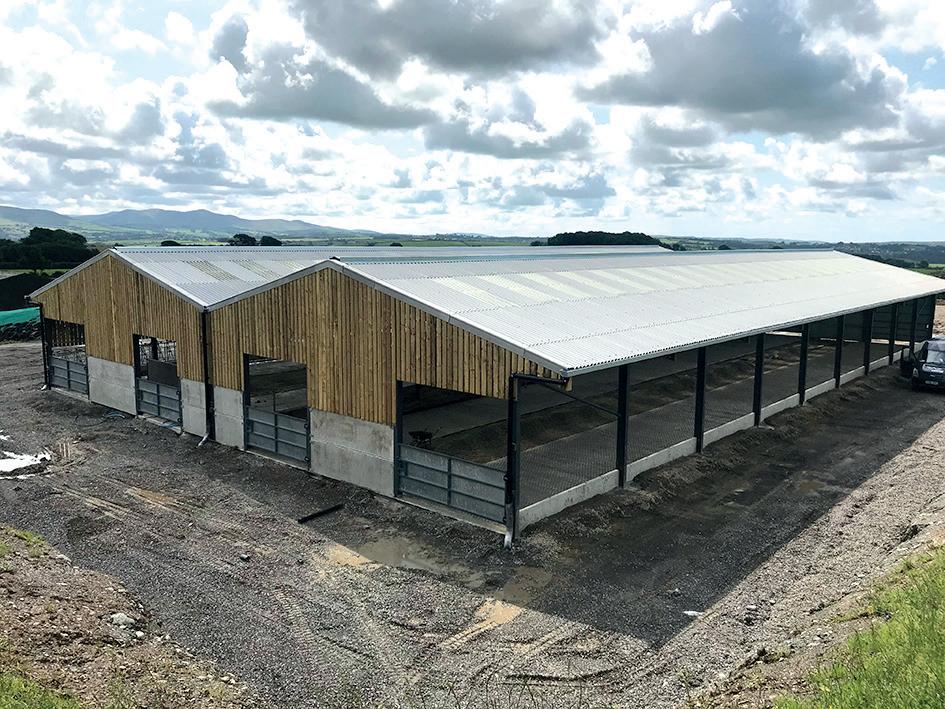
•
•





















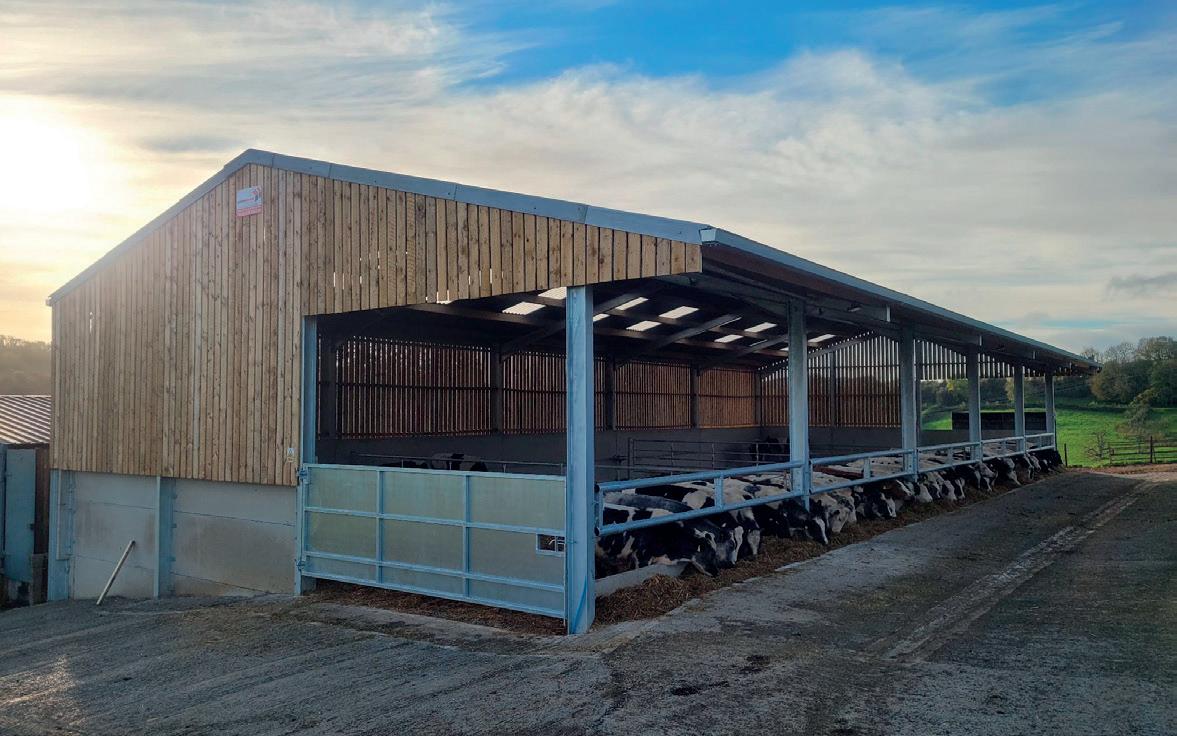









































In the evolving landscape of UK agriculture, the potential for alternative income through renewable energy projects, specifically solar farms and battery energy storage systems on farmland, is becoming increasingly significant. With the rise in demand for clean power, the opportunity for landowners to enhance their income streams is considerable.
However, the journey from initial approach by a solar or battery developer to the successful operation of a renewable energy project is fraught with complexities.

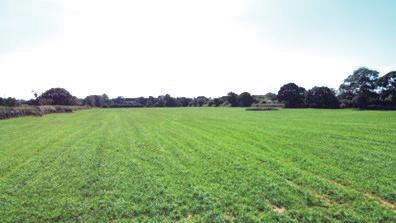


Interest from developers in leasing sites for solar and battery storage projects is at an all-time high. As a result, this brings to the fore the importance of understanding the complex details involved in progressing a scheme to generating rental return.
Therefore, to maximise benefits and mitigate risks, it is crucial landowners navigate these opportunities with a clear understanding of the financial, legal, and technical aspects.
Landowners should seek a partner with a proven track record, solid financial standing and experience in managing renewable projects.
It is important to establish early in the process if they are operating it themselves, or if they are simply a middleman. The initial negotiations, encapsulating exclusivity, and heads of terms, are pivotal.
This stage lays the foundation and can hugely affect outcomes. Clear definition of project scope, financial terms, and responsibilities is vital and ensures mutual understanding, reducing confusion.
Securing exclusivity protects both parties. It ensures developers are serious about proceeding and provides landowners with assurance against opportunistic land tying.
This important stage also allows for due diligence, ensuring site suitability and developer capability, all crucial for project feasibility.
Early negotiations set the stage for the economic terms of the lease



or purchase, including rental payments, revenue sharing models, and terms of use. Perhaps most importantly, this stage can reveal the intentions and capabilities of the approaching party.
If a developer is not willing to agree to reasonable terms, or fails to demonstrate their ability to proceed with the project (such as showing proof of funding or a track record of completed projects), it may indicate that they are not genuinely committed to the project.
One of the primary considerations for landowners is the impact of projects on their tax liabilities and the structure of their business.
The transition of land use from agriculture to leased to an operator for renewable energy can alter the applicability of various tax reliefs.
Depending on whether the landowner receives the income personally or through a company structure, income from renewable energy projects could be subject to different taxation rates. So, the implications of such projects on capital gains tax, inheritance tax, and the availability of agricultural property relief and business property relief must be thoroughly examined.
In summary, the journey to developing renewable energy projects on farmland is complex, involving critical financial, legal, and technical considerations. Professional advice is vital from the outset.






17 TOYOTA HILUX INVINCIBLE MANUAL, METALLIC BLUE ALLOY LINER, LOW MILES, OUTSTANDING 2011 SUZUKI JIMMY 4WD, SWB, PETROL 11 MONTHS MOT. £4,500 2004 SUZUKI JIMMY 4WD, SWB, PETROL ON RETENTION, GOOD RUNNER, TIDY, IN SHORTLY IFOR WILLIAMS TA510 CATTLE TRAILER C/W CATTLE DIVISION, FULL IFOR SERVICE, OUTSTANDING CALL COLIN 07976 252191 DEANFIELD TEST CENTRE BNG & NN National Sale Informal Tender 8th March 2024 Vendors Register your entry Purchasers Request a Tender Form & Lot Register bng@townsendchartered surveyors.co.uk 01392 823935


























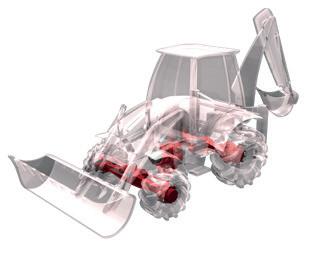


These axle and transmission brands are commonly found on:

T: 01452 733106 E: ag@grouphes.com
W: tractec.grouphes.com



MASSEY FERGUSON
Replacement tractor parts
Direct to your door Phone for best quotes
Mobile: 07971 243668 or 01545 570 810
CLAAS John Deere, and other makes, combine harvester 2nd hand and new spares. www.jmtcombinehire.co.uk. Tel: JMT Engineering 01926 614345 (T)







BREAKING MASSEY
699, 575, 3070, 3080, 3095, 2645, 6140, 3680 & 8120
Also tractors wanted for breaking Tel: 07710 153603
W.Yorks masseyfergusontractorbreakers.co.uk
Generators, Pressure Washers & Pumps
PTO & Diesel Generator Specialist. Quality new & used. Est 25 yrs. JSPUK





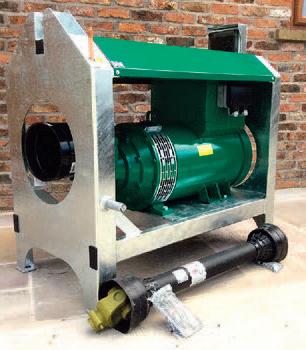

01772 653569
We take a farmer-centric approach to media.
Our job is to help farmers run their farms more efficiently and make better purchasing decisions FG




























2024




48 V FORK LIFTS with side shift 3 m mast two ton lift ,two speed transmission , silent clean running 8 hours constant work time on a single charge 48v/360ah heavy duty batteries quick charge supplied .One year parts warranty smart nippy little things, in stock ready to go £9,995 +vat


Here is our new They are available as Euro 3 standard, and have a 4.5m lift height with side shift. Full EU approval on solid of pneumatic tyres. A full backup







Full parts back up service available £15,995 + VAT




New NH T7.210RC
165HP+ 50K F/Links Exhaust & Air Brakes F/Axle & Cab Susp 650 Tyres POA
0% Finance 3+33 Months T&C’s Apply.


New NH BOOMER 25 Compact Tractor 25HP 2 Speed Hydrostatic 4WD Rear PTO & Linkage ROPS Frame POA
0% Finance 3+33 Months T&C’s Apply


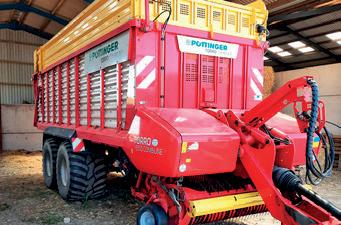

NEW NEW HOLLAND
T6.160DCT 130HP-160HP
6 Cyl 24x24
0%

Rubber Tracks Q/H Piped 3 Buckets POA
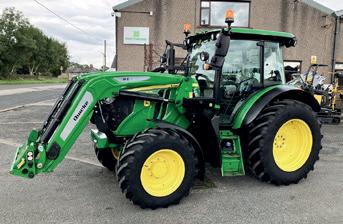




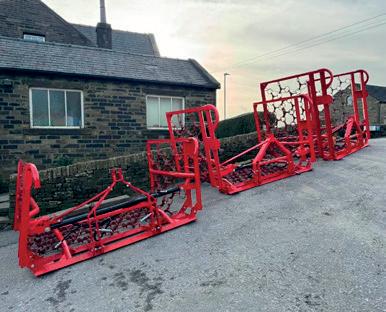

NEW JARMET CROP SPRAYERS, 400, 600, 800 & 1000 LITRES AVAILABLE, CHOICE OF



GOOD RANGE OF MORE NEW / USED ITEMS IN STOCK
QUALITY REPLACEMENT PARTS BY &

• TELEPHONE







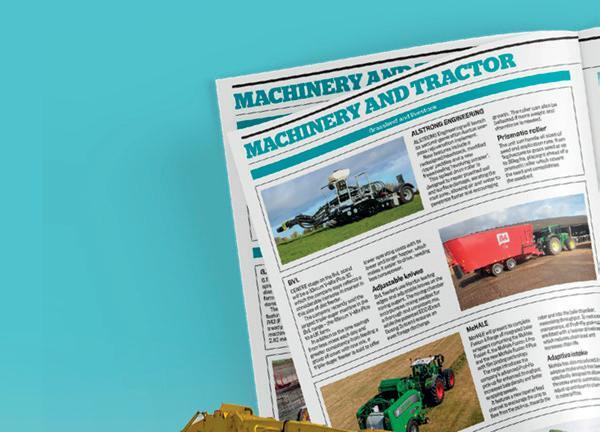


LOCKWOODS FARM, SCAPEGOAT HILL, HUDDERSFIELD, HD7 4PE

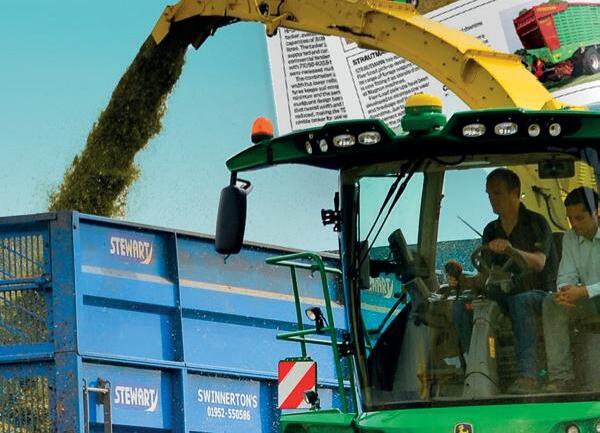






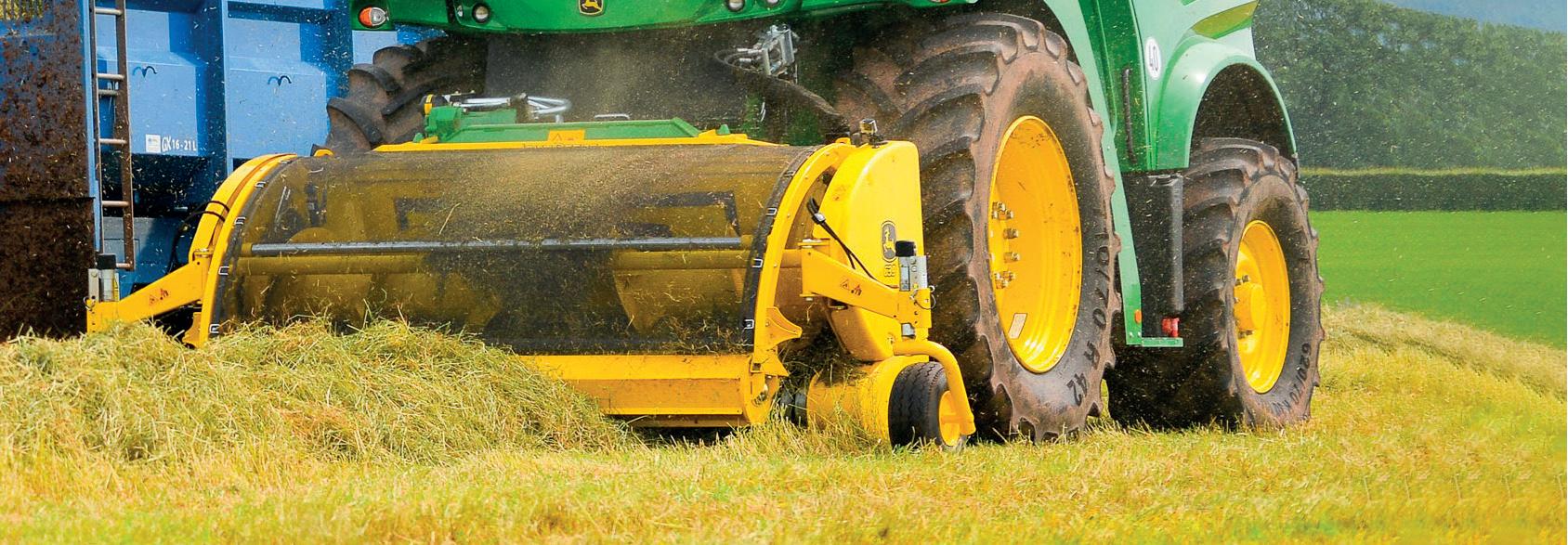


















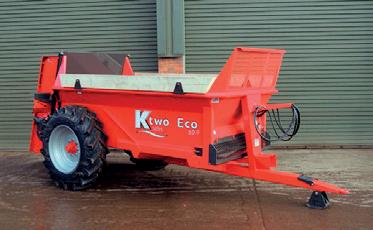











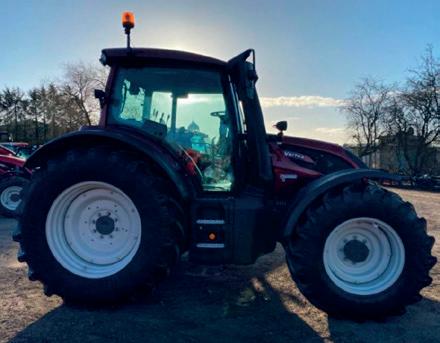
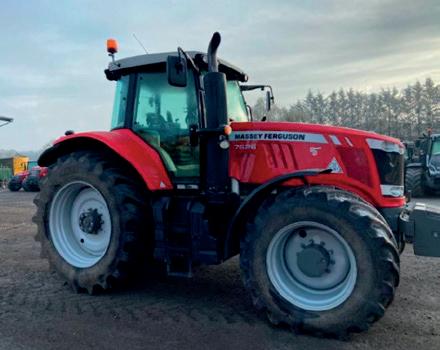

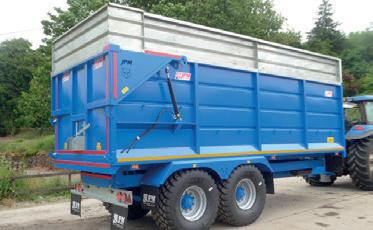
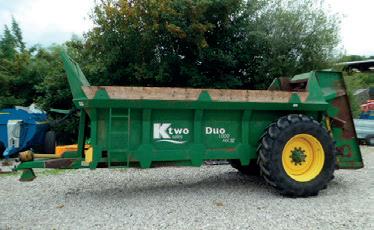















30028080



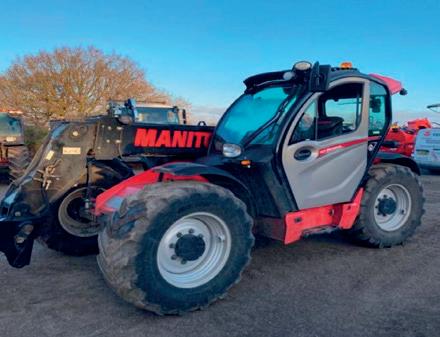





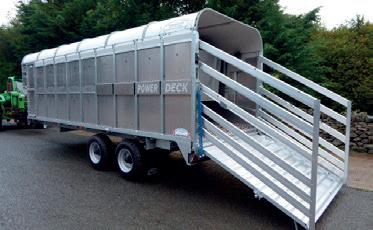








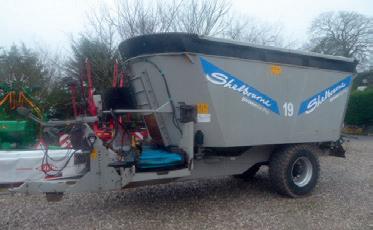




30026870



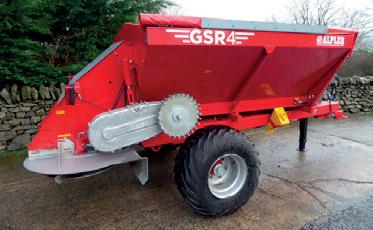

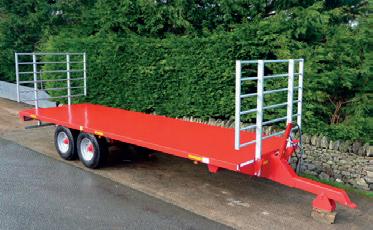






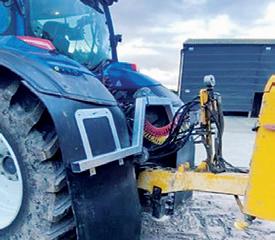






















2011,


2019,
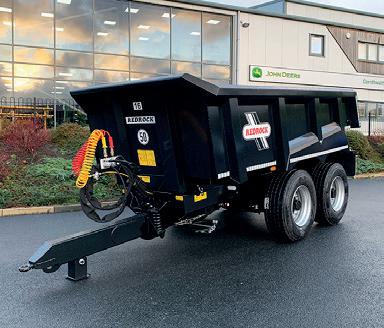

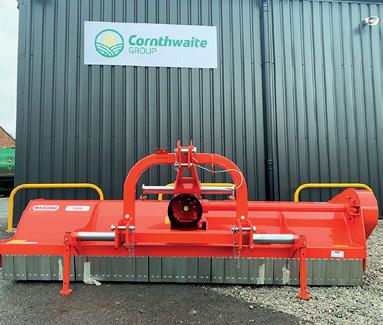

2020,

2021,



2018,













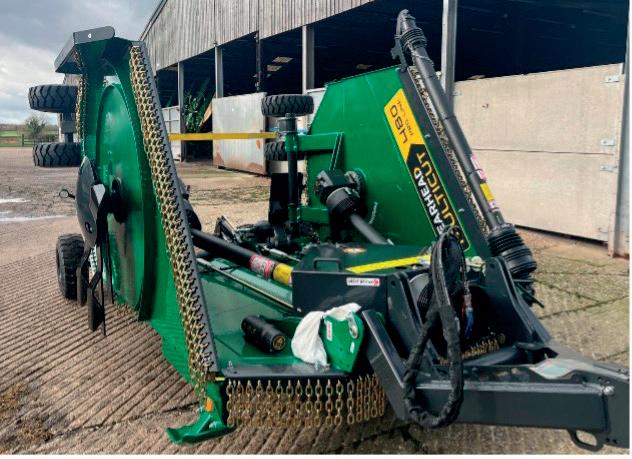




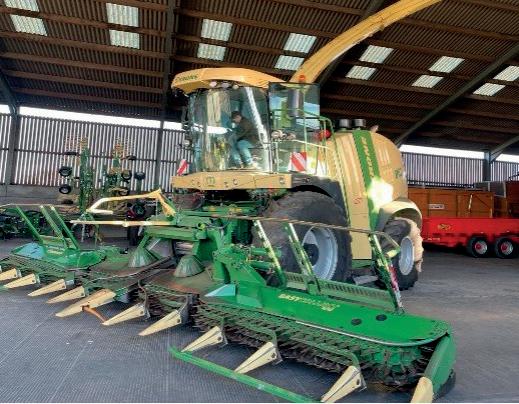


KRONE BIG X 770 FORAGE HARVESTER
C/W Easy Collect 903 12 Row Header 2016, 1422 engine hours, 1215 drum hours, 1079 header hours
KRONE BIG PACK 1270 WITH MULTI-BALE SYSTEM INCL. double knotter (up to 9 Bales in 1) bale size - 120 cm wide x 70 cm high, with length of 100 cm to 270 cm, 2022 Ex Demo


its versatility is enough to side-step buying a
When Tony Ruane took on Warborough Farm, near Wantage, Oxfordshire, just under two years ago, the 142-hectare grassland farm represented a new challenge.
While years of under-investment presented him with a few obstacles in getting infrastructure and farm buildings up to scratch, there was the ongoing challenge of regenerating grassland to support a growing flock of New Zealand Romney sheep, which has increased from 250 to 550 ewes.
Mr Ruane says: “The kit which was left behind created an opportunity to reinvest and shape the farm for the future. I just was not sure what type of machinery we should buy to give us the most flexible and versatile solutions for the business.”
Rather than buy in haste and repent at leisure, Mr Ruane’s thought process hinged around two key machinery options, supported by a helpful neighbouring farmer making machinery available in the short-term until a purchase was made.
With input from Warborough Farm’s shepherd David Barber, the two focused their efforts on finding either a tractor with a loader or a telehandler. Regardless of which solution they chose, there was still the dilemma of whether to buy new or used.
Mr Ruane says: “I quickly ruled out used equipment to avoid the inevitable maintenance and repair costs. And the handler option soon became the most viable solution when I stumbled across Merlo’s Multifarmer.
“With a three-point linkage and pto, I really liked the concept and thought it was a clever idea. I spoke to another neighbouring farmer who has a Multifarmer to work out the pros and cons of the machine.
“It soon became obvious that it could handle light field duties suited to our grassland activities, while providing all the lift capacity and reach we needed for tasks around the yard.”
Supplied by local dealer George Browns, the Merlo MF34.7 CS arrived in May 2023 and has already clocked up more than 400 hours. It spends about 80 per cent of its time working
as a telehandler and 20 per cent of its time carrying out tractor-related tasks.
Merlo’s Multifarmer range comprises three models: MF34.7, MF34.9 and MF44.9. As the entry-level model in the range, the MF34.7 has a lift capacity of 3.4 tonnes and a maximum lift height of 6.85 metres.
Power comes from a 3.6-litre Deutz engine producing 136hp, with drive to all four wheels achieved using a twin-range hydrostatic transmission.
A load-sensing hydraulic system provides 145 litres per minute with flow sharing, and the Cat II rear linkage generates 4t of lift capacity. In addition, a two-speed mechanical pto offers 540 and 1,000rpm capability.
The MF34.9 is identical, save for a lift height of 8.86m, while the MF44.9 boasts a 4.4t lift capacity, also to a maximum lift height of 8.86m.
The powertrain uses Merlo’s CVTronic transmission coupled to a more
The MF34.7 has a lift capacity of 3.4 tonnes and a maximum lift height of 6.85 metres.



powerful 4.5-litre FPT engine developing 170hp, while the load-sensing hydraulic system provides 150 litres/ minute with flow sharing.
The MF44.9 also benefits from a heavier-duty Cat III rear linkage, with a 7t lift capacity.
Mr Ruane says: “We are not in a position to choose both bits of kit for a farm of this size, yet the Multifarmer provides us with two bits of kit in one.”
While the Multifarmer 34.7 carries a premium of about £20,000 over the equivalent dedicated telehandler, finding a decent tractor for the price difference is akin to finding a needle in a haystack, as Mr Ruane says.
“As we are an all-grassland farm with some woodland, a telehandler is much more important to us than a tractor. A £20,000 tractor is likely to need some upkeep in maintenance and repairs.
“We are far better off buying into reliability, so we can be efficient with our own time rather than have to fix or adapt equipment before we can make a start on work.”
Thanks to its three-point rear linkage, the Multifarmer is also able to pick up the mantle of tractor at
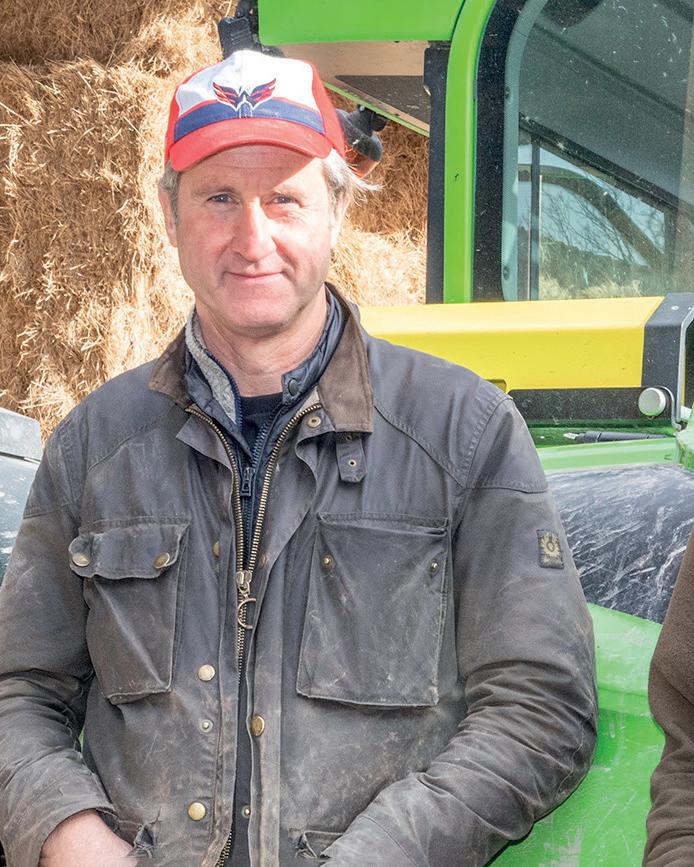
Supplied by local dealer George Browns, the Merlo MF34.7 CS arrived in May 2023.
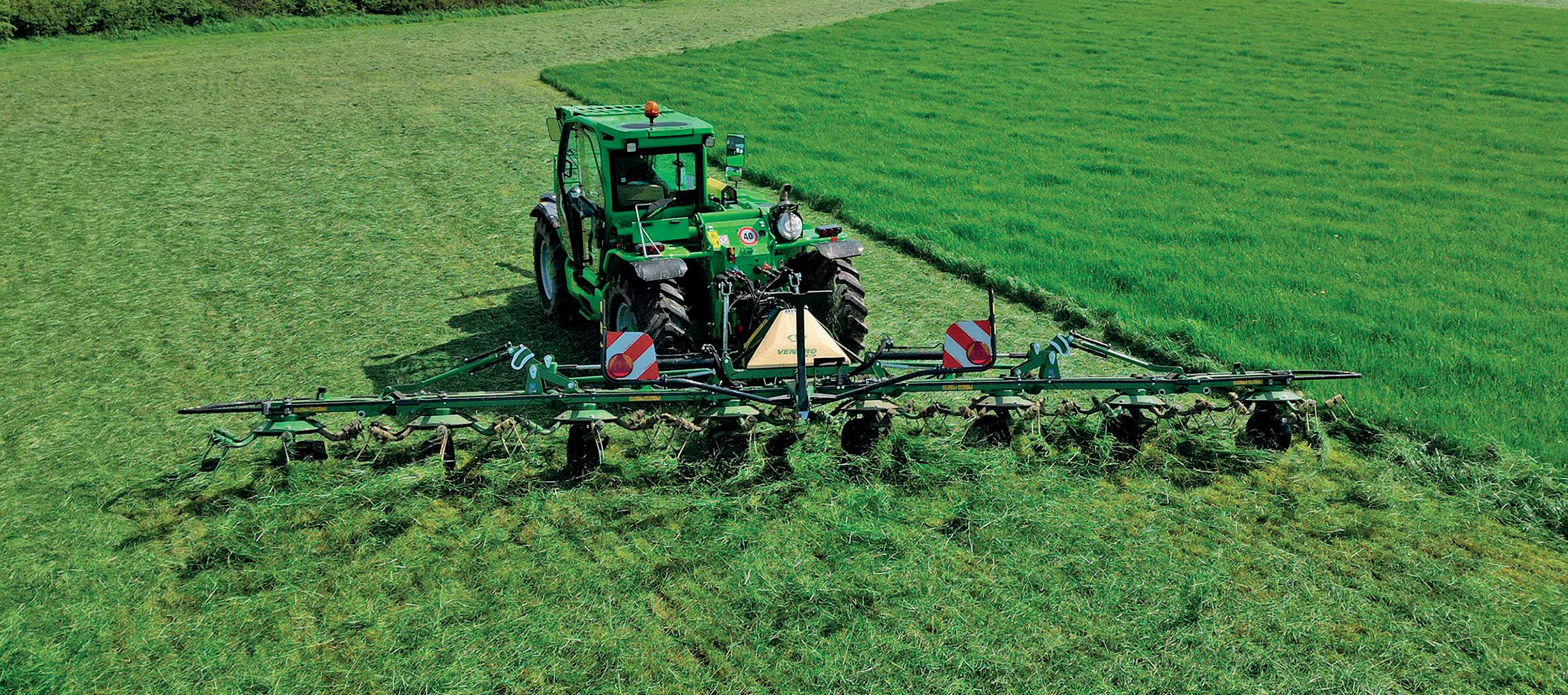
Warborough Farm, where fieldwork includes rolling, tedding hay and pasture topping.
Mr Ruane has recently bought a Kongskilde Triple K cultivator for use behind the Merlo to establish bird seed mixes, and has recently added a log splitter to the inventory. He says a hedge cutter could be another useful purchase.
In CS specification, the Multifarmer brings cab suspension to the mix, elevating its ride comfort above that of a telehandler.
Mr Barber says: “The ride quality is pretty good and the cab is a good place to sit, with a great view all around the machine thanks to the low boom pivot.
“However, while there is a restricted view of the rear linkage, the pickup hitch is nigh on impossible to see.
“We have had two cameras fitted at the back to simplify hitching up.
“It is a far better solution than using mirrors, which can easily become damaged.”
When it comes to attachments, Warborough Farm has invested in
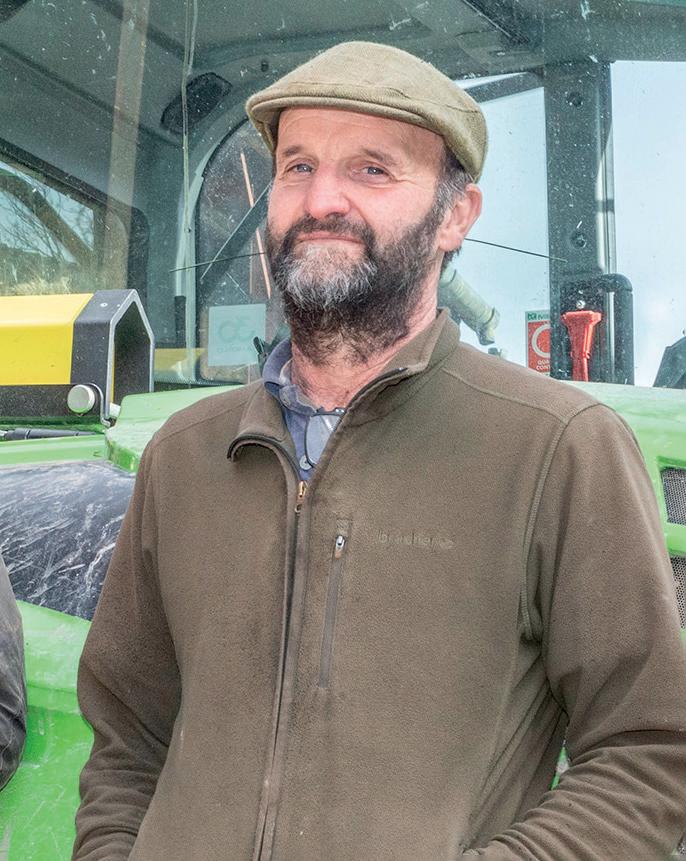

As we are an all-grassland farm with some woodland, a telehandler is much more important to us than a tractorTONY RUANE
pallet forks, bucket, fork with integral grab, big bale handling attachment, bucket brush and a personnel basket.
Mr Barber says: “You can also set engine revs on a dial and use the travel pedal to vary the forward speed. This is really handy when making the most of hydraulic flow or pto speeds, for example, when tedding.”
Both Mr Ruane and Mr Barber like the easy access to the engine compartment for daily checks, plus cleaning and greasing. Both say the handler is easy to use and its controls are intuitive.
Joystick
Mr Ruane says: “The joystick is effortless to use, as are the hydraulic spools, and one of the better features is the chassis levelling, which is brilliant when unloading pallet loads from lorries.
“It does not matter how the machine sits; it only takes a tweak of a lever and the chassis can be levelled to match the bed of a lorry. And it is a feature which also makes the Merlo handy when levelling out too.”





Mr Ruane has praise for George Browns, which he says ‘has done what it says it is going to do’.
He says: “The service so far has been really good. If I was buying another Multifarmer, I would probably go for the 9m model.
“It would be better to have a bit of extra reach, particularly when carrying out building maintenance and repairs to guttering, for example.
“But it will be a long time before we swap – this one is likely to be here for at least the next 10 years.”
As one of the most used pieces of kit on a dairy farm, handlers need to be robust and reliable. James Huyton speaks to one dairy which has clocked more than 12,000 hours on the businesses’ JCB TM320S.


When it comes to handlers, for Lancashire-based Rowlands Dairy there is one name which stands out above most.
Over the years, the farm business
has owned and operated several handler brands, but the current JCB TM320S has been a stand-out performer. Now, with more than 12,000 hours on the clock, owners Marcus and Neil Rowland relay their views on this solid performer.

Neil comments on how reliability is paramount for the farm business, which milks 160 Holstein Friesians and sells all the milk produced on-farm directly through a local milk round and wholesale bottled milk business.
Marcus and his uncle Neil Rowland’s core focus is running the farm business and they are the main users of the machine.
Rely
Marcus says: “Both myself and Neil rely on the JCB to start first time every time morning and night.
“There is nothing worse than a machine that lets you down at five in the morning or 10 at night when you need to get on.
“Yes, no machine is perfect and we have had issues with hydraulic pipes leaking or splitting at high wear points recently, but that only reflects the hours,” he adds.
Both Neil and Marcus agree that the handler’s 4.8-litre JCB EcoMax
engine has never missed a beat since they got the machine from new.
“Even with more than 12,000 hours on the clock, it still starts first time every time,” says Neil.
Marcus says: “We have tried different machines over the years, but nothing has ever really matched the JCB for handling and performance for what we want out of a machine.
“We have some tight buildings and feed passages around the farm, but the design of the pivot steer means the rear axle follows well in tight spaces.”
Marcus was also keen to highlight that after trying a competing manufacturer’s fixed-frame fourwheel steer variants, they did find that it offered a tighter turning circle on the yard, but not the manoeuvrability they would get from a pivot steer machine.
Both Marcus and Neil pointed out that the businesses’ dairy and beef units still run on a loose-

housed system. This means they buy 280-325 hectares of standing straw from surrounding farms each year.
Field loading and carting are performed by the farm’s John Deere 6630 loader tractor, with the TM320 S handling most of the unloading back at the yard.
The JCB’s 5.2-metre lift height and 3,200kg capacity are viewed as ample to handle and stack either three 120x90cm six-string bales or four 120x70cm four-string bales.
In charge
Marcus says: “As you can imagine 700 acres of straw produces a lot of muck throughout the year and the JCB is in charge of loading and handling everything out of the muck midden.
“When it comes to loading, I am not shy about putting the machine through its paces, pushing into the heap to get that last little bit of muck.
“I am a cowman at heart and not over fussy with machines, but even
with my driving every day, it does the jobs we ask,” he adds.
Neil says: “I have never been one for automatic transmissions, many of the competing manufacturers opt for hydrostatic transmissions, but they are not for me.
“The six-speed power shift gives me the revs and control I need when operating around the yard.”
The TM320 S operates the brand’s own six-speed powershift transmission, with four ranges for yard operations and two most suited for road.
Marcus says: “The six-speed box gives ample range choice for yard work, with automated range change good for road work.
“Speaking of road work, the machine is surprisingly smooth on the road,” he adds.
After 12,000 hours the JCB may be looking a little rough round the edges and the frayed driver’s seat aside, the paintwork as a whole looks remarkably fresh for a machine that has spent most of its life in and around muck and slurry.


Marcus says: “Every four to five weeks we are in sheds, mucking out pens.
“Yes, there is rust building around the front wheel rims and a little on the rear weight, but beyond that, the paintwork is pretty solid.
“My biggest issue is stopping the stickers from peeling when jet washing,” he adds.
issue recently, failing on pinch points, but they have done some work.”
Asked if there was anything they would add or change on the machine, Marcus is quick to point out a few details.
He says: “Physically nothing jumps to mind, it is more little details – such as the lack of a reversing camera, LED lighting and a phone holder is what the machine is missing.”
Many of the items listed could be


three of the four sides of the en-
When it comes to serviceability, the machine’s design and layout gives the operator clear access to three of the four sides of the engine bay. Filters are easily accessible for on-farm service if required.




Marcus highlights he is no service technician, but the design and accessible nature of the machine has meant downtime has been kept to a minimum, if there was a breakdown.

Marcus says: “Hydraulic hoses have been the biggest







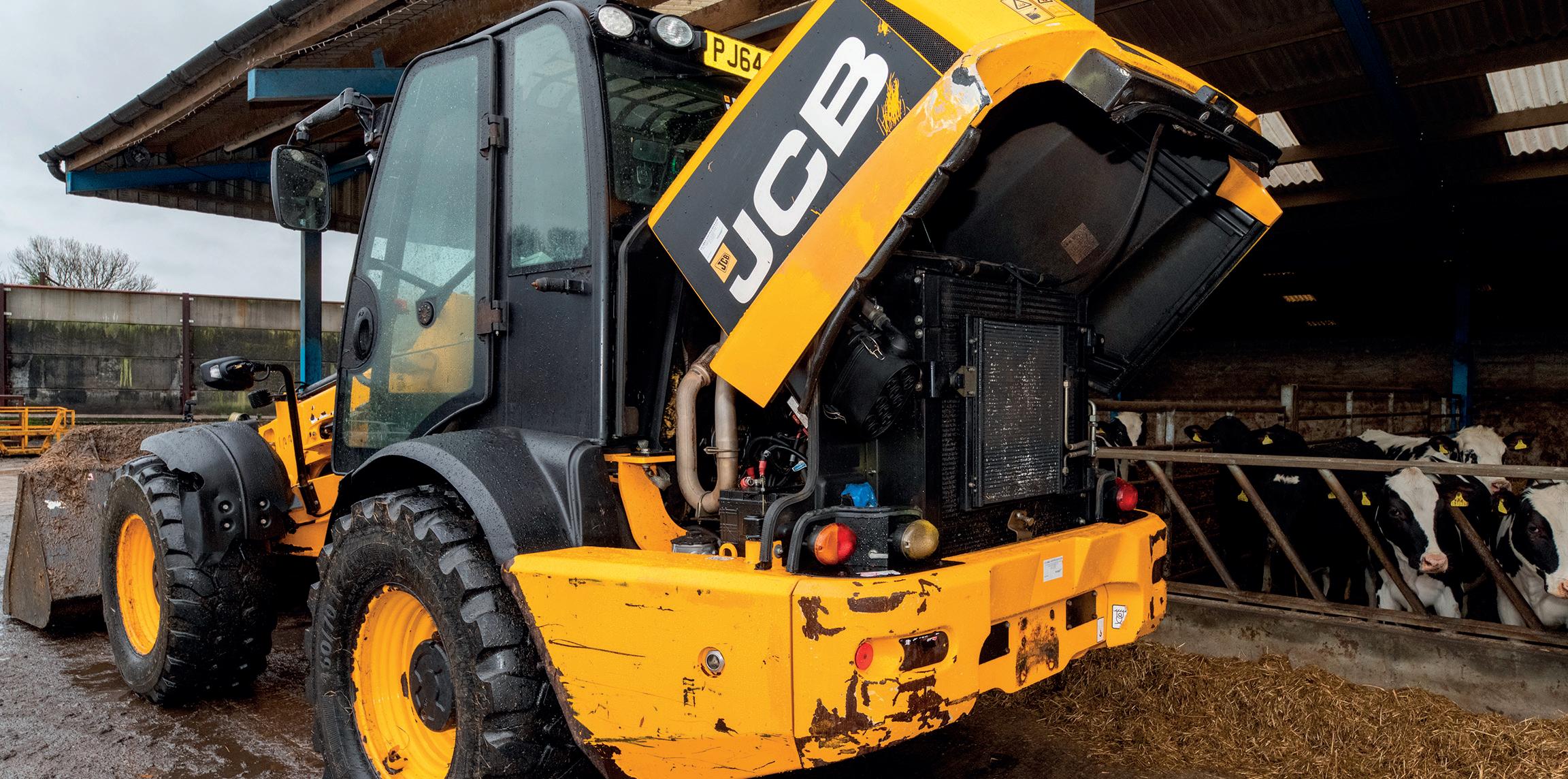
retrofitted, with Marcus also pointing out several of these items are now standard features on the new variant.
One of the features the family

enjoy on their machine is its two access doors and steps on both sides of the machine. Something you do not get on newer models, they add. Inside the cabin, everything is

MAJOR LAMMA exhibitor and renowned British manufacturer JCB, has celebrated chair Lord Anthony Bamford’s 60 years of service in the business.
Starting in the family business on a workshop floor in 1964, Lord Bamford has played a pivotal role in the success of JCB.
During the past 60 years, Lord Bamford has seen the company grow, its latest results show its sales turnover reached £5.7 billion in 2022.
This is partly down to considerable growth in emerging markets, such as India, Brazil and China.
Back in the UK, the Government is
looking to manufacturers for answers on de-carbonising machinery and the way agriculture and the wider industry operate.
Lord Bamford continues to spearhead industry development with a £100 million project developing hydrogen combustion engines, potentially a carbon-neutral fuel for the future.
In recognition for his longstanding and continued work in the industry, Lord Bamford was presented the Long Service award at JCB World Headquarters by JCB chief executive Graeme Macdonald.
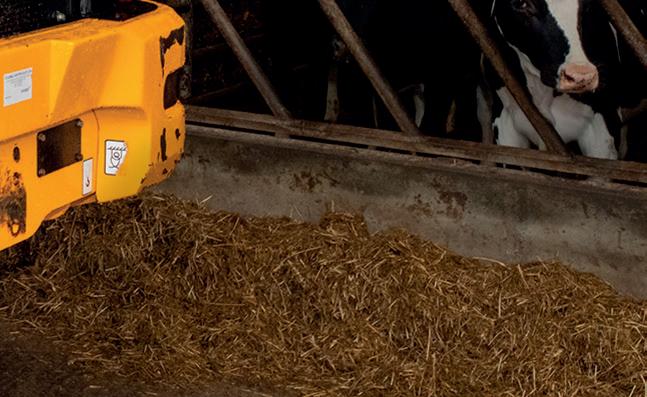
clean, clear, functional and durable.


Marcus says: “For me, JCB has got the joystick layout right, all buttons and switches work how you would naturally expect and you do not have to think about controls when using the machine.”



have




Every machine has its downside and for the Rowland family it is the limited visibility over the bonnet, however any future machine will have a reversing camera to counter that.
The bonnet and engine positioning do have their benefits, with the TM320S set at the back away from dust and debris which dramatically reduces the risk of any air intakes getting blocked when handling large quantities of straw, a more common issue for handlers with side-mounted


engines, creating the need for a reversible cooling fan.
Marcus says: “The TM does not have a reversible fan, but it does not need it.
“The engine always keeps clean and it is not often I need to blow the filter out even in dusty conditions.”
Neil says: “The machine is bombproof, nimble and handy around the yard.”
In 10 years of service, the handler owes the business little more than general wearing parts, service consumables and tyres.
‘Touch wood, any future machines will do as well’, they add.


The system uses a hydraulic and spring tension mechanism to increase the resistance on the bale-forming belts.
FRENCH implement manufacturer
Kuhn has introduced a new VB 3200 variable chamber round baler range, which is claimed to offer users 10 per cent additional capacity and bale density compared to the outgoing 3100 series models.
The new models, liveried as the VB 3260 and 3290, feature the manufacturer’s Progressive Density Plus system, which has been developed to deliver the claimed increase in bale density.
The system uses a hydraulic and spring tension mechanism to increase the resistance on the bale-forming belts, with an additional belt tension arm providing further crop compression as required.
The driveline has been reinforced for improved longevity, including a stronger main drive chain, a larger rotor drive chain, and additional reinforced bearings and seals.
Crop feed options include a non-cutting rotor which claims to provide an even swath flow into the baler.
For crop chopping, a 14- or 23-knife

rotor can be specified, with each design providing a respective theoretical chop length of 70mm or 45mm.
Both models are available as a bale-wrapper combination liveried as VBP machines. These units are said to have 15 per cent faster bale transfer times with a faster opening tailgate
system. Combination units are also fitted with an automatic unloading function for users working in straw, where the first bale can be held and bales released in pairs.
A new wrapping system is claimed to reduce the quantity of film applied to the centre of the bale and should
ensure the edges are covered first to protect the most vulnerable parts.
Control of models can be achieved through the tractor’s IsoBus terminal, or through Kuhn’s VTI 60, CCI 800 or CCI 1200 IsoBus screens. Non-IsoBus machines are supplied as standard with the VT 30 control unit.
Farmers Guardian delivered directly to your door every week including full digital access. Plus, check out our brand-new features exclusive to Farm Futures members.
Future-proof your farm business, gain insight and exchange knowledge with a Farmers Guardian Farm Futures membership.

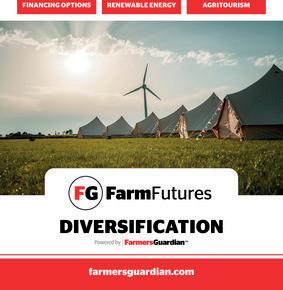




Included in your membership:
Insight – Quarterly, in-depth, analytical reports into the latest agricultural trends. Recent topics include, diversification and low carbon agriculture Exchange – A series of digital events focused on learning from real case studies and exchanging knowledge with agricultural thought leaders




Weekly Digest email – From the desk of FG’s editor every Sunday morning, discover exclusive insights which impact the business of profitable farming Members’ Lounge – Enjoy an exclusive space for members to network at leading events, such as LAMMA, CropTec and Farm Business Innovation.
THE hogg trade is currently bouyant and, with potential good prices to be gained from hoggs still to finish, producers should not be tempted to reduce bought-in concentrates or sell hoggs which are not completely finished, says nutritionist Calum Littlejohn, of East Coast Viners.
Mr Littlejohn says: “It will pay to finish hoggs well at current prices with high energy nutrition in the last few weeks for the best killout performance.”
He says that producers who have kept lambs for longer to take advantage of grazing or for the historical strong prices around Islamic festivals and Easter, need to ensure hoggs are getting sufficient energy and protein to sustain gaining weight in the final stages.
Supplementing forage with cereal-based feeds and minerals helps to minimise health issues and improve feed conversion ratio (FCR).
Mr Littlejohn says: “The FCR of the hoggs is one of the key factors which drives the profitability of your sheep enterprise, but is often overlooked when you look at the price of buying-in concentrates.
“FCR is at its optimum when lambs are youngest and starts to decrease as they get older and they need more energy to maintain weight gain.
“With feeding costs still relatively high, farmers may be keen to spend less on feed, but the quality of the feed



will impact the feed conversion ratio and, in turn, the profit margin.
“You need to make sure that whatever you are buying is of the highest quality, which may not necessarily mean the cheapest.”
By feeding hoggs a good quality finisher pellet, producers could achieve a FCR of up to 5:1. In other words, for every 5kg of feed consumed, this equates to 1kg of liveweight gain.
Mr Littlejohn says: “Check the
IN a bid to widen breeding options to farmers, Sainsbury’s and ABP are partnering with Cogent as a service provider for its Gamechanger beef supply chain.
Gamechanger producers will now have access to conventional semen from Cogent, and from late March onwards, will also have access to the Ultraplus Male sexed product.
The move, Sainsbury’s and ABP say, will enable the programme to grow and will further drive efficiencies and consistency of Aberdeen-Angus calves entering the Gamechanger supply chain.
The Gamechanger programme, which has been in place since 2015, currently includes more than 500
farms with aspirations to grow significantly. Farmers can be involved at different stages, whether calving, rearing or finishing.
Until now, farmers producing calves for the Gamechanger integrated supply chain have had access to Aberdeen-Angus genetics from a single genetics provider.
Richard Phelps, group agriculture director at ABP, says: “We are focused on continuing to improve the Gamechanger programme, and are excited to be working with Cogent to offer our farmers a wider choice of genetics.
“This enables us to continue to
provide the dairy farmers in our supply chain with a secure and profitable calf outlet to produce high quality, sustainable beef while maximising and delivering efficiency throughout.”
Cogent managing director Stuart Boothman says: “At Cogent we recognise the fundamental role the dairy beef cross-bred plays within today’s industry.
“We are delighted to showcase the strength and consistency of our beef on dairy programme, extending our elite Aberdeen-Angus offering to the Gamechanger supply chain.”
Beef from the Gamechanger programme is retailed as part of the Sainsbury’s Taste the Difference Aberdeen-Angus beef range.
labels and look out for a 15 per cent protein diet, with quality proteins, such as soya and wheat distillers’ dark grains.
“Also make sure high energy cereals are near the top of the label. Cheaper cereal co-products can be used as fillers, but may not be as palatable or energy dense, both of which help consistent weight gain.
“You also want a full mineral package along with ammonium chloride to reduce the risk of urinary calculi in male hoggs.”
When introducing hoggs to concentrate feeding, it should be done gradually over a couple of weeks through trough feeding, says Mr Littlejohn.
He advises gradually stepping up the feed rate until the sheep are on adlib feeding. This helps to reduce gorging on concentrates and therefore reduces the chances of acidosis.
Once sheep are on to the feeding, care should be taken especially if ad lib to make sure feeders are always full. This reduces smothering of sheep when feeders are topped up and helps reduce the acidosis risk. Access to fresh clean drinking water is also essential.
r
A NEW Innovate UK-funded agritech project with the potential to transform the detection and treatment of dairy cow lameness is underway in south west England.
The ‘hoof monitor’ initiative is developing an artificial intelligencepowered thermal imaging tool capable of identifying lameness at its earliest stage and in cows’ individual feet, allowing speedier intervention.
The device detects changes in temperature in individual legs and feet,
enabling treatment before the condition visibly affects the cow.
This helps reduce both the cost of treatment and production losses.
Project founder, James Willcox, of Winson Agriculture, says: “As well as having serious welfare implications, lameness costs the dairy industry £53.5 million annually, and is second only to mastitis in terms of its economic impact.
“Beyond the immediate welfare and economic benefits of treating lameness sooner, Hoof Monitor could contribute to a reduction in production inefficiencies and associated carbon emissions per litre of milk produced, helping to make milk production more sustainable.”
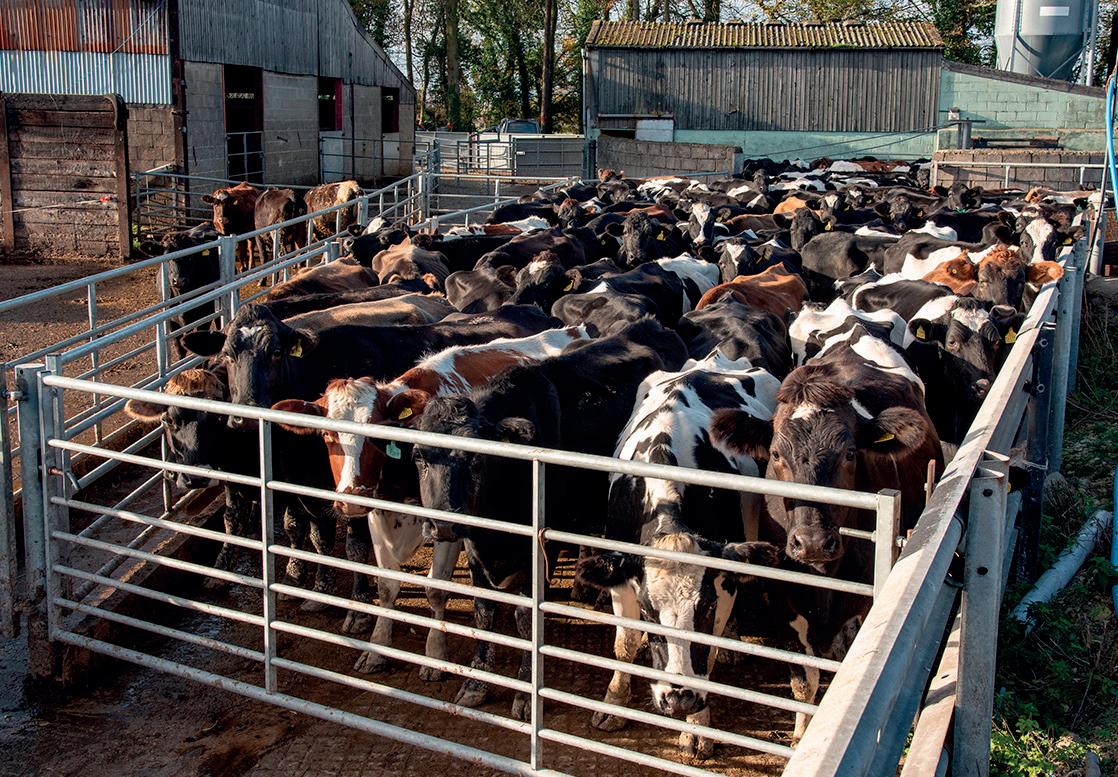
A new artificial intelligencepowered tool aims to detect and treat cow lameness.

Winson Agriculture has teamed up with Agri-EPI Centre and software company Rhyze Softworks to develop a proof-of-concept Hoof Monitor device, supported by a grant from Innovate UK.
Fitted to a cattle race to analyse
cows’ legs and feet as they walk past, the prototype is currently being tested and developed with the 200-strong herd at Agri-EPI’s Southwest Dairy Development Centre in Somerset.
It will later be trialled on larger commercial farms.
THIRD-generation Northumberland sheep and cattle farmer Willie Weatherson is the new national president of the North of England Mule Sheep Association.
Mr Weatherson takes over Northumberland farmer Peter Lee, of Morley Hill, Whitfield.
Last year, the Weatherson family celebrated a memorable milestone – 100 years as custodians at Edges Green Farm, above Haltwhistle,
which is right in the shadow of Hadrian’s Wall and first farmed by Mr Weatherson’s grandfather, also Willie, from 1923.
The 728-hectare (1,800-acre) hill farm, a mixture of moorland and pasture, both owned and rented, is home to 1,250 ewes, comprising 1,000 Northumberland Blackface and 250 Texel and Cheviot, with Bluefaced Leicester tups sourced from recognised breeders.














Young farmer Rebecca Jenkins is working hard to establish a pedigree beef herd, which can be run alongside her family’s suckler cows. Howard Walsh reports.
When you are only 20 minutes from John o’Groats you need to be prepared to put in plenty of southbound miles in order to source foundation stock for a new herd of cattle.
Nevertheless, that is what Rebecca Jenkins was happy to do just over three years ago, supported by her father Martin. It all started with her being interested in establishing her own beef herd and after doing some research she was attracted to British Blondes and saw for herself the quality progeny which Blonde bulls were capable of producing.
Ms Jenkins says: “After I researched the breed thoroughly, I saw the length and conformation of the youngstock that was being produced and that was what really set me thinking about establishing a pedigree Blonde herd of my own. But I needed to find out more about calving ease, growth rate and temperament, and of course, if there was a place for Blonde bulls on my family’s suckler cows.”
The Jenkins family’s own farm, Ha’of Bowermadden, inland
from Wick in Caithness, carries a commercial suckler herd of about 80 cross-bred cows alongside 400 Scotch Blackface and Mule ewes, and has seen several breeds of terminal beef sires in use over the years.
Ms Jenkins is in partnership on the 53-hectare (130-acre) all grass farm with her father and mother Gillian and points out the cattle use most of the grass, as for most of the year the sheep are run on 809ha (2,000 acres) of hill.
The suckler cows currently comprise a mix of genetics, not least Limousin cross North and South Devon with a splash of British Blue and Simmental.
As third generation farmers, Ms Jenkins’ parents moved north from Devon in 1996, initially to Eday in the Orkney Isles before buying Ha’ of Bowermadden 17 years ago. The initial move north, Ms Jenkins says, now 28, was a matter of ‘more acres for your money’.
She is employed full-time with a telecoms company and admits there is
always plenty of work to be done at home before and after work, as well as weekends.
Elder bother Peter has his own forestry contracting business but lends a hand on the farm when he can, and his two young sons Robert and Lewis enjoy helping Ms Jenkins with the cows.
The first British Blondes came to Ha’of Bowermadden after she saw Neil and Jessica Barrett offering a few heifers for sale from their East Yorkshirebased Everingham herd.
Ms Jenkins says: “Dad and I made the six- to seven-hour drive down there, and eventually came home with the first pedigree bull which was semen tested, a heifer and two cross-bred heifers.
“I could see they were of the length and shape I was looking for and I was assured of the calving ease of the breed, which was important for us.
“The heifers were only young when I got them, but once they were old enough, we were able to use the bull on them which would start the beginning of my pedigree line.
“In the meantime, we gave the bull a

■ As well as the Bowermadden herd of British Blonde cattle, the farm also carries a 80 cross-bred sucker cows and 400 Scotch Blackface and Mule ewes
■ Cattle can normally graze from May until October
■ For most of the year the sheep are run on 809 hectares (2,000 acres) of hill land
few of our commercial cows to begin with as we were interested to see how the calving would be on the variety of different breeds the bull went to.
“When the first few calves started to hit the ground, we were pleasantly surprised with the comparatively quick calvings and most of all, how much energy and life they had.
“Calves were quickly on their feet to have their first feed. And I think seeing them behave like this was testament to how easy the calving can be as they are


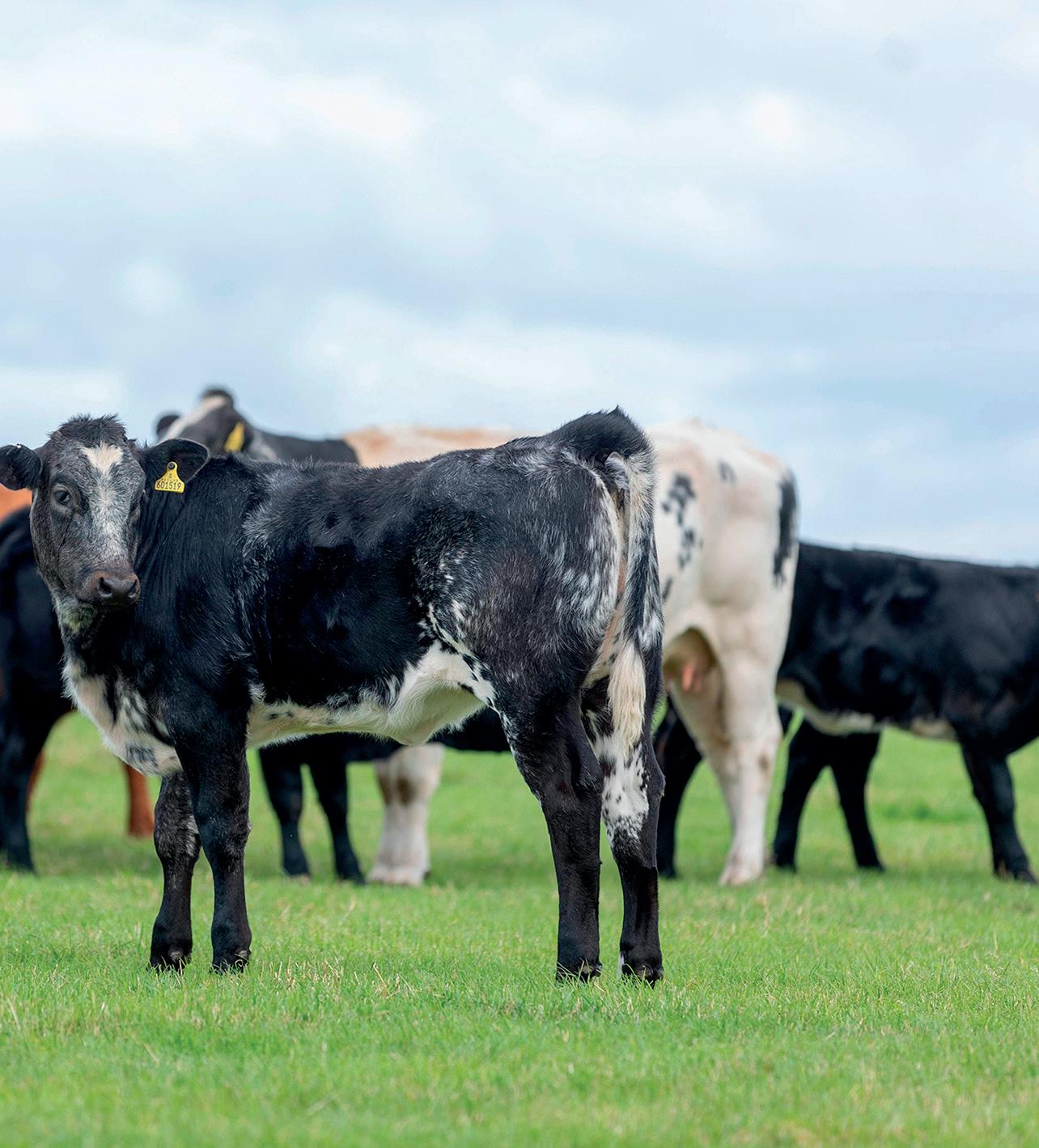
not going through a lot of stress, which was the main factor we were interested in when starting with the breed.
“What also became apparent, was the growth rate as the calves were rapidly filling out over the first few days which was also a big factor in my choice of this breed,” she adds.
“We sell everything as stores and we have noticed with the first Blondesired ones, there has been a bit of a premium on price due to the weight and size difference of them when we put them into market.
“What I really want to do is follow some of them through and see how they grade as there are plenty of finishers around here and I want to get as much data as I can to help promote the
breed. I would also like to finish some of our own eventually in the future.”
A second bull was later bought from the Carlisle May sale, also as it happens, carrying the Everingham prefix. The 15-month-old Tsar also made its journey north to join Everingham Percy and they are now the only two serving bulls on the farm.
Ms Jenkins says: “I am really keen on pedigree breeding and I have made a few other strategic purchases. This includes a pedigree heifer and a crossbred from William Laird in Fife. I have also bought three heifers from the Carlisle Society sales, Gleniffer Ruby from Alan Walker, Everingham Rhyme from the Barretts, and most recently a Lucyland in-calf pedigree heifer from Lucy Corner


which I am excited will bring in another line.
“All have given me a strong foundation to grow my herd.”
Despite having quite a heavy workload, she is also enthusiastic about showing along with her two nephews who are keen to help with that.
Ms Jenkins says: “Last year I was showing two heifers at our local shows for the first time and this season I have shown a heifer, a cow and home-bred calf, and also the new bull Tsar.
“My ultimate target is the Blonde pedigree breed classes at the Royal Highland and seeing my own Bowermadden prefix in the breed society sales.”
Herd management at the home farm is fairly straightforward. Although the winters can be wet and windy and the summers sometimes short in Caithness, the sucklers can normally graze from May until October.

“We buy straw for bedding and barley for feeding all locally,” she says.
“Some cows will calve inside and some at grass and we have found no difference in how well the calves respond to the environment into which they are born.
“The cattle are all over-wintered on silage which we make ourselves and we like to try and reseed one field each year to try and keep the quality of feed as high as we can.
“Most of the calves tend to be weaned at housing and are fed rolled barley and a beef nut which we have found they respond quickly to by putting on a good amount of weight and overall condition.”
In the long-term, it is expected Ms Jenkins will take hold of the reins at Bowermadden and with her interest in promotion of the British Blonde, she hopes to see it proliferate even more in the northern extremities of the British Isles.
An open mind and passion for little improvements are some of the keys to successful dairy businesses – and those traits extend to staff management too. Farmers Guardian reports.
ALTHOUGH individual farmers may be excellent at cow management, if they do not look after and train their staff, then the business will never be as successful as it could be, says Paul Harris, of staff specialist REAL Success.
Ms Harris says: “Reading the Andersons Centre’s report on top performing dairy farms, there were some clear trends which the industry really needs to address.”
“It is great to see more profile given to the importance of a vibrant and diverse farm labour force, but these are not new issues and we need to see greater change on the ground if farmers are serious about improving long-term productivity and resilience.”
The Anderson’s report found that the best performing farms were open minded about transferable skills and recruiting entrylevel staff based on potential rather than previous skills.
“This opens the door to recruiting from outside the small pool of existing farming talent, something which is vital if we are to address the serious labour shortage facing the sector,” says Mr Harris.
“It can cost a business between £15,000 and £30,000 to replace an employee, so it is important to get it right. When someone leaves, it is tempting to recruit quickly, but the wrong person in the role can easily upset the dynamics of the team.
“Taking people on – based on personality profiling – with less experience, and training them, often produces the best results.”

Offering good working conditions, including fair rotas, adequate time off, a variety of tasks and time for training and development will help farmers to both recruit and retain the best staff, said the Andersons report.
In addition, having clear protocols in place for all to follow will ensure consistency of cow and calf management, while taking health and safety seriously will benefit all in the workplace.
“Good communication is absolutely key – there is a common myth that you do not need regular meet-
FUTUREsuccessinfarmingwill neednewpeopleregardlessoftheir age,ethnicity,gender,sexualorientation, skillsorthecareerpathwaythat theytook,saysHelenBrookes, headofbusinessdevelopmentat theCentreforInnovationExcellence inLivestock(CIEL).
MsBrookessaystoovercome thewiderangeofchallengesthe industryfaces,thereisaneedto driveresponsibleagri-innovationat unprecedentedlevelsinordertosecure society’ssupplyoffood,fuelandfibres andstimulateeconomicgrowth.
Shesays:“Toidentify,design, developandtestpossiblesolutions,we needdiversityofthoughtandexpertise thatisequaltotherangeandscaleof industryproblems.
“Thatis,morepeoplewithadiverse rangeofskills,mindsetandcommercial experience,aswellasmorefroma diverserangeofbackgroundswhocan drawontheirindividuallivedexperiences toproblemsolvedifferently.”
MsBrookessaysdiversityis essentialtofast-trackideasandcreate ground-breakingsolutionsinanysector.
Sheexplains:“Inagricultureitcan breedstrongercropsandanimals, improvesoilandreducethelikelihood ofdiseaseandpests.
“Butwhenitcomestothe demographicsoftheBritishfarming sector,therehasbeenahistoriclack ofdiversity,notonlyintermsof ethnicity,butalsogender.”
“Whilemoreprogressisneeded, theassociatedagritechsectoris spearheadingdiversityatanewlevel witharichstreamofnewpeople emerging,”saysMsBrookes.
“Manyofthesenewleadersapplying technologyanddigitaltoolstofarming arewomen.
“TakeDrEveHanks,chiefexecutive andfounderofMI:RNA,afemale-led gender-balancedteamofexpertswhose award-winningJohne’sdisease
identificationprojectcombinesaunique biomarkertestingtechnologywith artificialintelligencetohelpdetectearlystageJohne’sdisease,whichleadstoa significantreductioninmilkyieldsand weightloss,aswellasincreasingthe greenhousegasproductionfrom affectedanimals.Theprojectaimsto furtherdevelopthistechtoincrease productivity,mitigateeconomiclosses fromthedisease,andassistinachieving acarbon-neutraldairybusinessmodel.
“CIELhasbeenprivilegedtoprovide supporttotheMI:RNAteamasit hasdevelopedthetechnologyand connectedtheteamtothewider livestockecosystemtoensurethe solutiondeliversforfarmers.”
From1ApriltheAgri-TechCentres willmerge,andMsBrookessaysthe plantoformanagritech‘catapult’will furthersupportfarminginnovationby backingandpromotingdiversetalent throughworld-classresearchand developmentfacilities,businessadvice andaccesstofundingopportunities.
ings or reviews, but open, two-way dialogue will make the team feel valued and ensure you are all working to achieve the same things,” says Mr Harris.
“Farmers rarely sit down with their staff for a more formal review, and feedback may be avoided or poorly delivered.
“Having a positive, structured review can unveil deeper issues that need to be addressed, while providing the opportunity to deliver positive feedback and constructive criticism.”
Dealing early with succession planning is another clear trend among the most successful farmers, the Andersons report says.
“This gives the younger generation, whether part of the family or not, the confidence to invest in the business and their own development,” says Mr Harris.
“And it enables the older generation to plan for when they start to step back from the business, rather than having to remain in the traces until they drop.
“People are the absolute backbone of this industry, but outdated attitudes and perceptions are holding it back. Farmers themselves are the key to changing these perceptions and reversing the labour shortage they are facing. Just a few simple mindset changes can help to turn a poorly performing farm into a top-tier one.”
For more on careers in agriculture, see our careers special starting on page 34.






















All prices quoted in p/kg.



Source: ScotEID/IAAS
Source: MartEye/LAA




All prices quoted in p/kg.
Source: MartEye/LAA










6-12
Figures show livestock numbers first, then average price per head.


Primestockthroughput,priceandpricechange(p/kg). WeekendingFebruary25,2024.
PRICES dropped in the cattle rings at auction marts in England and Wales to end February.
In the cattle rings, young bull prices had fallen the most by 5.1p/kg to 258.9p/kg.
Cull cows decreased by 0.5p/kg to 154.3p/kg, while heifers were down 0.4p/kg to 279.2p/kg.
Although, steers did improve in value by 2.8p/kg to 276.5p/kg.
There was an upturn in the value of lamb by 10.9p/kg to 333.4p/kg.
However, pigs had dropped in value by 4.8p/kg to 148p/kg.
As Farmers Guardian went to press on Wednesday (February 28), UK LIFFE Wheat prices for May 24 were trading at £165/tonne, an increase of £2.25/t on the previous week.




Ashford
Tu 830
Castle -Bentham -Bishops Castle -Bridgnorth - -
Mo 246
Hawes
- -
- -
-

Carmarthen
Knighton


Medium 2 3L 3H 4L 4H E 713.5 (49) 716.3 (157) 713.6 (23) 697.2 (2) 660.0 (2) U 712.5 (572) 710.3 (2135) 707.8 (792) 683.4 (144) 666.0 (11) R 706.7 (3701) 704.3 (10221) 704.4 (5358) 681.9 (892) 655.3 (49) O 699.1 (2441) 698.7 (4187) 693.8 (1712) 680.3 (224) 642.5 (4) P 581.8 (8) 585.1 (2) Average: 702.1 (33,037)
Pleasenote:AHDBweanerdatahasbeen suspendeduntilfurthernotice. SLAUGHTERINGS EstimatesforGB(perhead),W/eFeb25,2024 2024 %change (2023) Pigs 155,832.20 -4.07 Sheep 216,700.52 -1.83 Steers 18,270.90 +1.99 Heifers 14,596.22 +7.26 Youngbulls 1,807.51 +0.44 STORE LAMBS Source: IAAS/ScotEID Day No. Ave. STANDARD PIG PRICE (SPP) WeekendingFebruary17,2024 Weight Number p/kg Change Upto59.9kg na na na 60-69.9kg 1,119 201.39 -0.51 70-79.9kg 6,545 212.42 0.14 80-89.9kg 20,609 213.50 0.06 90-99.9kg 23,159 212.38 0.01 100-104.9kg 6,149 210.81 0.13 105.0kgandover na na na Allcleanpigs 61,218 211.22 0.07 70-104.9kg 56,462 212.62 0.07 EU spec average 211.22 0.07 UK spec average 207.63 0.07
HAY AND STRAW PRICES February28,2024
Wednesday,February28,2024(£pertonne).
Wednesday,February28,2024(£pertonne).
LastupdatedFeb27,2024
BPS ENTS English
Deadline – Early 2024*
Price at Average deadlines prices (2023)
Non-SDA - £80.59
SDA - £99.41
Moorland - £24
BPS ENTS Welsh Deadline – May 15, 2024
Price at Average deadlines prices (2023)
£50** £65
BPS ENTS Scottish
Regions 1, 2 and 3
Deadline – April 2, 2024
Price at Average deadlines prices (2023)
Region1 £140** £149.47
Region2 £30** £40.34
Region3 £12** £15.44
BPS ENTS Northern Irish Deadline – May 3, 2024
Price at Average deadlines prices (2023) x1.0** x1.0
*FortradingDelinkagerefamounts;30p-80p**per £1ofDelinkagereferenceamount.**Estimates.
ENGLISH DELINKAGE REF DATA: averageof 2020/21/22claims.Seller’s2023claimnotneeded. Estimatedreturn£1.20/£1refamountwithbuyer’s delinkpaymentlessthan£30,000post-transfer.
SubjecttoDelinkagevalues2025-27.
BIODIVERSITY NET GAIN: English:Defra estimates£25,000-£200,000/unitexcluding VATandassociatedfees,subjecttolotsize.
LasttenderFebruary2,2024,nextMarch8,2024.
NUTRIENT NEUTRALITY: Long-termsales alltypesagricmanexcludingspecialisthabitat creation.Nitrates£3,000-£4,000/unit(£18,000£206,000/ha);phosphates£50,000-£65,000/ unit(£2,000-£169,000/ha). CARBON: Woodland Carbon>£35/WCU>£25/PIU.May2023WCG reverseauctionaverage£19.76. WATER: English abstractionlicenceslessthan£3-£15/cu.m.
Source: Townsend Chartered Surveyors




Lastupdated
Wednesday,February28,2024.
1.
2.
3.
Wherestated,data providedbyAHDB.
LastupdatedFebruary28,2024 Source: Straights Direct
WeekendingMarch3,2024
LastupdatedFeb25,2024
Source: AHDB/LAA/IAAS
Key:Allpricesinpoundssterling.Currency,£/$1.2694;£/€1.2757
Guidepricesindicatedincludedeliverychargeof£6/tonne. ✸ =Aftersafearrival; F =Firsthalf; S =Secondhalf; ● =March; ✥ =April; ✦ =November/January; ◗ =November; ▲ =February/April; ✧ =May/June; ✪ =August/October
December2023
Source: AHDB
1.Thiscontractwillreceivea1.33pplguaranteedminimumpayment.
2.Thiscontractwillreceivea0.50pplmemberpremiumpayment.
2.Thiscontractwillreceivea2.06pplTescocheesegrouppayment.
3.Thiscontractwillreceivea1.00ppldirectpremiumpayment.
4.Thiscontractwillreceivea0.40pplactual13thpayment.
5.FormerlyGlanbia-Llangefn.
Retailerpricesupplementsareincludedwhereapplicable.Supplementslistedareinadditiontolistedmilkprices.
UK milk deliveries in November 2023 were down 2.6 per cent on the year at 1,160 million litres. Cumulatively, this was 0.4 per cent down on the year to date.
November 2023 GB milk deliveries down 3 per cent for the same period at 976m litres. GB milk deliveries for the year to date were 0.5 per cent down.
















He has only just celebrated his 18th birthday, but Ben Wilson has been earning his place at the auctioneer’s rostrum for a good few years already.
Like many a farmer’s son, Ben spent school holidays trailing around after his father at the local livestock markets.
It was not long before somebody at Thirsk Livestock Market, where the family’s sheep are sold, asked if he would like a droving job during the summer holidays.
Ben says: “I did not need asking twice. I have never wanted to be anything else but an auctioneer.
Being in the thick of the action is what Ben Wilson enjoys most. Sarah Todd meets the teenage auctioneer bidding to be the best. The sellers are not going to have any respect for you if you cannot appreciate what good livestock they have brought to sell
“I have always loved the buzz of being at market.”
He was just 16 when, while clerking at the Saturday fur and collective sale for main auctioneer Tony Thompson, he got his first go at selling.
“There were only about 10 people watching so Tony let me have a go at selling – just a couple of rabbits and a few ferrets,” says Ben.
“He was very good at how he did it, just casual, so there was no time to get nervous.
“The following week I got to sell some sheep and I loved it straight away.”
Ben is quick to praise the support he has been given by the rest of the mart team, especially auctioneer Emma Coupland.
Emma grew up on a livestock farm just outside Barnard Castle and also had her sights set on being an auctioneer from a young age.
“One Tuesday night Emma rang me and told me I was selling sheep on
Ben’s ABC of becoming an auctioneer
■ ASK: Therewasnovacancy advertisedforthepositionof traineeauctioneer.Benhadseen themadvertisedatothermarkets andaskedifsucharolecould becreatedforhim.
■ BANTER: Whilebeingpolite andrespectfularekeywordsfor anybuddingauctioneer,pushing yourselfoutofyourcomfortzone andtalkingtopeopleabouttheir livestockorwhattheyarelooking tobuyisakeypartofthejob.
■ CURIOSITY: Alwaysbe interested,listenandlearn.
BEN WILSON

the Thursday. I sold a few ewes and I have not really looked back,” says Ben, who is a member of Kirkbymoorside Young Farmers Club.
He says the club’s strong stockjudging record has stood him in good stead.
“I still try to get to YFC when I can. Some people think auctioneering is just about standing up and selling.
“But it is about much more than that and one of the most important things is knowing your stock.
“The sellers are not going to have any respect for you if you cannot appreciate what good livestock they have brought to sell.
“This is what Emma has been brilliant at teaching me: knowing your stuff before the sale starts, such as looking over the animals and having a decent idea what price to be starting them at in the ring.
“Nobody wants you to be kicking the bidding off too low or wasting time going in too high – especially if there are a lot of animals to get through.”
Ben, who has recently moved from just selling fat and cull ewes on to sharing the stores with Emma, as well as auctioneering pigs, says talking to farmers and sellers is another important skill he has learned from the team at Thirsk.
Being able to telephone them or call around at somebody’s farm, he says, is important.
“Having a chat to them about their stock and what you think they will be











Ben Wilson has earned his place at the auctioneer’s rostrum at Thirsk Livestock Market despite his young age.
worth is a big part of the job,” says Ben.
“It is funny when people sometimes get chatting and ask: Where were you working before you were at Thirsk? And rather than a different market, I have to tell them I was at school.”
Ben left school at 16 and spent a year studying agriculture at Bishop Burton College in East Yorkshire, but a time-

table change which would have wiped out a market day, meant he did not continue into the second year.
“I was very lucky to be offered a full-time job at Thirsk and I really want to pay them back for all they have done for me.
“I have learned it is very much a numbers game, getting the right













amount of stock through to build a regular supply for our buyers.”
His passion for the auction and being at the heart of it will never change, but he is now keen to push his education further and add some more strings to his bow. In 2025, Ben will be enrolling at Harper Adams University to combine his work with






study for a university certificate in professional studies, specialising in livestock market operations and management.
The course involves on-the-job learning and two week-long blocks per year at the university in January and July. But until then, he is happy where he is, and to follow in the footsteps






of those who have inspired him over the years.
He has, however, been involved in some firsts for the mart, which has been operating since 1907.
One of the highlights of Ben’s career to date was the 2023 special show and sale of breeding rams.
It was the first night sale Thirsk had



ever done and just short of 300 lots went through the ring.
Ben says: “We started at 5.30pm and kept going until just before 10pm and it was a cracking atmosphere; there was a real buzz about the place.”
Every
DAN JONESNorth Wales
Dan Jones farms 650 ewes at the National Trust-owned Parc Farm, which sits on the Great Orme, a limestone headland which rises up 208 metres (682 feet) on the North Wales coast near Llandudno. His Farm Business Tenancy covers the 58 hectares (143 acres) at Parc Farm, plus 364ha (900 acres) of grazing rights on the hill.
Ihave arrived home following another superb visit to the US –my second trip across the pond as part of my Hybu Cig Cymru Travel Scholarship ‘Not All Meat Is Created Equally’.
This time I was in Texas. I was once again blown away by the sheer scale of the farming operations.
From pure-bred Hereford ranches selling 200 bulls annually, a goat farmer expecting 9,000 kids within the next four weeks, to a feedlot, home to 120,000 cattle.
Located at the top of the Pan Handle, is the aptly named USA Feed Yard.
With three miles still to go, and despite it being -5degC outside, the car window firmly shut, there was a definite aroma in the air.
It reminded me of time spent shearing in slaughterhouse lairages, where the ammonia would sting your eyes and linger at the back of your throat.
At the USA Feed Yard they finish 150,000 beasts every 12 months, employ 90 staff, feed 760 tonnes a day (a mixture of corn, silage, hay, palm oil, beef tallow and antibiotic) and have their own gas filling station to keep

‘I was once again blown away by the sheer scale of the farming operations’
everyone on the move. It took us twoand-a-half hours to drive around the pens.
While the set-up is a world away from any lush green pastures, the cattle all looked fit, healthy and content. It was clear this system produced prime quality beef.
Another of my visits took me to Hereford City – Beef Capital of The World. I spent a fascinating morning with a team of contractors, whose job, in their words, was to do anything required to the cattle on the beef lots around Hereford City.
On this particular morning the work was to weigh, vaccinate, apply pour-on wormer and implant.
They were administering a hormonal implant into the skin of the ear, improving the feed conversion ratio by 20 per cent.
When I asked more about the implant, what struck me was how usual this process was to them. With the aid of a circular race and a hydraulic squeeze crush, the team of five made light work of the 450 beasts. The whole process took under two hours.
At another feedlot, talking with the owner, he stated that he could produce dairy cross beef as good, if not better than pure-bred beef cattle. He went on to show me an impressive pen of Charolais-cross heifers, all out of Jersey cows. The feedlots have to be
one of the most impressive farming systems I have ever experienced.
The efficiency and scale are mind-blowing. It does make me wonder how we in the UK are supposed to compete. They have very different rules and regulations to us. There is no traceability, hormonal implants are the norm, no Nitrate Vulnerable Zones, feeding beef tallow for protein, antibiotics within feed without withdrawal, I could go on.
They do have their challenges, water being the main one. The work they do to make sure everything has water is outstanding.
I will never feel the same way about the endless rain we get in Wales.
FEDupwiththeforecastsgoing wrong?Youarenotalone.
Acommentfromafarmerthisweek —asubscribertoWeatherweb.net— broughtthishome.Hesaid:“Iamnot trustingweatherforecastsatthe moment.Simon,tellmewhyitisthat theyhavebeensoinaccurate.”
Now,aboveallIamaweather anorak.Ilovethechallengethe weatherpresentsandeverydaymy reasonsforgettingoutofbedisthe prospectofgoingupagainstMother Natureandpredictinghernextmove.
Trustme,thereislittlesoannoying asbeingcertainyouhavetheforecast naileddown,onlytofindoutafewdays
laterthattheoppositehashappened.
Forthepastfewweeks,wehave beengoingthroughaperiodof particulardifficultyinforecasting beyondaroundfivedaysahead. Forecastmodelshavebeenadamant thataweatherscenariowouldprevail, onlyforthistochangewhenthenext runofthemodelemerged.
Ithinkthereareseveralfactorsat workhere.Oneisthatwearelatein thewinterseason;theNorthPoleisat itscoldestwhilethesunisheading norththroughthetropics,warming thesezones.Thisisnothingunusual,it happenseveryyear.However,itis combinedwithaweakeningElNino,
reducingtheavailableenergybeing releasedintotheatmosphereover theEquatorialPacificOcean.
AnotherfactorissomethingIhave beenwritingaboutrecently, stratosphericwarming.Weare currentlyexperiencingaprolonged warmingeventwhich,whenoccurring lateinwintermaybedifficultformodel dynamicstoresolve.
Ihaveasuspicionthatthesefactors, amongothers,arewhathavebeen makingmyjobandyourlifesodifficult recently.Thegoodnewsistheimpact oftheseshouldeaseinthecoming weeksandwillbringaboutbetter confidenceintheforecasts—Ihope.

Cornwall Alan Carter
South Wales Jono Hughes
West Sussex
James and Isobel are new entrants and formerly had a 45-hectare (111-acre) fiveyear Farm Business Tenancy at Wiston. That has come to an end and they are looking for a new tenancy. James works for tech firm Breedr as a product manager. You can follow them on Twitter @jpbwfarm.
No Farmers, No Food goes out the call – an entirely true statement.
As Jeremy Clarkson says, you need an undertaker once in your life, your doctor once-a-year but a farmer three times a day.
There is no doubt that with the increases in fuel, feed and fertiliser,
farming has become an even more marginal game.
The sustained high prices in areas such as beef and lamb have been swallowed up by input increases.
Labour’s Welsh farming policy will destroy more than 5,000 jobs by introducing mandatory tree planting and difficult to manage policies via their Sustainable Farming Scheme.
However, I think the record in England has been quite good.
There are now more than 10,000 farmers in the Sustainable Farming Incentive, and the complaint is that it is too generous in some areas, risking our food security.
In upland areas it is not generous enough and this urgently needs addressing – hundreds of millions are being invested in productivity, supporting farm incomes while they produce the nation’s food.
I do though worry the groups

involved in running the No Farmers, No Food campaign are missing the point – farmers more than anyone can see the impact of our changing climate, there is no disagreement about the need to reach net zero, but it is entirely about how we will achieve it.
What farmers want is support to transition to a more sustainable future and to be paid fairly for their produce.
Agriculture accounts for 10 per cent of our emissions, while 30 per cent comes from transport.

So, why do we focus so much on bashing farming and not reforming our travel habits? This is an entirely justified argument.
There is an enormous interest in food and farming right now — let us not get lost in the net zero debate and instead focus on how we can produce food while enhancing nature and ensuring we are paid properly for it.
See page 8. Farming campaign motives under the spotlight.
Sendinyourcorrectentriestobeinwithachanceofwinning£20worthof Love2shopvoucherseverymonth.Sendto:CrosswordNo.1234,Farmers Guardian,Unit4,FulwoodBusinessPark,CaxtonRoad,Fulwood,Preston,PR29NZ.
1 UrgeConservativetoraisesmalldishware item(6)
5 Erraticallymowedagrassyfield(6)
10 Craftwithchangeofheartinsmall Scottishfarm(5)
11 Buildingsafecirclinglorrymostlywith time(9)
12 Writerendlesslyparochialinmassof landprojectingintowater(9)
13 Redesignedcanoe forlargeexpanseof water(5)
14 Wiseabsorbingonegoodnewpublic displayofsymbols(7)
16 Manorhouseinvalleysurrounding endlessmess(7)
18 Frameworkenclosingover-the-topsmall dwelling(7)
20 Archchapteronundergroundhollow(7)
22 Silencedmongreldogmostlyonlead nowandthen(5)
24 Revenue,wehear,dishonestforperson holdingoffice(9)
26 Unreservedlyoutdoauntinordinately (3-3-3)
27 Chessmanreportedlyatendofday(5)
28 Idleswithoutlimitspursuingrevolutionary ochreusedformarkingtups(6)
29 Blundersoftroublesomechildrennotat firsttolerated(6)
2 Last greeting of benevolent 27ac. (9)
3 Intercept on the telephone elocuting in part (3-2)
4 Sadly tears up land for grazing (7)
5 Incense created reportedly for mythical creature (7)
6 Strangely march on an individual on whom success of activity depends (9)
7 Shout of approval about beginnings of very unusual reproductive structure (5)
8 Visual displays of fields of opportunity (6)
9 Main not oddly enacted psychic session (6)
15 Deserted a group of players on base finding essentially (9)
17 Singular, cold retaliator; one who collects discarded items (9)
18 Combined operations with Frenchmen on open land for public use (6)
19 Section of story is between record and poem (7)
20 Dish! Couple of little companies regularly titter (7)
21 Fastest A team retains rank (6)
23 Article about one tax originally was an offering to church (5)
25 Method we hear for large country house (5)
Answers to crossword 1232: Across: 8 Tractors, 9 Operas, 10 School, 11 American, 12 Mild, 13 Cultivated, 15 Leaning, 16 Stuck on, 19 Chatterbox, 21 Ogle, 22 Lamppost, 24 Co-star, 25 Retail, 26 Intoning. Down: 1 Practice, 2 According to plan, 3 Dog licence, 4 Usually, 5 Love, 6 Pelican crossing, 7 Savage, 14 Intoxicate, 17 Oil

News reported in Farmers Guardian highlighting NFU Scotland’s challenge over National Parks struck a chord, one which I hope will go on reverberating until the entire edifice of National Parks is challenged.
It is an entity which is expensive, has no real beneficial purpose in these days of tight money supply and has been imposed on farming and rural communities, which have allowed them to happen without understanding the negativity they bring.
Before being made aware of the negative influence of National Park authorities, and having lived outside their areas of influence, I – like many –thought they were a benign influence,
bringing no harm and perhaps a degree of benefit, which would be welcomed.
But the fact is they bring no benefit; they merely introduce unnecessary inhibiting controls and bask in the false glow of creating a natural landscape, which has instead been created by nature and enhanced by the hard work of local farmers and rural communities.
Meanwhile, the record they have of operating as a superimposed unelected authority, which bears no resemblance to the pretence they exude when promoting themselves, is almost frightening. Put in as plain a way as I can; having seen the effect of the Brecon Beacons National Park on the area of Wales over which it claims


National Parks are another layer of unelected bureaucracy, says John Thorley.

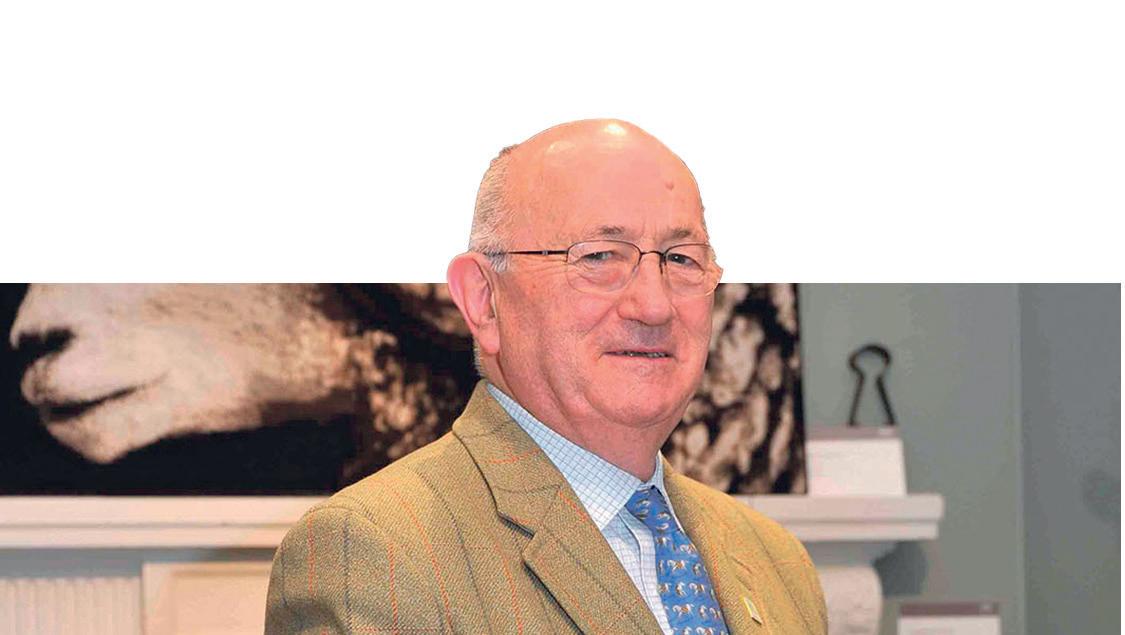


responsibility, it was made clear to me by farmers and others living there that if there was a choice to be removed from their curtilage, they would take that.
Put another way; after working closely with them for four years and seeing how they operate, there is no way that I would want to get involved with them again. I would counsel anyone who has the choice to remain as far outside as possible, and to lobby hard to prevent their further establishment.
Probably the most important reason for being so vitriolic about the National Park establishment in the UK is that their existence introduces another layer of unelected bureaucracy. This tends to act as a dominant stultifying influence on businesses without having any worthwhile investment, and which sadly does not confer any benefits to the area.
To clarify, in statutory terms, National Parks were designated under the 1949 National Parks and Access to the Countryside Act, but their current framework is the Environment Act 1995. Section 61 of this Act sets out the Parks’ two purposes: conservation and enhancement – to conserve and enhance the natural beauty, wildlife and cultural heritage of the National Park; and understanding and enjoyment – to
promote opportunity for the understanding and enjoyment of the qualities (of the Parks) by the public.
These two purposes of the National Park are underpinned by the Sandford Principle, which states that enjoyment of the National Parks ‘shall be in a manner and by such means as will leave their natural beauty unimpaired for the enjoyment of this and future generations’. It also asserts ‘conservation and enhancement’ as the primary purpose with ‘understanding and enjoyment’ taking second place in cases of irreconcilable differences.
Even though these concepts can be contradictory, for all practical purposes they might well be worthy of support.
However, where the concepts become problematic is in the way they are interpreted on the ground. For instance, for 19 years leading up to 2007, various planning applications were approved by elected planning authorities – local councils – and each one was turned down by the National Park authority.


